
INSIDE Fall 2022 Creating a Buzz p. 10 | Out of the Shadows p. 12 | Weathering the Storm p. 20 | Digging Down Deep p. 41 MSU’s Alex Bostic turns creativity into illuminating career p. 44 ARTISTIC SPARK
Weathering the Storm
Bulldog
28 Hands-on Learning
Partnership
School
34 Serving Students
MSU
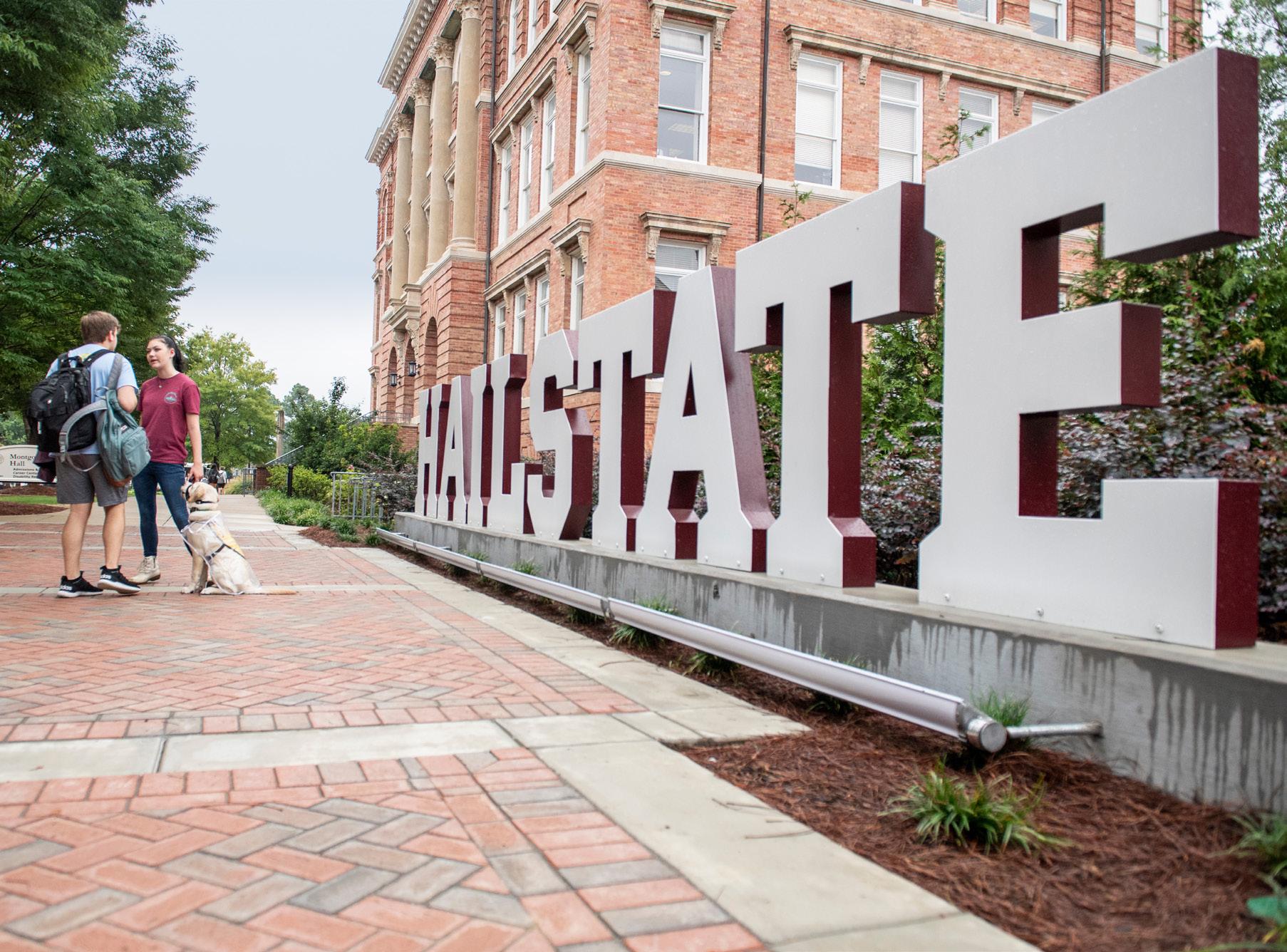
Table of CONTENTS Mississippi State University is an equal opportunity institution. Discrimination in university employment, programs or activities based on race, color, ethnicity, sex, pregnancy, religion, national origin, disability, age, sexual orientation, gender identity, genetic information, status as a U.S. veteran, or any other status protected by applicable law is prohibited. Questions about equal opportunity programs or compliance should be directed to the Office of Civil Rights Compliance, 231 Famous Maroon Band Street, P.O. 6044, Mississippi State, MS 39762, (662) 325-5839. FEATURES 20
meteorology grads serve communities, protect public safety
Middle
prepares future teachers with unique experiences
initiatives, programs build on strengths of state’s largest university A new Hail State installment between Montgomery Hall and Perry Cafeteria serves to welcome visitors and instill pride in Mississippi State students who benefit from numerous new initiatives meant to strengthen their education and prepare them to enter the job market a step ahead of others in their fields. 34
This homage to Norman Rockwell’s “Triple
Self Portrait” features Alex Bostic, an MSU associate professor of art. The right edge of the canvas features samples of Bostic’s art, including “Edmonia Lewis,” a painting of the famed American sculptor that is now the 45th stamp in the U.S. Postal Service’s Black Heritage Series. Bostic’s art is also part of a curated Norman Rockwell Museum exhibition.

Photo by Grace Cockrell
PRESIDENT
Mark E. Keenum, ’83, ’84, ’88
VICE PRESIDENT
DEVELOPMENT
John P. Rush, ’94, ’02
ALUMNI ASSOCIATION EXECUTIVE

Davis
CHIEF COMMUNICATIONS OFFICER
Sid Salter, ’88
EDITORS
Susan Lassetter, ’07
Harriet Laird
WRITERS
Camille Carskadon, ’12
James Carskadon, ’12
Margaret “Meg” Henderson, ’10
Grace Jones
Susan Lassetter, ’07
Ashleigh Lee
Addie Mayfield
Carl Smith, ’10
DESIGNER
Heather Rowe
PHOTOGRAPHERS
Megan Bean
Grace Cockrell
Chad Hathcock
Logan Kirkland
Robby Lozano
Beth Wynn
EDITORIAL OFFICE
P.O. Box 5325
Mississippi State, MS 39762 662.325.0630
slassetter@opa.msstate.edu
ADVERTISING
Leanna Smith 662.325.3360
lsmith@alumni.msstate.edu
Mississippi State University’s Alumnus magazine is published three times a year by the Office of Public Affairs and the Mississippi State University Alumni Association. Send address changes to Alumni Director, P.O. Box AA, Mississippi State, MS 39762-5526. Call 662.325.7000, or email cturner@advservices.msstate.edu.
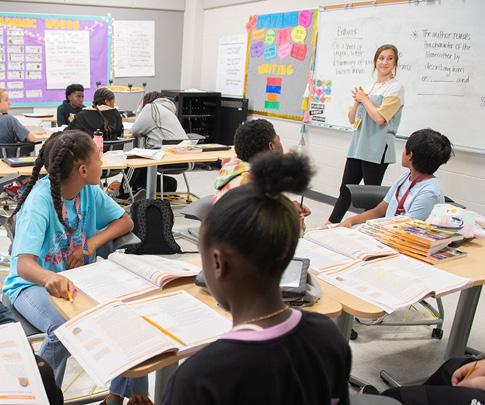
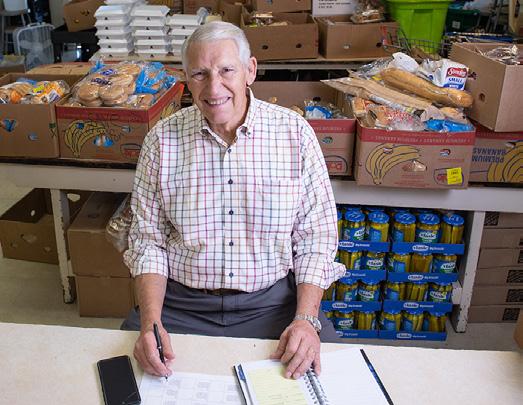
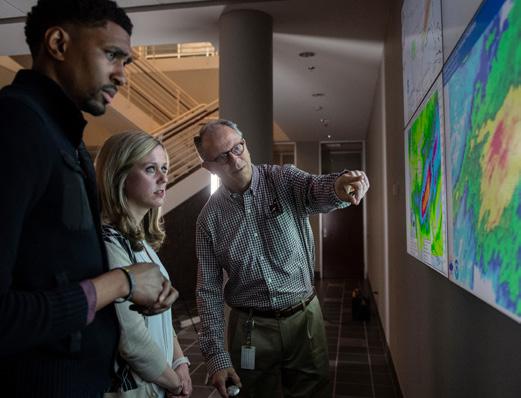
CONNECT TWITTER.COM/MSSTATE FACEBOOK.COM/MSSTATE INSTAGRAM.COM/MSSTATE
FALL 2022 | VOL. 99 | NO. 2
FOR
AND ALUMNI
DIRECTOR Jeff
COVER 75
47 DEPARTMENTS 02 Campus News 08 Discoveries 18 State Snapshot 39 Our People 50 Alumni News 75 Giving Back 80 Class Notes 83 Forever Maroon 86 Back Story 28 53
TIME WELL SPENT
New program lets students earn simultaneous degrees
By Camille Carskadon
Mississippi State prides itself on preparing its students to step into the job market fully prepared. The university’s newest joint degree initiative, the Engineering Leadership Excellence program, is no exception. A collaboration between the Bagley College of Engineering’s Department of Industrial and Systems Engineering and the College of Business,
the program allows students to complete two bachelor’s degrees with only one additional semester of study.
Students who successfully complete the program will graduate with both a Bachelor of Science in Industrial Engineering and a Bachelor of Business Administration, two degrees that often complement each other in the job market.
Brian Smith, undergraduate coordinator and associate professor in the Department of Industrial and Systems Engineering, said the program was developed in response to engineering students’ interest in supplementing their education with business classes.
“Industrial engineers are often positioned to step into management roles early in their careers because
2 FALL 2022 Campus NEWS
they are trained to work with an entire process,” Smith said. “In those management roles, a person needs a certain amount of business sense.”
Kari Babski-Reeves, head of the Department of Industrial and Systems Engineering, added that as part of the Engineering Leadership Excellence curriculum, students will learn and research how to design and improve systems of all types—people, materials, information and equipment. They will also gain a general knowledge of business such as planning, organizing, staffing, directing, controlling and budgeting.

Smith said creating a program that offers two degrees without significantly increasing the number of required courses was tricky. Fortunately, both the industrial engineering and business administration programs share many general education requirements, while other courses were different spins on the same topics.
The dual degree track was carefully designed to protect the quality education offered by both accredited programs. The resulting 143-credit Engineering Leadership Excellence program requires
just 15 more credits than a typical industrial engineering bachelor’s and 23 more than is required for just business administration.
“This program is a natural fit for both populations of students,” Smith said. “We knew there would be demand from industrial engineering students but it’s also a great fit for business students who want to have more opportunities. The two fields naturally complement each other.”
Babski-Reeves echoed Smith, saying that the Engineering Leadership Excellence program helps prepare students for their careers by giving them hands-on experience in both the technical and business sides of industry.
“The ISE curriculum instills in students a systems-thinking perspective to improve process and operations, which extends to overall business operations, the focus of the BBA curriculum. By combining these two paths of study, graduates are well positioned to assume jobs in nearly any work sector,” BabskiReeves said.
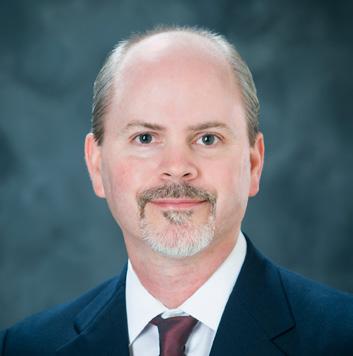
She added that as the competitiveness of the job market continues to increase,
holding dual degrees will set MSU graduates apart, especially if these degrees support each other. In today’s competitive job market, the more tools someone has in their toolbox, the better.
“Upon graduation, our students have gained technical engineering skills, while also developing business acumen that other graduates will not have. Not only will this make them more desirable candidates for jobs but they will also be uniquely positioned to pursue a number of graduate degrees both in engineering and in business,” Babski-Reeves explained. “By also taking advantage of MSU’s Thrive in Five initiative, these students can make significant progress on a graduate degree while also completing both undergraduate degrees, further enhancing their marketability.”
An accelerated degree program, Thrive in Five allows MSU students to earn bachelor’s and master’s degrees concurrently in only five years. This allows them to enter the workforce and start earning sooner.
“The job prospects really are endless with this degree,” she said. n
"This program is a natural fit for both populations of students. We knew there would be demand from industrial engineering students but it’s also a great fit for business students who want to have more opportunities. The two fields naturally complement each other." ~ Brian Smith
ALUMNUS.MSSTATE.EDU 3
"Upon graduation, our students have gained technical engineering skills, while also developing business acumen that other graduates will not have. Not only will this make them more desirable candidates for jobs but they will also be uniquely positioned to pursue a number of graduate degrees both in engineering and in business." ~ Kari Babski-Reeves
MSU STUDENT TEAMS COMPETE NATIONALLY, PROVIDE IMPACTFUL EXPERIENCES
By James Carskadon, Photos by Megan Bean, Robby Lozano and Beth Wynn
Members of MSU’s EcoCAR Mobility Challenge team provide President Mark E. Keenum with a progress report prior to this year’s culmination of the four-year competition sponsored by the U.S. Department of Energy.

Bulldog student-athletes aren’t the only Mississippi State students engaged in intercollegiate competitions. Dozens of student teams from across campus represent the Maroon and White in competitive events across the country.
Like MSU’s NCAA athletes, these students compete at the highest level while learning key life skills like overcoming adversity, teamwork and communication. In addition, these contests supplement students’ academic instruction by tasking them with the same kind of applied projects they will likely see in their careers.
“The learning experiences provided at MSU extend well beyond the classroom,” said MSU Provost and Executive Vice President David Shaw. We have seen students benefit tremendously from getting involved with student teams and competitions, whether they are directly related to their fields of study or not."
Representing a wide variety of disciplines and sparking cross-campus collaboration, these contests include building rockets, preparing bank studies, developing a theater production and implementing landscape designs. There are also Bulldog students designing concrete
canoes, biomedical devices and race cars—all of which is just a sample of the university-sponsored teams active on campus.
COMPETING AT THE FOREFRONT OF AUTOMOTIVE TECHNOLOGY
For Vance Hudson, his first EcoCAR meeting came before his first day of classes at MSU. As an incoming freshman studying mechanical engineering, he said EcoCAR was a major draw.
“I got involved with robotics in high school and eventually realized I was really interested in automotive design,” Hudson said. “EcoCAR provided an opportunity to get involved in that area as a student, and that really drove my decision to come to MSU.”
Hudson would go on to spend six years as part of the EcoCAR team as he completed his bachelor’s and master’s degrees in mechanical engineering. For the recently completed EcoCAR Mobility Challenge, he was the team’s engineering manager for the redesign of a 2019 Chevrolet Blazer.
The EcoCAR Mobility Challenge is the latest in the U.S. Department of Energy’s
4 FALL 2022 Campus NEWS
MSU’s Speech and Debate Council claimed five individual national championships at the International Public Debate Association National Championship and placed second nationally overall out of more than 100 teams.

Advanced Vehicle Technology Competition series, an ongoing program of multi-year design competitions that invites a select group of university teams to retrofit a consumer vehicle to improve safety, energy efficiency and consumer appeal. Mississippi State was first invited to participate in the 2005-08 Challenge X series in which they brought home top honors overall and in several specialty categories. MSU teams also won first place in the subsequent EcoCAR-themed competitions in 2007, 2008, 2010 and 2012.
Hudson said being part of a group working together to solve a problem has been one of his favorite parts of the competition—even when that work meant late nights at MSU’s Center for Advanced Vehicular Systems, which houses the competition car. This team-centric work that mimics how companies design their products did not go unnoticed by employers. This summer he began his career as a hardware engineer with General Motors, which cosponsors the vehicle design competitions.
“We were able to visit pretty much all of GM’s technical facilities in the U.S. during my time on EcoCAR,” said Hudson, who was recognized with an EcoCAR Excellence in Leadership award this year. “I’ve seen what their facilities look like, I’ve gotten to interact
with a lot of their engineers and follow their vehicle design process throughout my time on EcoCAR. I really feel like I’m ready to jump in and hit the ground running.”
The MSU EcoCAR team wrapped up the four-year Mobility Challenge on a high note in March, winning top awards for overall project management, project status presentation and human-machine interface/user experience evaluation, as well as a MathWorks ModelBased Design Award. This year, MSU will begin competition as one of 15 universities in the newest four-year EcoCAR competition, which focuses on electric vehicles.
SPEECH AND DEBATE EXCELS NATIONALLY
The recent resurgence of MSU’s Speech and Debate Council culminated in five individual national titles in the 2022 International Public Debate Association National Championship. The team placed second nationally out of more than 100 teams.
Mia Robertson, a senior political science major from Starkville, earned her seventh individual national debate championship this season. The Truman Scholarship finalist began competing in speech and debate as a junior
in high school to overcome her fear of public speaking. However, Robertson said the style of debate MSU competes in, which focuses on a wide range of topics with minimal time to prepare, has made her a more informed citizen and helped her consider perspectives that differ from her own.
The MSU Speech and Debate Council is made up of students from a wide range of majors and open to individuals with any level of experience in speech and debate.
“You would think the team might be dominated by political science majors or people who want to be lawyers but that’s not the case whatsoever,” Robertson said. “Everyone benefits from having confidence in their public speaking skills and the ability to speak on the fly and think critically about a lot of different topics.”

PUSHING THE BOUNDARIES OF HOME DESIGN
The university’s Solar Decathlon team was one of 23 selected to compete in the U.S. Department of Energy’s Solar Decathlon Build Challenge, a competition that brings together architects, engineers and students from other disciplines to design and build an energy efficient home with a low carbon footprint.
Duane McLemore, assistant professor in the School of Architecture, serves as the Solar
Members of the MSU Bagley College of Engineering’s Energy Club and the interdisciplinary Solar Decathlon team meet to discuss plans as the group advances as a finalist in the U.S. Department of Energy Solar Decathlon Design Challenge.
Decathlon team’s lead faculty adviser, and spent the last year helping students in the design competition phase with a modular home concept they are calling MO+RE House, which stands for modular and resilient. Based on the frequency of tornadoes in Mississippi, the design incorporates increased storm resilience, including a bathroom that doubles as a storm shelter. The modular, prefabricated design also makes the home more accessible to individuals and families that may not be able to construct a new home but want to have a home that is longer-lasting than a conventional mobile home and can grow as the family grows.
McLemore said the competition is a natural extension of the School of Architecture’s strong tradition of hands-on learning through design/build projects. He noted the benefits of architecture, engineering and building construction science students working together on an intensive project, which can mimic what they will experience in their careers.
“The biggest factor in being able to work on such a broad interdisciplinary team is having
to come to a consensus about a design idea, or engineering and structural systems,” McLemore said. “You have to move the project forward as a team, and the students enjoy working on something very significant.”
MSU EQUESTRIAN TEAM RIDES HIGH
Competing in International Collegiate Horse Show Association events in two riding styles–English and Western–MSU’s equestrian teams and individuals set some of the best marks in school history this past year. The English team consistently earned top five placements throughout the season, including MSU’s first ever second and third place finishes in English. The Western team placed either second or third in each of its six competitions. And MSU has a lot to look forward to this season as the university has been selected as one of three host sites for the national semifinals, taking place next March at MSU’s Extension facilities in Verona.
Head coach Ashley Glenn credits the team’s success to the hard work put in by the
Mississippi State’s equestrian team consistently earned top five finishes last season.
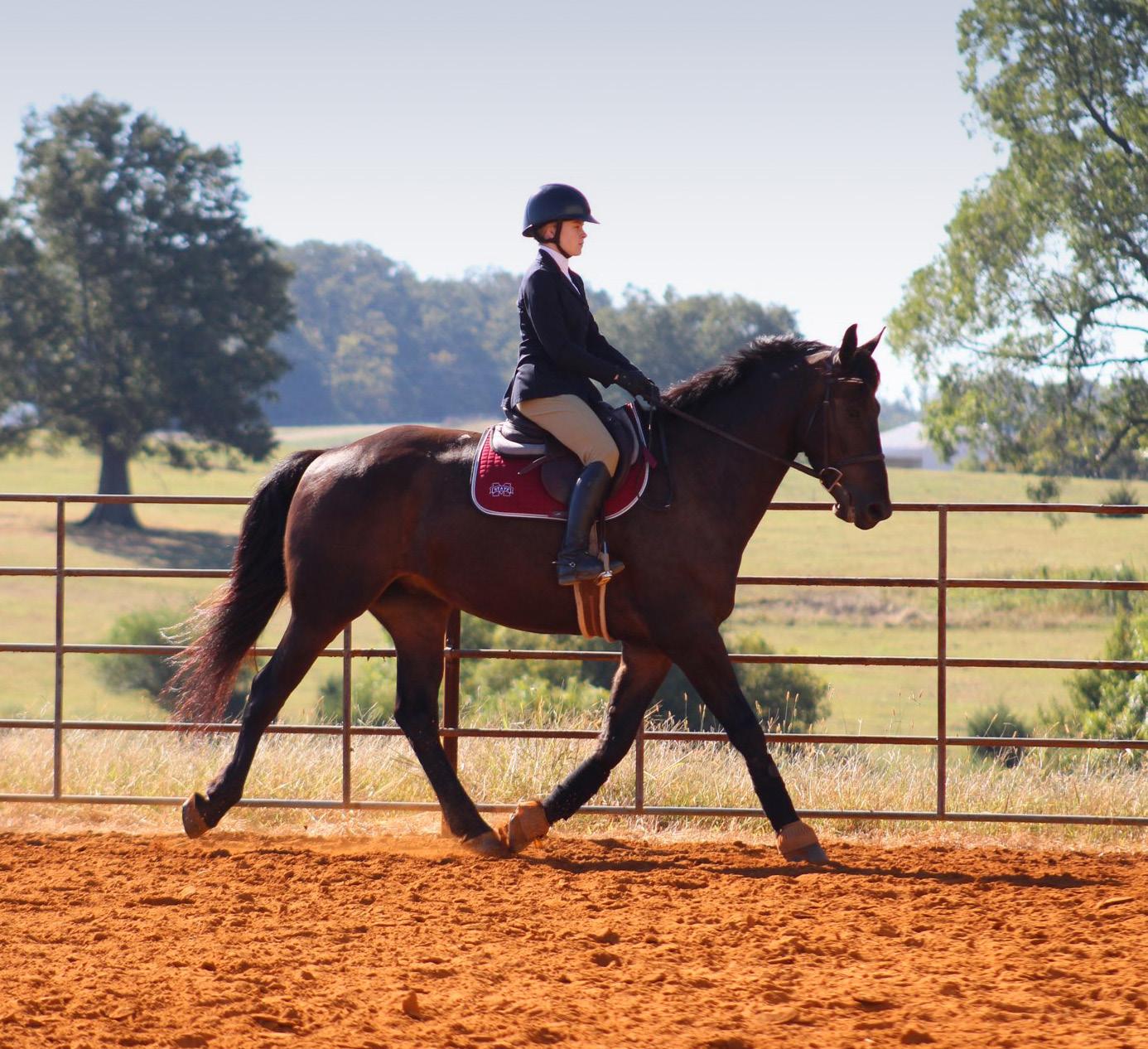
students. In addition to twice-weekly practices at the MSU Equine Unit and workouts at the Sanderson Center, team members take part in fundraising and community service activities. More importantly, she said the team members work to bring out the best in each other, even as many of them grew up riding in competitions where only individual scores counted.
“I love riding, training horses and coaching people, but the most rewarding part is being able to be a positive influence on the students,” said Glenn, who also serves as a facilities supervisor in MSU’s Department of Animal and Dairy Sciences. “They come from all different backgrounds and all different experiences, so it’s really encouraging to see how you can impact somebody positively, whether it’s with their schoolwork or just encouraging them in whatever is going on in their lives. That’s been the best part.”
MORE CHAMPIONSHIPS, LESSONS TO COME
MSU’s student teams are poised to continue their tradition of success as students, faculty and staff support existing teams and form new teams based on student interests and new competitions.
For three years in a row, MSU College of Business students have placed in the top five of the Conference of State Bank Supervisors Community Bank Case Study Competition. A team of computer science students spent part of their summer competing in Hack the Port, a cyber competition on the Gulf Coast that pitted hackers and defenders against each other in a mock port setting. MSU’s team placed third out of 10 teams in the national competition.
Shaw said he expects to see more top finishes for MSU’s teams, and, more importantly, students benefiting from the experience at every step along the way.
“We have some of the brightest students in the country, so it is a lot of fun to see what they accomplish when they work together toward a common goal,” he said. “These students are competing at a very high level and also learning incredibly valuable skills. It’s also a meaningful experience for our faculty sponsors as it allows them to make more connections with students and push students to reconsider the limits of what they can achieve.” n
Campus NEWS
Four Mississippi State students were among only 30 nationwide selected to participate in a training conference for college students entering the meat science industry. The MSU students traveled to Smithfield, Virginia, for the Smithfield Foods INTEGRATE program, where they worked closely with other meat science students to expand their view of industry careers.

Longtime Mississippi State faculty member and administrator Scott T. Willard is the permanent director and dean of the Mississippi Agricultural and Forestry Experiment Station and dean of the university’s College of Agriculture and Life Sciences after serving in these roles on an interim basis since July 2020.

Molly P. Taylor, a senior interior design major from Eads, Tennessee, was one of five semi-finalists in the 2021 national Steelcase Student Design Competition, NEXT. Her project, “NEXT: Self-Expressive Skincare,” was selected through an anonymous judging process out of 995 entries representing 67 interior design programs from across the nation.
Anne Marshall, associate professor in the MSU Department of History, has been named executive director of the Ulysses S. Grant Association and the U.S. Grant Presidential Library.
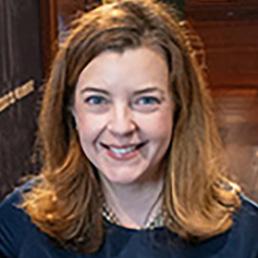
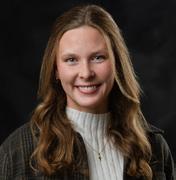
Bimal Balakrishnan is Mississippi State’s new associate dean of research for the College of Architecture, Art and Design. Before beginning his new role at the state’s leading university this semester, Balakrishnan served since 2018 as chair of architectural studies at the University of Missouri, where he taught for 10 years and was the founding director of the Immersive Visualization Lab.

MSU faculty members Christopher Hunter, assistant professor in the School of Architecture, and Rachel Welborn, associate director of the Southern Rural Development Center, were honored with Diversity and Inclusion Awards by the Mississippi Institutions of Higher Learning. They were selected for their work advancing diversity, understanding and respect within higher education.
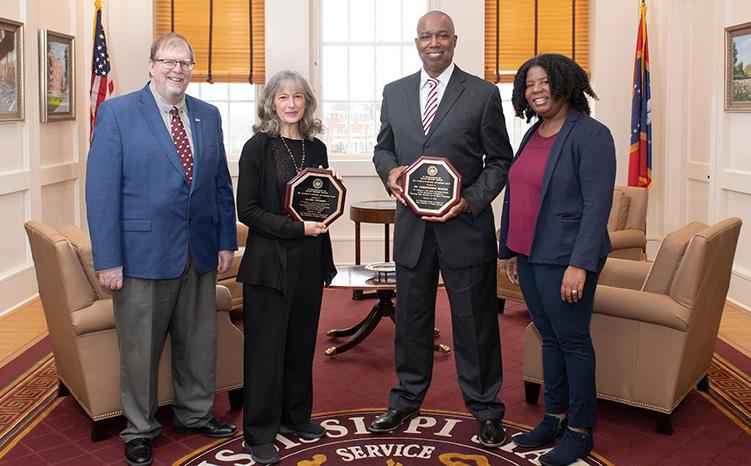
Randa Bassou, a doctoral student with a concentration in aerospace engineering, was chosen as one of 30 students nationwide for the Matthew Isakowitz Fellowship, a summer internship and executive mentorship program for those interested in the commercial spaceflight industry.

Dr. Katrina Poe now heads Mississippi State’s Longest Student Health Center. Board certified by the American Academy of Family Physicians, Poe joined MSU in 2018 as a staff physician before moving into the executive director role. She previously was a physician with Greenwood Leflore Hospital’s Kilmichael Clinic and was chief of staff at Kilmichael Hospital.
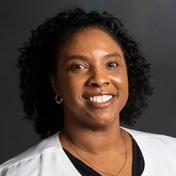
Mississippi State has earned a grant from Amazon to support diversity in the university’s Department of Computer Science and Engineering. The grant will help promote undergraduate diversity in cyber security through The Amazon Cyber Security Scholarship and the Amazon Security Support Fund.
Mississippi State University is once again being recognized nationally as a top 10 university for support of the veteran community. VIQTORY, formerly Victory Media, awarded MSU the distinction in its recently released Military Friendly Schools rankings for 2022-2023, marking the third consecutive year MSU has earned the designation.
For the fourth consecutive year, Mississippi State’s chapter of the Society of American Foresters is being recognized as the top student group in the nation. Student chapter excellence is based on partnership with natural resource organizations, public relations outreach, community involvement and service to the organization, its members and their university. In addition to receiving the Outstanding Student Chapter consecutively since 2018, Mississippi State’s SAF chapter also received the same honor in 2016 and has placed in the top three consistently for the last 25 years.
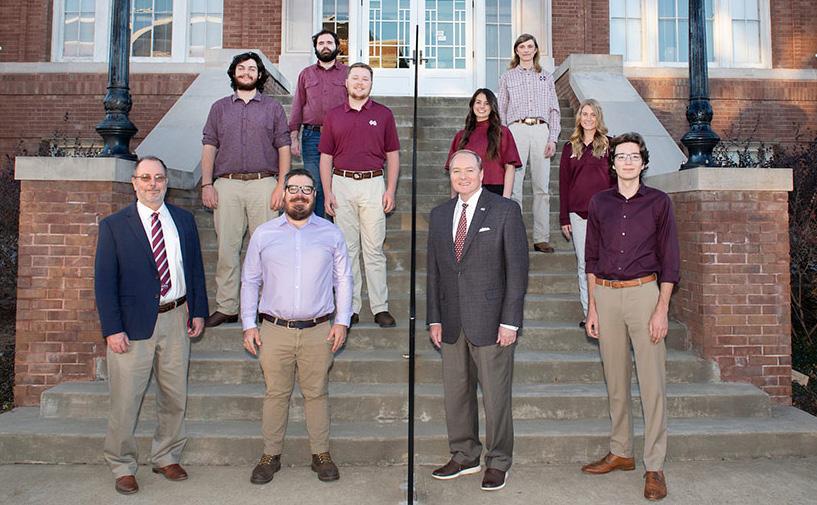
Mississippi State has been identified as the top “Best Value College” once again for providing students with the most value of any university in the state by SmartAsset, a New York-based financial technology company.
The National Academy of Inventors is announcing its newest chapter at Mississippi State University. A non-profit organization created to support aspiring inventors in academics, NAI has 4,000 members in more than 250 institutions around the world. Founded in 2010, the NAI educates and mentors innovative students and enhances the visibility of academic technology and innovation.
ALUMNUS.MSSTATE.EDU 7
MSU RESEARCHERS COMBINE ENGINEERING, SOCIAL SCIENCES IN EFFORT TO MITIGATE CASCADING HAZARDS IN DISADVANTAGED COMMUNITIES
By James Carskadon
Since 2014, Lake County, California, has been classified under “extreme” or “exceptional” drought conditions in approximately half of the weekly reports compiled by the U.S. Drought Monitor. The lack of rainfall itself has impacts in agriculture, industry and for individual citizens. However, the problems can quickly expand well beyond a lack of water.

The drought conditions increase the chances of fire, which have resulted in approximately 60% of the northern California county burning since 2016 as the dry land provides more fuel for wildfires to burn. After the summer fire season, the area is more prone to debris flows and flooding, as there are fewer plants and trees absorbing rainwater. This is what Farshid Vahedifard, an endowed professor in the Richard A. Rula School of Civil and Environmental Engineering, calls “cascading hazards,”— natural hazards and extreme weather events that tend to come one after the other because of the nature of their impacts.
Research has shown that the impacts from these occurrences are not distributed evenly, Vahedifard said. Individuals and communities at social or economic disadvantages are more likely to face strong impacts from a natural hazard, potentially turning it into a human disaster. For example, housing built in a region’s most flood-prone areas is more likely to be occupied by low-income residents. Or, if someone’s property is un- or underinsured because they cannot afford coverage, a disaster will be more difficult to recover from financially.

“As a civil engineer, naturally, my focus has been on structures and buildings,”
Vahedifard said. “At some point I realized that no matter how strong your buildings and infrastructure are, there is a strong human dimension here that cannot be excluded.”
With $1.7 million in grant funding, MSU is leading an interdisciplinary team of engineers and social scientists in looking at ways to better prepare disadvantaged communities for the dangers of cascading hazards. The funding is from the U.S. Department of Agriculture’s National Institute of Food and Agriculture through the Cyber-Physical Systems program, a joint program with the National Science Foundation’s Smart and Connected Communities initiative, which emphasizes integrating intelligent technologies with natural and manmade environments to improve social, economic and environmental well-being.
Vahedifard is leading the project as principal investigator, with Mississippi State’s Alireza Ermagun, an assistant professor in civil and environmental engineering, and Diego Thompson, an assistant professor of sociology, also taking on leadership roles. The research team also includes personnel from the University of California Irvine, Oregon State University, University of Illinois Urbana-Champaign and the University of Colorado Boulder.
Although the current project focuses on one county in California due to its specific environmental and social trends, the researchers say the science and new technologies developed from the project will be applicable to communities across the country.
“As a civil engineer, naturally, my focus has been on structures and buildings. At some point I realized that no matter how strong your buildings and infrastructure are, there is a strong human dimension here that cannot be excluded.”
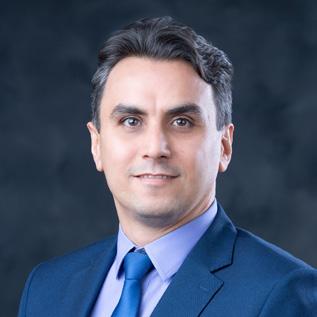 ~ Farshid Vahedifard
~ Farshid Vahedifard
8 FALL 2022
Discoveries
“We are piloting the project in Lake County because we thought it was a very good representative of a county with a large percentage of historically underserved or vulnerable communities,” Vahedifard said. “But the methodology is scalable and transferable to other areas. We can adopt and apply the same concept here in Mississippi or other states with social and economic issues. It’s not just one area or one location. The main thing is to fill the gaps in the science and then develop the tools based on that science.”
The team is working closely with community partners and emergency planning authorities in Lake County to identify specific vulnerable groups and needs that arise during natural hazards and extreme weather events for both authorities and the broader community.
“An important element of this project is listening to the community members who have been exposed to natural hazards and understanding their needs,” Ermagun said. “We are collecting two waves of longitudinal data and conducting focus groups on emergency managers who battle wildfires, as well as community members who are frequently exposed to wildfire and its aftermath. We intend to use our analysis to create practical tools for emergency managers to facilitate communication with communities, reducing their vulnerability.”
Working in collaboration with local authorities and community members, the research team is developing multilingual emergency alert systems to improve communication in emergencies. Team members are also conducting research to better understand the correlations between different types of
disasters, which will help communities be more aware of potential dangers. For example, if there is a wildfire in one community, they can calculate the risks of debris flow in surrounding communities.

Thompson said the interdisciplinary nature of the research team is one of its main strengths. Much of his work as a sociologist focuses on inequalities, specifically on the differing impacts of environmental issues. He noted that disadvantaged or vulnerable groups vary in their demographics, but some of the characteristics they are looking at in this study are low-income residents who are not English speakers, as well as people with disabilities. Those groups may have challenges when it comes to receiving, reading or reacting to emergency alerts in situations such as wildfires.
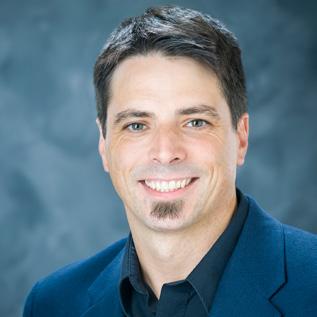
“Sometimes people think of communities as demographically homogeneous with the same needs, but that’s not the case anywhere in the world,” Thompson said. “There are always groups that have special needs and are therefore more at risk from environmental challenges.”
Vahedifard said the project looks to advance environmental justice by identifying vulnerable communities and allocating resources that better serve their needs, to help to equalize the impacts of natural hazards and extreme weather events.
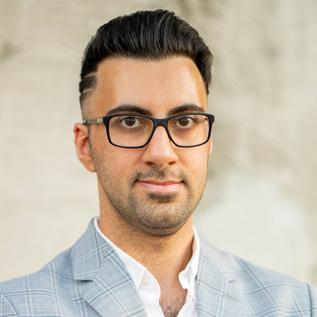
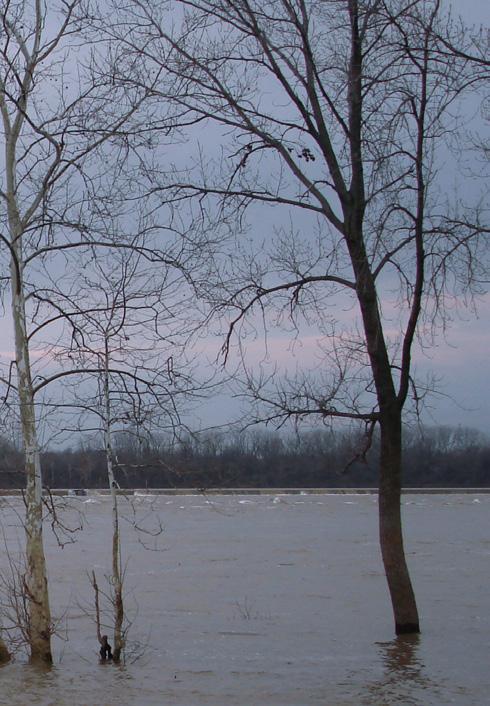
“We think this is one of the pioneering projects in this area because of the way we are integrating different disciplines,” Vahedifard said. “We are developing strong fundamental knowledge about these natural hazards and extreme weather events and how communities respond to fill in gaps in the science. At the same time, we are turning that research into practical tools.” n
“Sometimes people think of communities as demographically homogeneous with the same needs, but that’s not the case anywhere in the world. There are always groups that have special needs and are therefore more at risk from environmental challenges.”
ALUMNUS.MSSTATE.EDU 9
"An important element of this project is listening to the community members who have been exposed to natural hazards and understanding their needs."
~ Alireza Ermagun
~ Diego Thompson
CREATING A BUZZ ABOUT BEE NUTRITION
MSU scientists collect pollen to help pollinators
By Meg Henderson, Photos by Grace Cockrell and Robby Lozano
As flowers bloom in Mississippi, bees emerge to feast on their nectar and pollen. However, little is known about the nutrition pollinators actually receive from these plants. A Mississippi State scientist is hoping to change that.
Priyadarshini Chakrabarti Basu, assistant professor in the College of Agriculture and Life Sciences, is building a pollen database to catalog the nutrition profiles of over 100 bee-pollinated North American plants. Her work, in partnership with principal investigator Ramesh Sagili and other collaborators from Oregon State University, is funded by a $500,000 grant from the USDA Agriculture and Food Research Initiative.

“Bee nutrition is a critical part of a thriving agricultural industry,” Basu explained. “When bees are in a state of stress, they need extra nutrition to complete the arduous task of collecting pollen.”
In the fall of 2021, the team of scientists, including MSU entomology master’s student
Lauren Jennings, began collecting pollen throughout the U.S. and Canada. The team also recruited more than 40 citizen scientists from both countries to help with collection.
The idea for building the database came, in part, from Basu’s interest in the pollination of California’s almond groves. Approximately 30 billion bees are shipped to the Golden State over the course of a few weeks in January and February to pollinate enough flowers to create 700 billion almonds.
“When the migratory beehives are transported to almond groves in California each year, the bees are still overwintering,” Basu explained. “They’re forced out of the hibernating phase into the brood-rearing phase, which can be stressful. For this reason, they need to be well fed when they arrive at the almond orchards.”
Because the bees arrive for work in a stressed state, they need extra energy for the task at hand. Planting nutritionally optimal supplemental forage near the almond flowers is key to ensuring the bees’ preparedness to pollinate the crop.
10 FALL 2022 Campus NEWS
“The idea is to have other nutritious forages available before and after the almonds bloom,” said Basu, who is also a scientist with the Mississippi Agricultural and Forestry Experiment Station. “This helps the bees stay healthy and strong because they have access to nutritious pollen and nectar when they arrive and before they are prepped to move to the next crop.”
Basu explained that all plants are not equal in terms of the quality of nutrients they provide for bees, just as, for instance, a salad and French fries do not have equal nutritional value for humans. The main goal of the database is to inform interested parties not only which plants attract bees but also the nutritional profile of the plants.
She and her team are working with commercial growers and beekeepers, as well as homeowners, to create well-informed habitats for bees that work with the natural landscape.
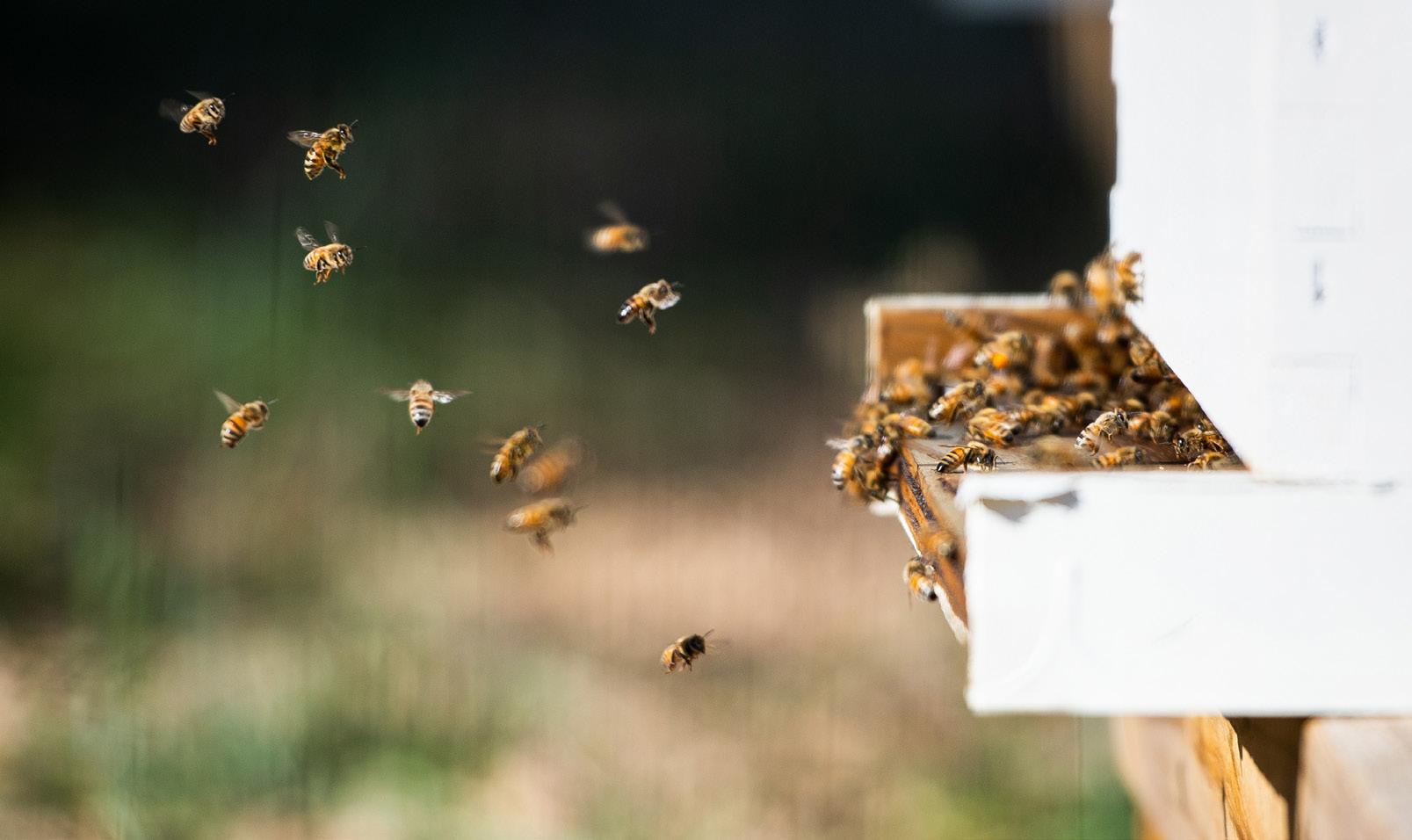
“As humans, we need good nutrition to be healthy. It’s the same with bees,” Basu explained.
“Optimal nutrition is their first line of defense.”
Basu and her colleagues have also partnered with the Natural Resources Conservation Service, which plans to make the database available on its website.
is focused on 100 plants in North America, but it could potentially grow to include other bee-pollinated plants and different regions of the world.
“Putting together this database is a huge task, and even though we have a three-year deadline, I see this as a lifelong project,” she said.
In addition to building the database, Basu and her team are meeting with scientists and other interested parties to share their work in progress. She said she also hopes to work with residents to create a database specific to Mississippi.
The team is still accepting applications from interested citizen scientists who wish to contribute.
While the database will offer significant scope and insight into the nutritional quality of plants for honeybees and native bees, Basu said that it will not be an exhaustive list. The database, she explained,
“We still don’t understand everything about how bees affect the fine balance of the ecosystem,” Basu said. “They help pollinate the flora in the natural landscape and maintain biodiversity. Think of the other animals, birds and insects dependent on these plants and their fruits and seeds. Providing this extra support to bees will support all of us in the long run.”
ALUMNUS.MSSTATE.EDU 11
n
A new, 768-square-foot apiary at Mississippi State University will be the site of beekeeping classes, as well as research involving the pollinators. The apiary is a joint endeavor of the MSU Extension Service and Mississippi Agricultural and Forestry Experiment Station.
“Bee nutrition is a critical part of a thriving agricultural industry.”
~ Priyadarshini
Chakrabarti Basu

FALL 2022 Discoveries
OUT OF THE SHADOWS
Suicide prevention grants help shine light on mental health care
By Susan Lassetter, Portraits by Megan Bean
Growing up, Michael Nadorff sensed a riff in his family—a disconnect between the woman he called grandma and his own mother and her siblings. He wouldn’t learn why until he was in high school.
It turns out, the woman who gave birth to his mother did not succumb to cancer as he had been led to believe. Instead, she died by suicide in the 1970s, before Nadorff was even born. And the woman he knew as grandma? She had been his grandfather’s mistress.
“It caused ripples in my family,” Nadorff explained. “Here my mother and her sisters had to teach their children to call this woman grandma. It was hard for them.
“Suicide wasn’t something that was talked about, but I wanted to know why,” he continued. “What drove her to feel so hopeless that there was just no other way? When I started studying psychology, I thought I’d find the answers. Clearly this had to be the biggest thing we studied. Then I found out there aren’t a lot of people who study suicide, and I thought, ‘If not me, someone who has this personal connection to it, then who?’”
Now an associate professor and director of the clinical psychology Ph.D. program at Mississippi State University, Nadorff has dedicated himself to the study of suicide.

“There’s so much stigma with suicide, so you don’t hear about it that often,” Nadorff said.

“People don’t realize there are more deaths by suicide in a year than motor vehicle deaths.”
In fact, in 2020, there were more suicides in the U.S. than drownings, homicides and fire-related deaths combined. At 47,979, suicide rated as the 12th leading cause of death overall and third among those under the age of 24. Data shows that the rate of suicide increased every year from 2010-19, including a 45% increase for those aged 15-24. “It’s not talked about much,” Nadorff said. “But if these were cancer numbers, it would be on the news every night.”
Researchers at Mississippi State want to help curb that rising rate of death by suicide. While Nadorff
"When I started studying psychology, I thought I’d find the answers. Clearly this had to be the biggest thing we studied. Then I found out there aren’t a lot of people who study suicide.”~ Michal Nadorff
says it is difficult to study suicide treatment because it requires a large sample population, he notes that it is possible to address access to mental health care.
On average, the United States has 33.9 psychologists for every 1,000 people. In Mississippi, that rate is 12 per 1,000. That is a gap Nadorff and his fellow scientists believe they can help fill.
“We started asking, ‘How do you get treatments to the people who need them,’” Nadorff said. “And then we started writing grant applications.”
Currently, Nadorff has two, multi-year grants focused on addressing suicidality, including one with co-principal investigator Emily Stafford, an assistant clinical professor and director of the MSU Psychology Clinic.
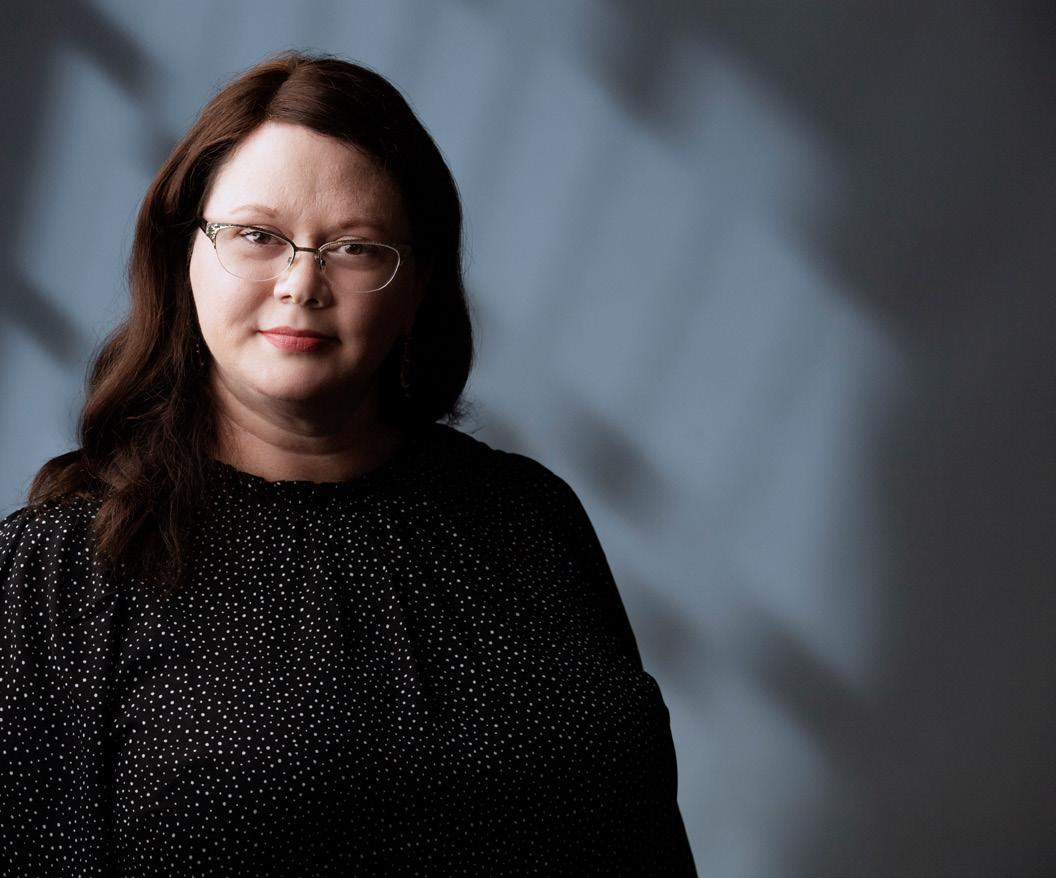

Administered by the Substance Abuse and Mental Health Services Administration, these grants focus on extending the mental health network in Mississippi to prevent and respond to youth suicide in the state. The goal of the grants is to train 5,000 people per year in suicide prevention and 1,000 per year in postvention—support for individuals and organizations after the suicide of someone close. “We’ve developed training to help individuals identify those in distress and get them to the appropriate resources,” Stafford explained. “And this training is provided for free to any person or organization that would like to learn. By the end of the grant, that will be 25,000 people in the state who are trained in effective suicide prevention and 5,000 trained in postvention.”
Nadorff said the training provided by Mississippi State differs from traditional prevention education by focusing on building a rapport with individuals rather than simply asking “Are you suicidal,” to better recognize when they are in distress.
“Traditional training is called QPR—question, persuade, refer—which has people start by asking about suicide,” Nadorff explained. “What we’ve found is that people don’t want to ask about suicide as if saying the word was going to cause it to happen, which is a myth."
He stressed that, in reality, if you are at the point where you think you should ask if someone is suicidal, it doesn’t matter what their answer is. “Yes” or “no,” he said, it’s time to refer them to mental health services.
14 FALL 2022 Discoveries
“Our training employs a fivestep process that helps the trainee make a connection, evaluate the situation and provide the correct resources.” ~ Emily Stafford
~ Ashley Pate
“If they’re not going to use the skills because they are scared of asking a question that doesn’t matter anyway, it’s time to change the approach,” Stafford added. “Our training employs a five-step process that helps the trainee make a connection, evaluate the situation and provide the correct resources.”
Teachers, law enforcement and youth organizations are the primary targets for the training administered through these grants, and while the focus is largely youth suicide, the researchers say it is scalable to any age group.
Ashley Pate, a 2019 master's graduate and current doctoral student in applied psychology, said that while prevention training doesn’t directly correct the imbalance between the number of people in emotional distress and clinicians available to mental health care, it still helps lessen the strain on the system by directing people to available resources.
“Sometimes a person’s situation can be improved without seeing a doctor, which is important when most mental health care providers in the state have waiting lists for appointments,” explained Pate, whose work focuses on college campus suicide prevention. “Sometimes, helping them secure shelter or food or find answers to the problems that are weighing on them, is enough to improve their mental state.”
She added, “Sometimes, just helping people feel seen; building a relationship where they feel heard, can make all the difference in someone’s life.” n
TIPS FOR ASSESSING MENTAL HEALTH EMERGENCIES
Suspecting someone close to you is having suicidal thoughts can be scary but Emily Stafford, director of Mississippi State’s Psychology Clinic, said it is not a reason to panic. She offers the following tips for assessing the situation and determining the proper course of action.
• If you notice someone having a tough time, start a casual conversation. Begin small and build on the connection. Small talk can have a big impact on helping someone feel connected.

• Listen without judging or immediately offering advice. Sometimes a person just wants to talk but doesn’t expect answers. When they’re done sharing, ask if they would like information about resources.
• Follow-up a few days after the conversation. It shows the person you’re invested in their well-being.
• Be familiar with the resources of your community.
The Mississippi Department of Mental Health lists affordable resources from across the state at www.dmh.ms.gov/serviceoptions/community-services.
The Substance Abuse and Mental Health Services Administration also provides resources at www.samhsa.gov
The nationwide Suicide and Crisis Lifeline is available 24 hours a day by calling 988

Ashley Pate, a psychology doctoral candidate who works at the clinic, added that it is also important to remain calm.
“Hearing someone mention suicide for the first time can be scary,” Pate said. “Take a couple of deep breaths before you react because panic doesn’t help the situation.”
She added that you don’t have to be the person in crisis to call a hotline or seek help. Trained mental health specialists can help walk you through helping another person and getting them to the resources they need.
ALUMNUS.MSSTATE.EDU 15
“Sometimes a person’s situation can be improved without seeing a doctor, which is important when most mental health care providers in the state have waiting lists for appointments."
The International Academy of Wood Science honored Mississippi State’s Rubin Shmulsky with the designation of fellow, recognizing his significant scientific achievements and research contributions to the field. Newly elected for 2022, the Warren S. Thompson Professor of Wood Science and Technology and head of MSU’s Department of Sustainable Bioproducts joins 145 IAWS Fellows throughout the U.S., in addition to international honorees who hold this distinction.
Mississippi State’s Jan Chambers, a William L. Giles Distinguished Professor in the College of Veterinary Medicine, was selected as part of the 2021 class of fellows for the American Association for the Advancement of Science, one of the most distinct honors within the scientific community. At MSU, Chambers leads the Center for Environmental Health Sciences within the College of Veterinary Medicine. She has been the principal investigator of more than $30 million in federally funded competitive grants in the field of toxicology.
Keith Coble, vice president of Mississippi State’s Division of Agriculture, Forestry and Veterinary Medicine, has been named a fellow by the international Agricultural and Applied Economics Association. The William L. Giles Distinguished Professor, one of only six fellows selected for 2022, considers the accolade a shared honor.
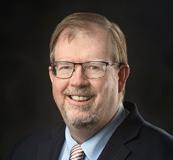
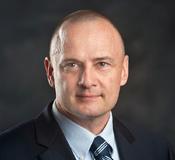
Kathy M. Sherman-Morris, a veteran Mississippi State professor of geosciences, is the new president of the National Weather Association, a nationwide professional association supporting and promoting “excellence in operational meteorology” since 1975. Her duties as president of the NWA board of directors is a one-year term through this December. She served as 2021 president-elect and will continue on the board of directors as past president in 2023.
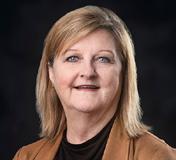

Amanda Patrick, an assistant professor of chemistry, is one of 24 selected for the 2022 class of Cottrell Scholars of the Research Corporation for Science Advancement. Each awardee receives $100,000 and is selected through a rigorous peer review process.
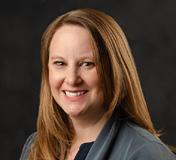

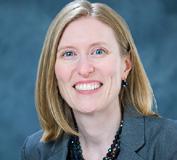
Tara E. Sutton, an assistant professor in sociology, was selected for the New Scholar Award from the American Society of Criminology’s Division on Women and Crime. She is being recognized for her comprehensive career in the field of criminology and her research into trauma as a predictor of crime. The award honors the achievements of scholars who show outstanding merit early in their careers.
Paul Tseng, an associate professor in plant and soil sciences, is the recipient of the 2022 Outstanding Early Career Weed Scientist Award from the Weed Science Society of America.

Mississippi State’s Interior Design program is receiving a grant from the Nuckolls Fund for Lighting Education. Assistant Professor Robin Carroll is principal investigator for the $30,000 grant that will broaden the outreach for the lighting design minor and be offered as part of the Master of Fine Arts in Historic Preservation curriculum.
MSU College of Business leaders celebrate the opening of the Market Innovation Lab and Observatory (MILO) with a ribbon-cutting. The lab places students and faculty members at the leading edge of biometric marketing and human behavior research. The new lab contains 12 computer stations fully outfitted for eye tracking, facial recognition and the collection of biometric data, allowing researchers to conduct in-depth studies of how individuals react to different media and situations. L-R: Mike Breazeale, associate professor of marketing and MILO director; Kathy St. John, MSU alumna and project supporter; and Robert Moore, professor of marketing and Hunter Henry Fellow.
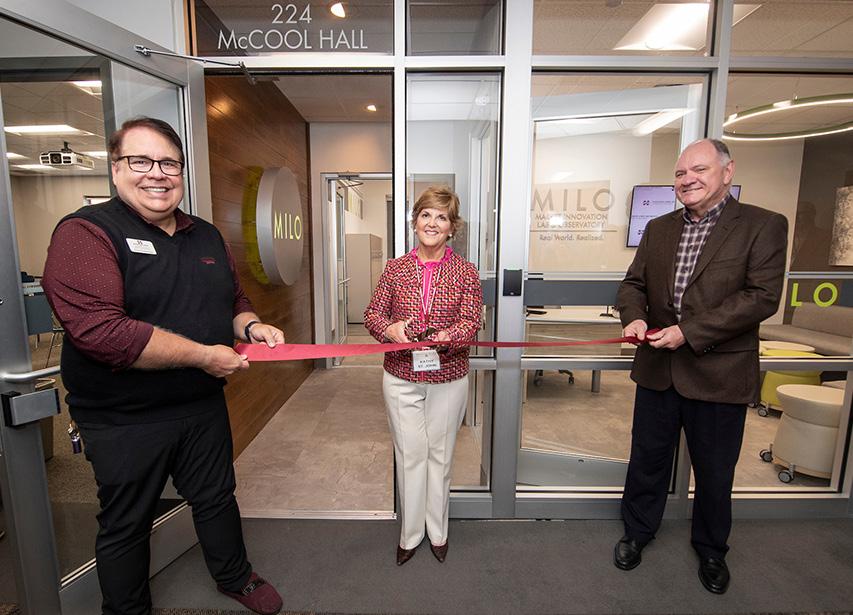
Mississippi State University is among 84 institutions across the country selected to join a new Academic Engagement Network facilitated by the U.S. Cyber Command, known as CYBERCOM. As a member of the network, MSU will join other universities in supporting CYBERCOM efforts in areas such as future workforce, applied cyber research, applied analytics and other strategic issues. A joint command center of the U.S. Department of Defense, CYBERCOM’s mission is to direct, synchronize and coordinate cyberspace planning, working in collaboration with domestic and international partners to defend and advance national interests.
The Mississippi State University Extension Service has been awarded $5 million to directly impact early-childhood education in the state by developing a new curriculum for children from birth through age 5. The funds awarded by the Mississippi Department of Human Services will be used to develop “My Mississippi Adventures,” a developmentally appropriate, integrated curriculum to be used in licensed child care facilities. It will focus on people, places and things indigenous to Mississippi.
Mississippi State University has been awarded $1.49 million by the Appalachian Regional Commission to infuse virtual reality career exploration and job training into the education-to-workforce pipeline in Clay, Kemper, Lowndes, Noxubee and Oktibbeha counties. This award is part of a recently announced $21 million package supporting 21 projects serving 211 coal-impacted counties through ARC’s Partnerships for Opportunity and Workforce and Economic Revitalization (POWER) Initiative.
16 FALL 2022 Discoveries
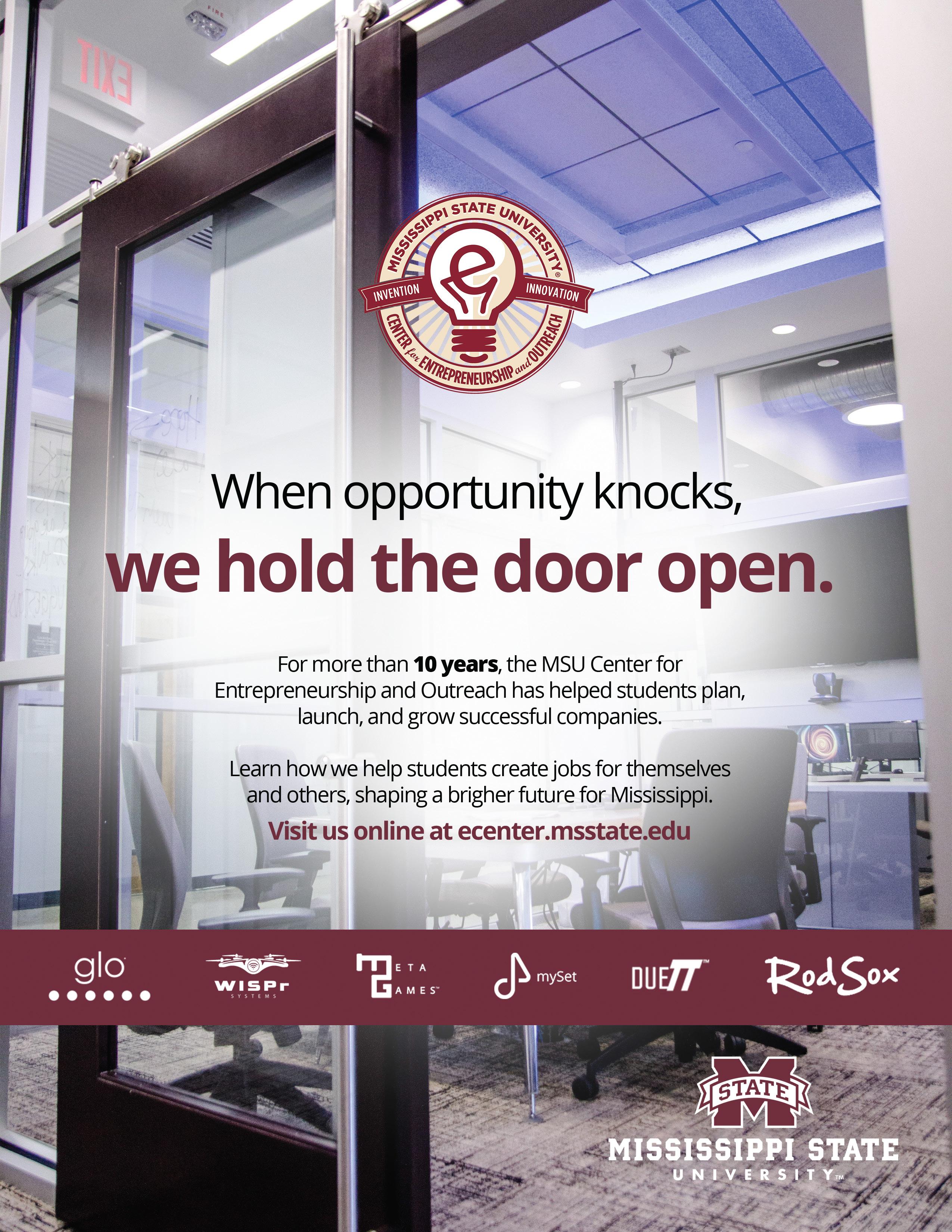
WRAPPED IN STARKVILLE SKIES: A beautiful sunset on the eve of the 2022 football season gave way to actionpacked weekends as the Bulldogs kicked off a slate of seven home games with a 49-23 win over the University of Memphis.

State SNAPSHOT
Photo by Grace Cockrell

Weathering the Storm
Bulldog meteorology grads serve communities, protect public safety
By Susan Lassetter, Photos by Grace Cockrell and Submitted
The night of Dec. 10, 2021, viewers of Paducah, Kentucky’s WPSD watched as the televised map of their area quickly filled with the deep reds and vibrant oranges that indicate severe weather. From the studio, standing in front of the green screen, chief meteorologist Trent Okerson warned it would be a “violent night.”
“I used verbiage I had never used,” Okerson recalled. “I knew hundreds of people’s lives were going to be changed in a manner of minutes. It was a helpless feeling, but at that point you can’t do anything. You just have to hope people have taken action and pray for the best.”
Okerson first began warning his audience—both over the air and online—that a storm was coming three days before it hit Kentucky. During that time, he also began reviewing tornado safety in his broadcasts: create a safe space in an interior, windowless room on the lowest level of a structure; have helmets and sturdy shoes at the ready; charge all devices; and make sure weather radios are operational.
Still, on the day of the event, he wondered if he had done enough to protect the community he has served for 15 years.
“The day before, I had spoken to a group of sixth graders in Mayfield,” Okerson said. “All I’m thinking as this storm is coming in is ‘What’s going to happen to these kids?’ I’m on TV watching this mile-wide tornado come into town and all I can see in my head are the faces of these kids. It’s two weeks before Christmas. What’s going to happen to them?
“It was heartbreaking knowing what was coming,” he continued. “There were a couple of times I was choking back tears on-air. I guess the adrenaline takes over. You have a job to do, and you just do it. After it was over and we wrapped up the coverage, I took the microphone off and let it all out.”
The next morning Okerson texted his news director: “I can’t stop crying this morning. I hope we did enough last night,” he wrote. “That was the worst night of my career.”

In all, Okerson was on-air delivering live, severe weather coverage for more than five hours straight, all the while battling a fever. Later, his dayslong warnings and advice on storm preparedness, along with his play-by-play live coverage and tracking of the storm, were credited with saving countless lives across the viewing area.
“Nights like that really drive home the mission that we have, the mission to save lives,” Okerson said.
20 FALL 2022
Paducha, Kentucky, meteorologist Trent Okerson stayed on-air for five hours the night of Dec. 10, 2021, providing upto-the-minute updates as a mile-wide tornado came through the area.
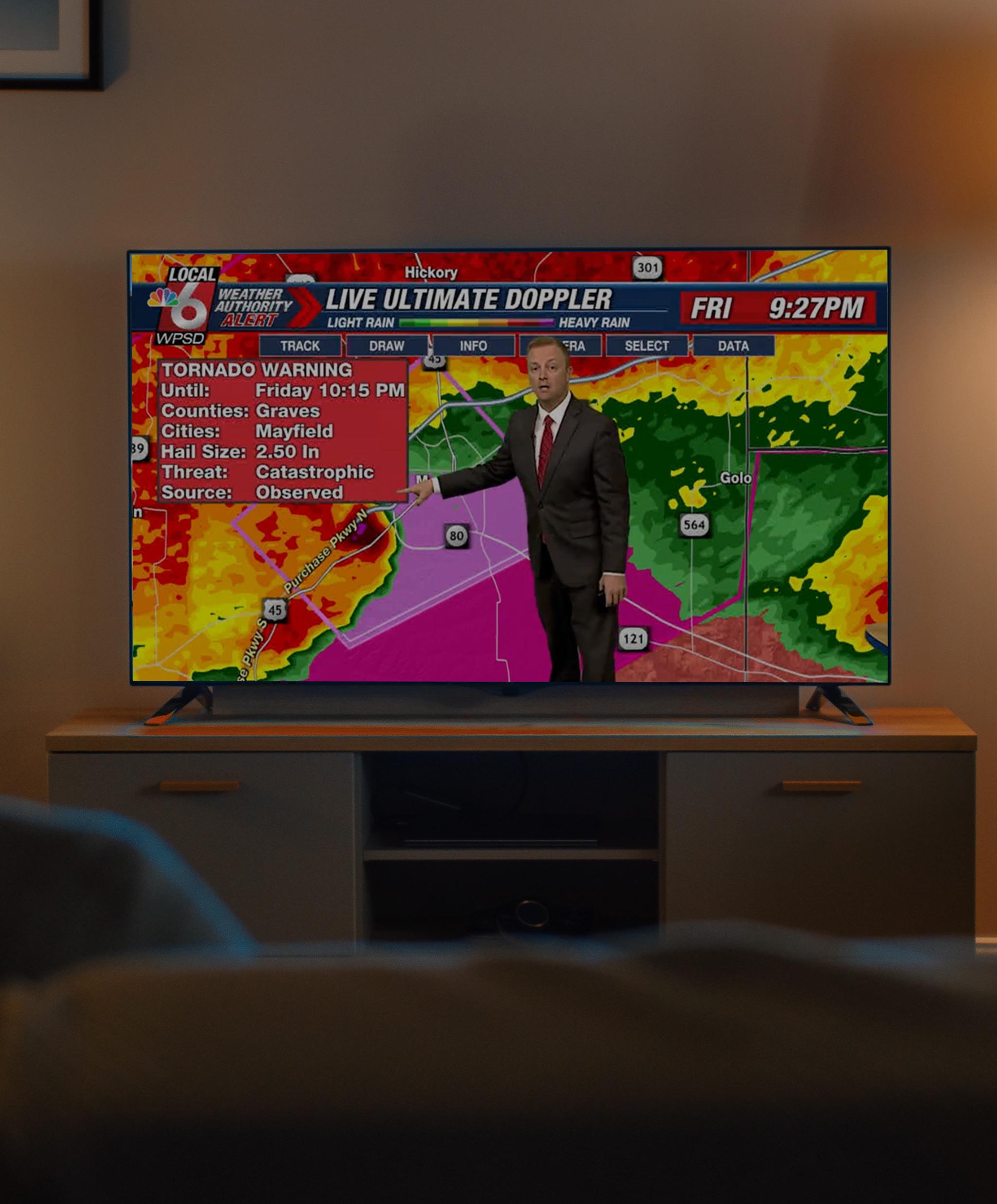
Voices of authority
Okerson explained that broadcast meteorologists serve multiple roles within their communities. Above all, he says they are there to help people protect life and property by providing accurate forecasts and severe weather alerts. However, there is also a secondary role: being a voice for science.
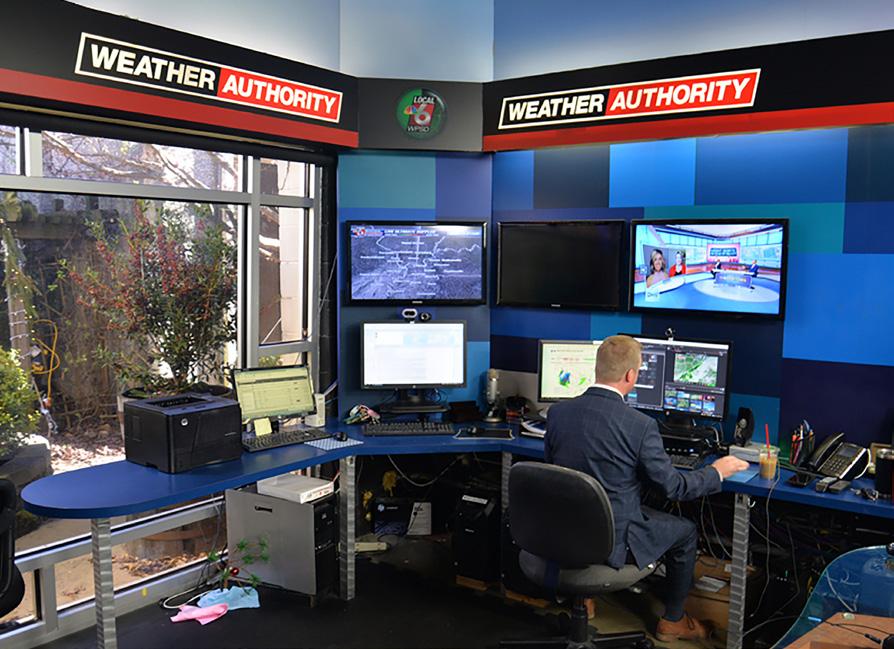
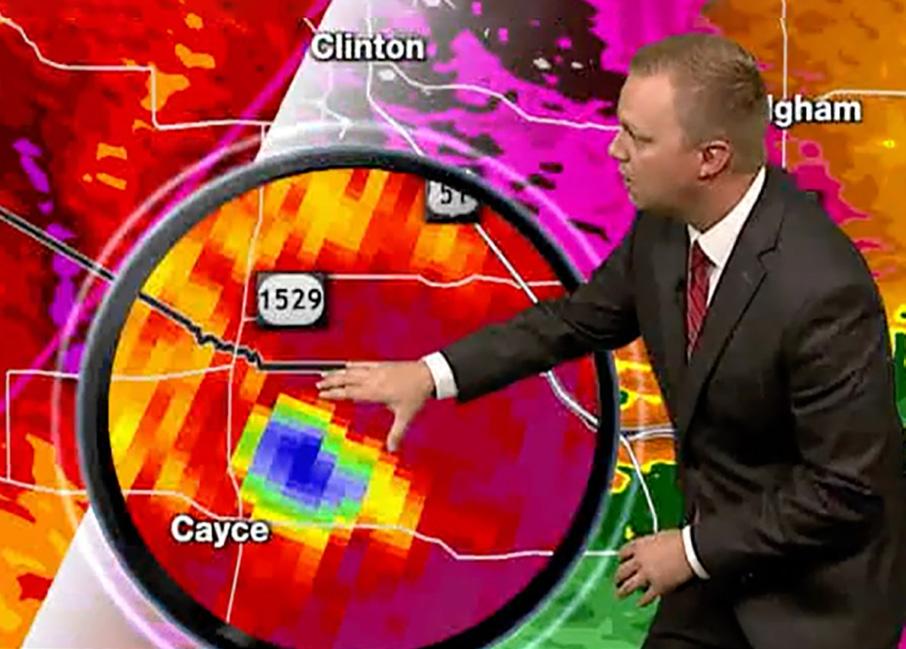
“We have to be able to take what can sometimes be complicated science and make it easy to understand for the general public,” he explained. “People are going to look to us for answers so it’s important to be well versed. And it’s very important for us to earn the trust of the people that are watching so they have confidence in what we’re telling them.”
A native of Metropolis, Illinois, just across the Ohio River from Kentucky, Okerson is no stranger to explaining technical concepts to audiences. He spent five years as a high school science teacher until a meeting with a local meteorologist reignited his love for weather. Soon after, he enrolled in Mississippi State’s broadcast meteorology program, which he completed in 2008.
Okerson said those Mississippi State courses gave him the necessary
understanding of weather science to speak with authority about the atmospheric conditions that affect people’s lives and livelihoods.
“It’s great to be a good television personality; it’s part of the job. But the difference between being a likable figure and an actual scientist is the
Sciences, students take both technical and performance-based courses. The former teach the theoretical concepts and applied science that meteorologists use to create forecasts and predict weather conditions. The latter, which include broadcasting classes tailored to on-air weather delivery, help
knowledge of how and why things happen,” Okerson explained. “When there’s a life-threatening situation, the audience needs to know the person delivering the information knows what they’re talking about. And in the heat of the moment, you’ve got to be able to deliver that information with confidence.”
Mike Brown, a meteorology professor, said MSU’s tag-team approach to meteorological instruction helps students build confidence on both the scientific and communication fronts. Through the Department of Geosciences in the College of Arts and
students develop the skills needed to communicate with the public.
“In everything we do, we’re looking at how the knowledge can be applied to real-world, real-life weather scenarios,” said Brown, who also serves as the state climatologist for Mississippi. “How is this weather going to affect people? How do we help weather audiences understand what’s happening? We always want our students thinking about those things.”
Lindsey Poe said helping audiences understand starts with being a relatable speaker. As coordinator of MSU’s broadcast meteorology
22 FALL 2022
Okerson, who completed State's meteorology program in 2008, said his MSU classes provided the scientific background and training necessary to be an effective broadcast meteorologist.
"In everything we do, we’re looking at how the knowledge can be applied to real-world, real-life weather scenarios. How is this weather going to affect people? How do we help weather audiences understand what’s happening? We always want our students thinking about those things.” ~ Mike Brown
concentration, she spends a lot of time teaching students to break out of the presenter mindset and instead be as natural speaking on camera as they would talking to someone at the dinner table.
“Our students know the science and how to use the different tools available to meteorologists, but you can’t go on TV and talk about the correlation coefficient. Nobody knows what that means,” Poe explained. “Instead, we talk about seeing debris on the radar.”
She said using layman’s terms and avoiding technical jargon also helps build trust with the audience by making it easier for a viewer to follow along.
“It really is like telling a story,” Poe said. “They have to use their hands, tell jokes and make the information relatable, while still being clear and concise in their delivery. It can be
hard for a young meteorologist, especially during live storm coverage.
“That’s why it’s important to build a relationship with the audience,” she continued. “Let them know you’re just a person doing your best in a complex and ever-changing situation. And more importantly, let them know you’re part of their community. That’s essentially the most valuable tool for success in their day-to-day job.”
While various apps and websites offer hourly weather predictions, Poe said none of them are equal to a local forecast prepared and delivered by a local meteorologist who knows the needs and complexities of a community.
“Meteorologists are public servants,” Poe said. “They’re passionate about protecting people and that’s what you need when it comes to communicating dangers to the public and spurring them to take action.”
Living weather-ready
The idea behind forecasts, watches and warnings is to allow people to plan and take the necessary precautions for whatever weather they may face. But as the National Weather Service learned in 2011, advance knowledge of what’s coming means nothing if the public does not hear or heed the warnings.
The organization realized it had a communication problem in April 2011 when a two-day tornado outbreak across the Southeast, including Mississippi and Alabama, resulted in the loss of more than 300 lives. The forecasts were accurate and delivered with what was deemed plenty of time for people to take action, but the advanced warnings did not spark the desired response.
Lindsey Poe, coordinator of MSU’s broadcast meteorology concentration, said teaching students how to be natural on camera and good science communicators helps them better connect with audiences when they’re delivering forecasts or storm warnings.
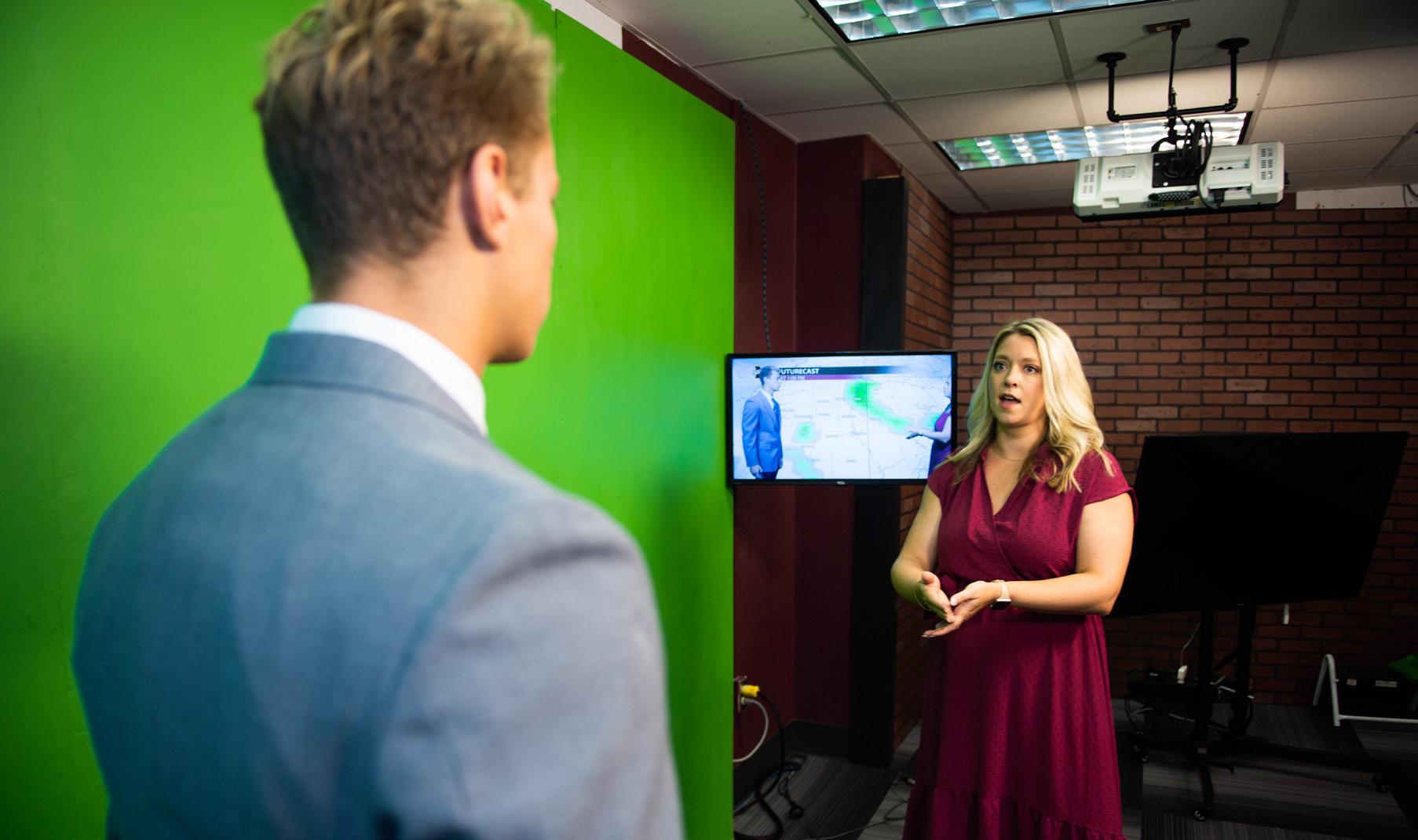
ALUMNUS.MSSTATE.EDU 23
Since that deadly storm outbreak, the NWS has taken steps through its “weather-ready nation” initiative to make communities across the country better prepared for and more resilient to extreme weather events. Part of that includes simplifying the way it delivers forecasts.
“There’s been a real push to look at what we put out and ask, ‘Is this helpful? Is it too much information? Are we using the correct language and causing people to act how we want them to act?’” explained Michael Hill, a lead forecaster for the NWS in Memphis, Tennessee. “Basically, we want the simplest way to say, ‘Here’s what we know, this is what to expect, and this is what you need to do.’ You’ll start noticing certain things sounding or looking different over the next few years.”
A spring 2009 MSU graduate with a focus in broadcast meteorology, Hill joined the NWS later that year through an office in Maine, or “practically in Canada,” he says. There, he gained experience predicting extreme winter weather,
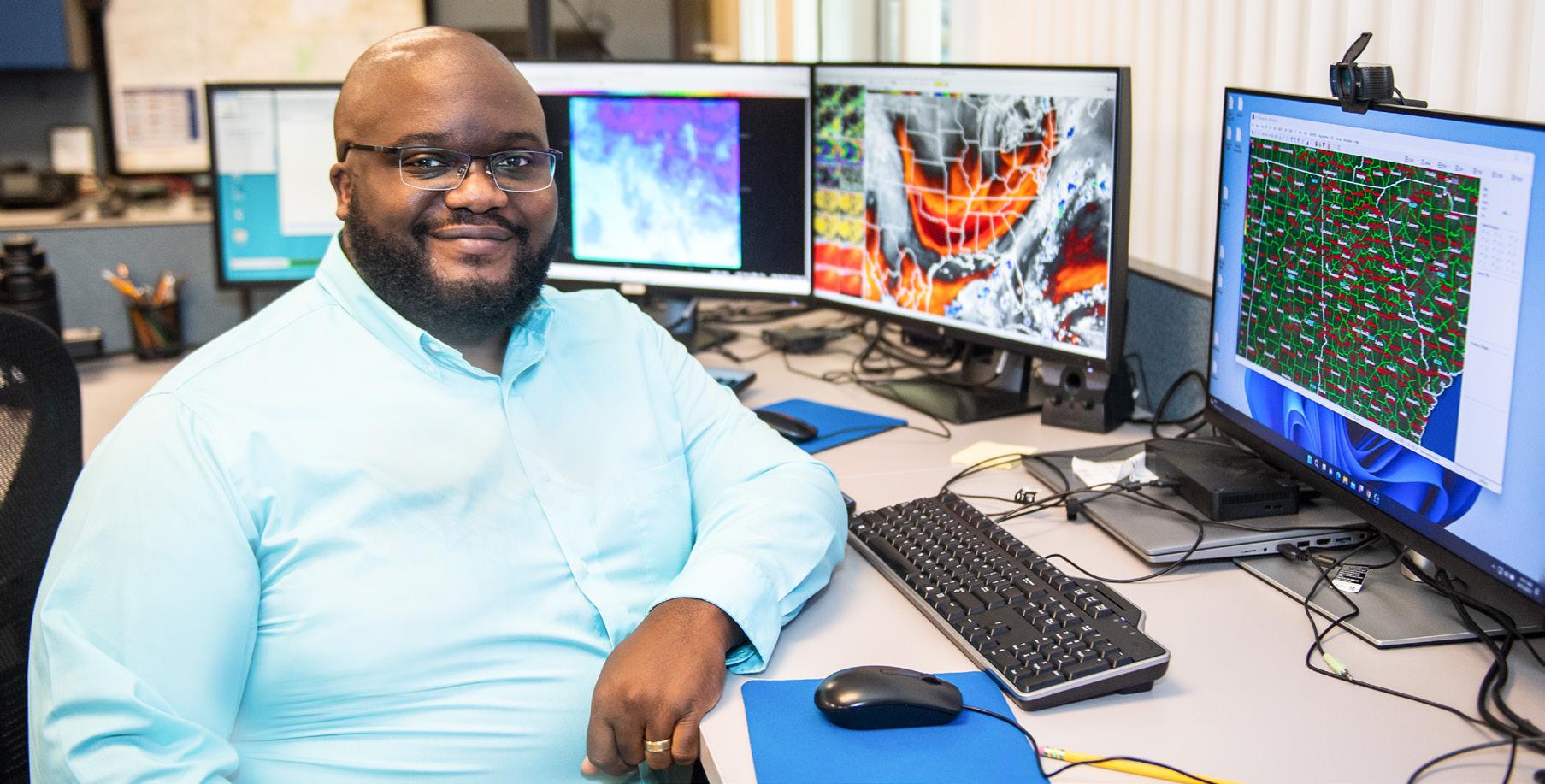
including blizzards and doubledigit negative temperatures—things he never experienced in his native Alabama. He then transferred to New Orleans, Louisiana, where he forecast hurricanes, severe flooding and large thunderstorms before moving to his current position in Tennessee.
Through the Memphis office, he covers parts of four states—eastern Arkansas, west Tennessee, the Missouri boot heel and north Mississippi.
“We cover a pretty large area,” Hill said, noting that they forecast everything from ice storms and flooding to drought and tornadoes.
As a lead forecaster for the NWS, he manages the overall predictions, as well as quality control for all information released during his shift. Hill said he takes the responsibility seriously, knowing that his office is responsible for issuing all inclement weather warnings for the area, in addition to providing data to inform regional meteorologists’ forecasts.
“You’re not going to find a group of people more dedicated to their craft,” Hill said. “We’re in the business
of predicting the future based on a chaotic atmosphere that’s always changing. At the end of the day, it’s a difficult task, but we’re doing this because we genuinely care and want you to be warned if dangerous weather is coming your way.”
‘Respect the polygon’
In an effort to more effectively communicate warnings, the National Weather Service transitioned from a county-by-county warning structure to a “polygon” system in the mid-2000s. These customizable shapes allow the weather service to more narrowly tailor its warning areas, which not only helps people see specifically when their location will be affected but also helps eliminate warning fatigue—a state of disengagement when viewers have been on alert for so long that they eventually stop paying attention.
“Before, you might have had a whole county receiving storm warnings when really only a sliver of the area
24 FALL 2022
As a lead forecaster with the National Weather Service, Michael Hill helps issue the severe-weather watches and warnings meant to keep people safe.
was affected,” Hill explained. “Now we have people hand-drawing these polygons to only include what we know will be hit. We generate the text and set the duration for the warning. It then gets distributed to all emergency alert systems in that area, including TV stations where broadcast meteorologists interpret those warnings for their viewers.”
When it comes to alerting audiences to dangerous weather, James Spann leads the pack. With a rallying cry of “respect the polygon,” he has been central Alabama’s weather authority for nearly three decades.
Hill said he remembers being entranced watching Spann’s energetic and informed delivery of weather forecasts. When the legendary broadcaster visited his school, Hill said he was inspired to pursue his own meteorological career.
“As a child I really looked up to him,” Hill said. “Being a kid in Tuscaloosa, watching James Spann do his thing, I wanted to be part of it somehow. He’s one of the best and he helps a lot of people. That’s what I wanted to do. I wanted to help people, but I wanted to be the one issuing the warnings.”
Now, while Hill is living his dream with the NWS, Spann is still
practicing his craft for ABC 33/40 in Birmingham, Alabama.
A native of Greenville, Alabama, about an hour south of Montgomery, Spann said he had always been fascinated by the fickle nature of weather, but it wasn’t until college
in Dallas, Texas. Still, despite his success out west, Alabama was home for him and his wife.
“I’m thankful I got to work in a market that size, but we wanted to come home. And that’s when I decided to get serious about my
“As a child I really looked up to him. Being a kid in Tuscaloosa, watching James Spann do his thing, I wanted to be part of it somehow. He’s one of the best and he helps a lot of people. That’s what I wanted to do. I wanted to help people, but I wanted to be the one issuing the warnings.” ~ Michael Hill
that he learned one could study weather as a career.
“I actually majored in electrical engineering, which I enjoyed, but I learned along the way that you could do weather for a living,” Spann recalled. “I worked at a radio station in the ‘70s, then a little TV station offered to pay me like $1.90 an hour to do the weather and I thought, ‘Wow!’ So, I started doing it and never stopped.”
In his early career, Spann moved around Alabama from Tuscaloosa to Montgomery to Birmingham before joining a top 10 television market
weather career,” Spann said. “I didn’t want to be an entertainer or a TV personality. I wanted to be a meteorologist.”
Spann’s decision to pursue further education coincided with Mississippi State’s launch of a meteorology distance-learning program in the early 1980s.
“It was perfect timing,” Spann said. “What they did for me was life changing.”
Spann completed Mississippi State’s broadcast meteorology program in 1992. Since that time, he has earned a litany of honors
MSU alumnus now leading National Weather Service
Kenneth Graham, who earned a master’s degree from MSU’s Department of Geosciences in 1994, is now leading the National Weather Service.
The National Oceanic and Atmospheric Administration announced his appointment as NOAA assistant administrator and 17th director of the National Weather Service in June. Since 2018, Graham has served as director of the National Hurricane Center.

“What an incredible honor it is to serve alongside the heroes of the National Weather Service whose excellence shines through day after day,” said Graham in NOAA’s announcement. “We’ll accomplish great things
together by building on recent progress and prioritizing support of our forecasters. I can’t wait to get started.”
With field offices throughout the country, NOAA’s National Weather Service “provides weather, water and climate data, forecasts, warnings, and impact-based decision support services for the protection of life and property and enhancement of the national economy.”
From 2008-2018, Graham served as the meteorologist-in-charge in the New Orleans/ Baton Rouge office of the National Weather Service. His career with NOAA began in 1994, after working as a broadcast meteorologist at WCBI-TV in Columbus from 1992-94.
ALUMNUS.MSSTATE.EDU 25
including multiple Emmy awards and being named Broadcaster of the Year by the National Weather Association. He became the 33rd person in the country to earn the American Meteorological Society’s distinction as
meteorologists which is important because what we do is hard.
“You have to know the science, you have to know the geography, and you have to know the people and the culture to be successful in sharing
weather,” Spann said from his car, returning from an assembly with the students of the Gardendale Christian Academy. “If you tell someone there’s a tornado 14 miles southwest of Clanton, no one knows where that is. But if you say it’s near James’ Pit Barbecue, everybody knows that.
“So you get this knowledge of the state in your head, and it’s basically useless knowledge until the weather gets dangerous or you’re hungry,” he continued. “But those landmarks are important and it’s the best way to help people understand.”
a Certified Broadcast Meteorologist. But more importantly, he has earned the trust and respect of hundreds of thousands of viewers both in central Alabama and online.
“When I was starting out, TV weather people mostly had no formal training, they were just attractive people,” Spann said. “Now, it’s morphed to where you’ve got real scientists in the position of TV
your message because, quite frankly, your success in that could determine whether people live or die,” he continued.
Spann keeps in touch with his viewing area through frequent road trips to speaking engagements across the state.
“I’ve been driving these roads for 43 years and that knowledge and geography is crucial during severe
Consciously and unconsciously, Spann has other tools to connect and communicate with his audience. He often speaks of the “state bird,” otherwise known as trampolines uprooted by strong winds. Then there are occasional more colorful expressions involving cows, rocks and flapping underwear—sayings he attributes to his “south Alabama roots” that come out when he’s trying to make an important point.
However, as the saying goes, actions speak louder than words and
TIPS FOR BEING PREPARED DURING EXTREME WEATHERSHELTER IN A STORM
In the event of severe weather, preparation and awareness can make the difference in life and death. The National Weather Service offers three simple steps for surviving a tornado:
• GET IN – If not already indoors, get as far into the middle of the nearest, sturdiest building as possible.
• GET DOWN – Underground shelters are best, but if none are available, go to the lowest possible floor.
• COVER UP – Flying and falling debris are the No. 1 killer during storms. Helmets, blankets, pillows or even a mattress can offer protection.
If setting up a safe place in advance, remember to have food, water, shoes and any necessary medication for everyone who
will be sharing the space. Toys or games to keep children entertained can help them remain calm in stressful storm situations. It is also important to have access to weather reports. Make sure all devices— phones, tablets, radios—are charged in case of power outages. However, hearing the reports is only helpful if people understand what they’re being told.
In the case of severe thunderstorms and tornadoes, the most common form of extreme weather in the Southeast, the scale of concern ranges from severe thunderstorm watch and warning to tornado watch and warning.
Watches mean conditions are favorable for developing a problem—a storm is possible. Warnings mean the problem—the storm— has arrived.
26 FALL 2022
"Some people got me excited about science when I was a kid, which is what led to what I’m doing today. I think the least I can do is return the favor. Some of the most brilliant atmospheric scientists in the world have come from Mississippi and Alabama because of the diversity of weather that we have." ~ James Spann
unbeknownst to Spann, his wardrobe choices have sparked much speculation among audiences and inspired more than one internet meme.
Astute viewers noticed a pattern. Spann in a jacket and tie means all is well in Alabama, but as he begins to adjust his attire—from no jacket to rolled sleeves to loose tie—the weather situation is getting more dire. The memes joke that if he is ever on-air without his shirt, “may God have mercy on your soul.”
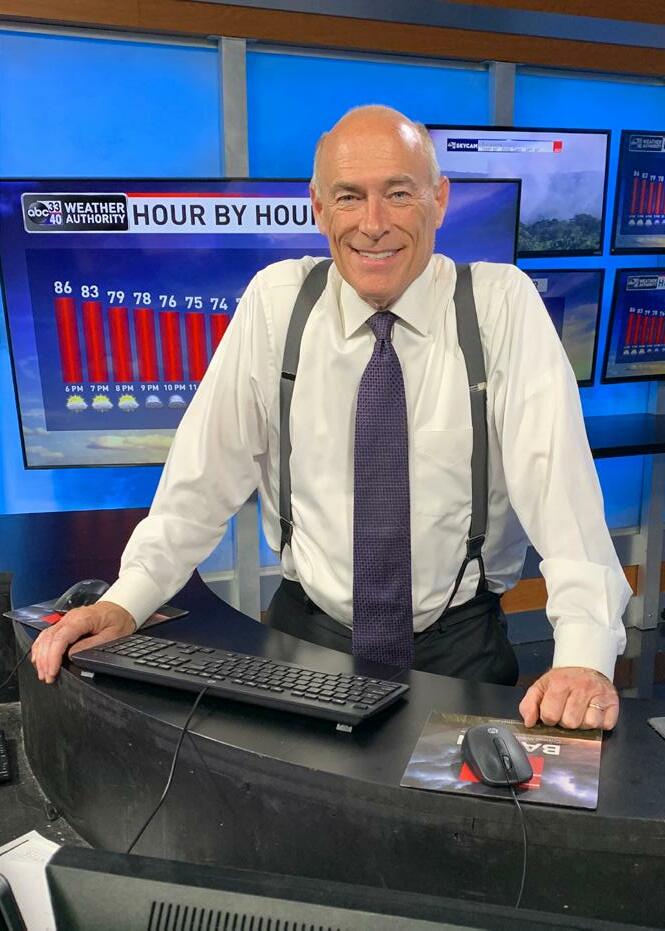
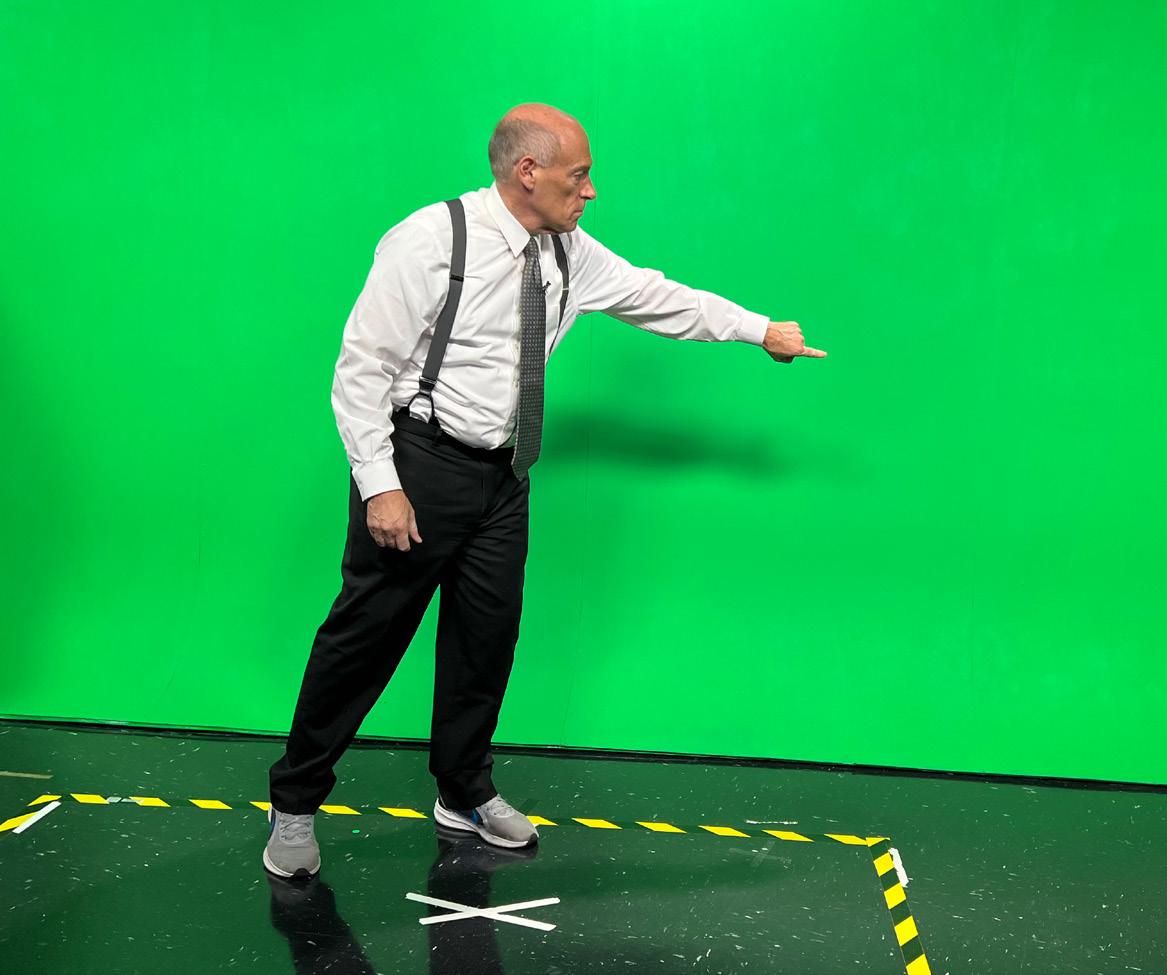
“It’s a good joke, but the social scientist told me people really do pay attention to how I’m dressed and get concerned when I take off my coat, so now I have to be very aware,” Spann said with a laugh. “In reality it just means that it gets hot under those studio lights the longer I’m on covering a storm.”
Like many meteorologists, Spann stays on the air as long as there is a danger to his viewers. He was live that day in April 2011, delivering warnings up to 45 minutes in advance of the storm, pleading with people to pay
attention and seek shelter. And he was on the ground in the following days reporting on the damage and, unfortunately, the deaths.
More recently, in March 2021, he was live on television when he had to deliver a tornado warning to his own street where his wife was at home.
“That was hard,” Spann said. “But tornadoes happen to real people and real places in real time. It’s not always someone else it’s happening to, and that was our day. My wife got the warning and was able to take shelter, but it was scary because you just don’t know.
“When you’re on during tornado coverage, it’s like you’re in a battle,” he continued. “You can’t abandon your battle station. As long as she was OK, I was going to keep going.”
Still, Spann knows he won’t be doing the weather forever. While he has no plans of stopping anytime soon, he is invigorated by the excitement he sees at the schools he visits both in person and through virtual classrooms across the country.
“Some people got me excited about science when I was a kid, which is what led to what I’m doing today. I think the least I can do is return the favor,” Spann said. “Some of the most brilliant atmospheric scientists in the world have come from Mississippi and Alabama because of the diversity of weather that we have.
“So many kids are deeply, deeply curious and if I can get them excited and teach them some of the basics, it might start them on a path where they end up doing this for a living one day,” Spann continued. “I can’t tell you how many kids I’ve visited that are now doing this as a career and quite frankly, probably 90% of them went to school at Mississippi State because that’s where you go if you want to do weather on television.
“I owe my career to Mississippi State because they gave me the credibility I needed and the knowledge that I needed to be successful,” Spann said. “It opened the door to what’s been a remarkable career doing what I love.” n
ALUMNUS.MSSTATE.EDU 27
As central Alabama’s weather authority for nearly three decades, James Spann has earned the respect and trust of his audience and has hundreds of thousands of fans across the country.
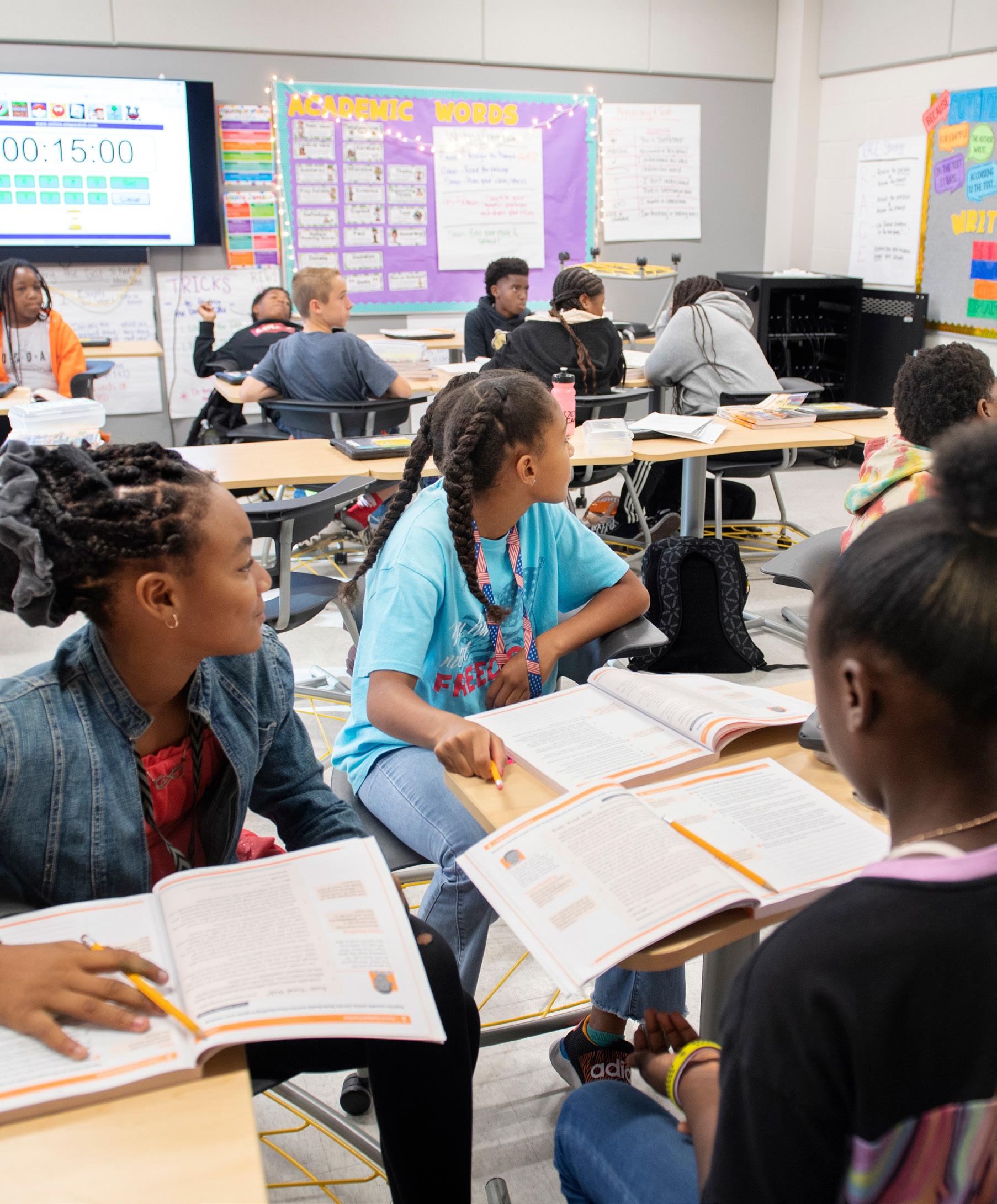
MSU College of Education alumna Lauren Shumaker stands in front of her students at Partnership Middle School. The school serves as not only a state-of-the-art learning environment for all sixth-and seventh-grade children in Oktibbeha County, it is also an immersive experience for MSU student interns allowing them to participate in all aspects of middle school teaching. Shumaker was among the first Bulldogs to intern at the new facility.
Hands-on Learning
Partnership Middle School prepares future teachers with unique experiences
 By Carl Smith, Photos by Megan Bean
By Carl Smith, Photos by Megan Bean
Lauren Shumaker was ready for her first day as a teacher. The 2021 graduate departed Mississippi State University with a bachelor’s degree in secondary education, an understanding of crucial concepts that will guide her instruction for years to come and a passion to better her home state through education.
She also left with something few graduates have: first-hand experience teaching in the same building where she would start her career.
Shumaker is one of many MSU College of Education students who have—and will—intern at Partnership Middle School, a collaborative learning environment serving both the university and the Starkville Oktibbeha School District. Located on the northern part of MSU’s campus, the school first opened for the 2020-21 academic year. The only school of its kind in Mississippi, PMS provides hands-on learning environments and access to MSU resources for all sixth- and seventhgrade students in Oktibbeha County. At the same time, it serves as a real-time learning and research laboratory for Mississippi State students, a base for professional development for educators and a model for what rural education can be.
Shumaker, who completed her first year as a sixth-grade English language arts teacher at PMS this May, credited her undergraduate experiences there for preparing her to take the reins of her own classroom.
“My first few weeks of student teaching, I remember being overwhelmed,”
said Shumaker, whose own grade-school experience came from the Monroe County School District, a smaller, more rural system compared to SOSD. “For a while, I was just hoping my students were actually understanding what was coming out of my mouth.
“The more I taught, the more confident I became,” she continued. “The more confident I became, the more results I saw from my students. Just seeing those results and the fruits of my labor made me know that teaching was exactly what God wanted me to do in the path he was laying down for me.”
Coming together
The idea of MSU establishing a laboratory school within Oktibbeha County was kicked around for years, but it wasn’t until the Mississippi Legislature ordered the former Oktibbeha County School District, which entered state conservatorship in 2013, to merge with the former Starkville School District by 2015 that stakeholders found a path forward for the project.
“I was once asked by a former state superintendent of education, ‘How can you have a failing school district in the backyard of the biggest and best institutions in the state?’ That was a wakeup call,” said MSU Provost David Shaw, who served as a university representative on the task force that helped develop the plan for both consolidation and PMS. “This was a responsibility that we had to take on. We had to take ownership of what was happening in our own backyard.”
ALUMNUS.MSSTATE.EDU 29
The consolidated school district broke ground on the 128,000-squarefoot facility in 2017 after securing about $30 million through public funding and private donations. MSU donated the land—about 40 acres— used in the project. Three years later, the facility opened its doors.
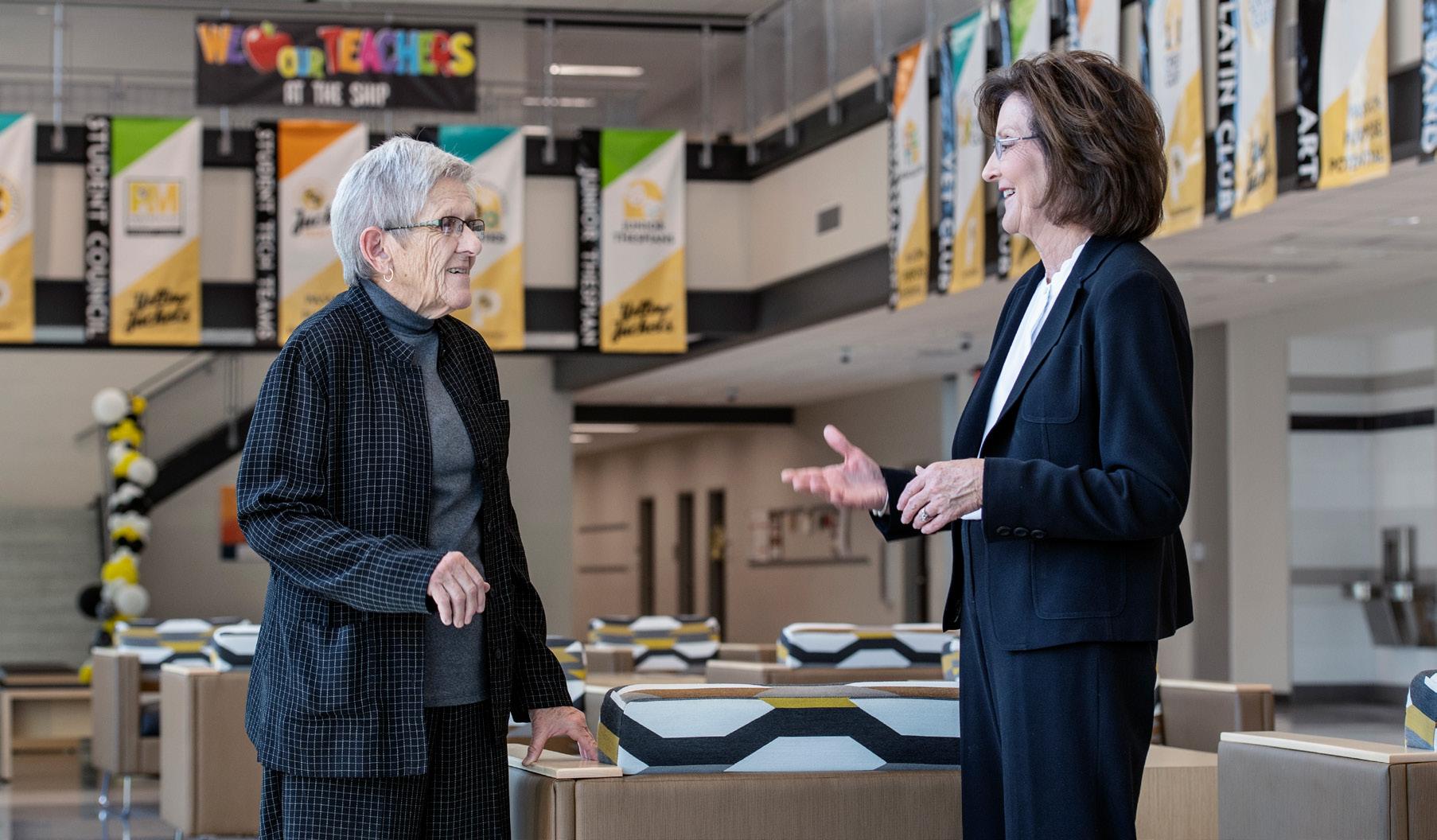
“Still to this day, I walk into the building and get goosebumps. There are things happening there that are a dream come true in terms of education,” Shaw said. “We’re already getting lots of feedback about the MSU students that are going over there and getting experience. They feel so much more confident to be able to go out and teach when they leave Mississippi State.”
Built for learning
PMS was designed to give each group it serves—middle school children, college students and professional teachers—the best environments to learn.
The facility, which can house up to 1,000 students, includes facilities for athletics, band, music, art, foreign languages and laboratories, as well as outdoor resources, such as an activity field, walking track and gardens. Teams of district teachers and classrooms are arranged in learning pods, that include math, social studies, language arts, science and technology classrooms, and labs to service about 125 students.
“It would be hard for a child to go over there and not have fun or find something to be interested in,” said Janice Nicholson, the head of MSU’s Department of Curriculum, Instruction and Special Education. “The building just lends itself to learning.”
Because MSU College of Education middle-block classes—those focusing on education in grades four through eight— are held at PMS, undergraduates are immersed in the daily life of the school. Besides attending their own classes, student interns spend the rest of their days assisting PMS teachers. Standard
education practicum students usually only observe educators in other districts for about 30 hours per semester.
At this innovative middle school, these student interns are partnered with PMS teachers and their students to complete their major’s field experience requirements, which tasks them with providing support in the classroom. Comparatively, practicum students in other districts’ schools are primarily in an observation-only role and, at most, may be matched with a small group of students.
“Instead of being in Allen Hall or somewhere else on campus, our students experience every aspect of the school,” said Kathleen Alley, an associate professor whose instruction focuses on literacy for grades four through eight. “They come in when the buses are arriving, they hear the announcements, they hear the bells, and they hear all the movement in the hallways. It really does provide an authentic, immersive experience for them.”
30 FALL 2022
Janice Nicholson, head of the Department of Curriculum, Instruction and Special Education meets with Teresa Jayroe, dean of the College of Education, at Partnership Middle School, which can house up to 1,000 students.
“MSU students are in proximity of their professors and instructors, so conversations and relationships happen organically. Students get to know their teachers, and teachers get to know them,” added Amanda Tullos, the former SOSD-MSU partnership school director and education liaison. “Learning is extended outside of the college classroom and inside the halls and walls of a real middle school building that is operated by a public school district.”
Besides immersing college students in the middle school experience, district and MSU officials want these future teachers to understand the communities from which their students come. In one such activity, rising teachers tour the school district’s campuses and ride a bus to the most rural parts of the area to see the exact commute some children take each day. In another, college students ask questions to and interact with buildinglevel administrators, teachers and middle school students through seminars.
“Our middle block students see and feel the lives and stories of each life that creates this rural, diverse, consolidated district,” Tullos said.
MSU educators and students are involved in numerous outreach programs, too, including schoolimprovement projects, clothing drives, mentoring and tutoring efforts.
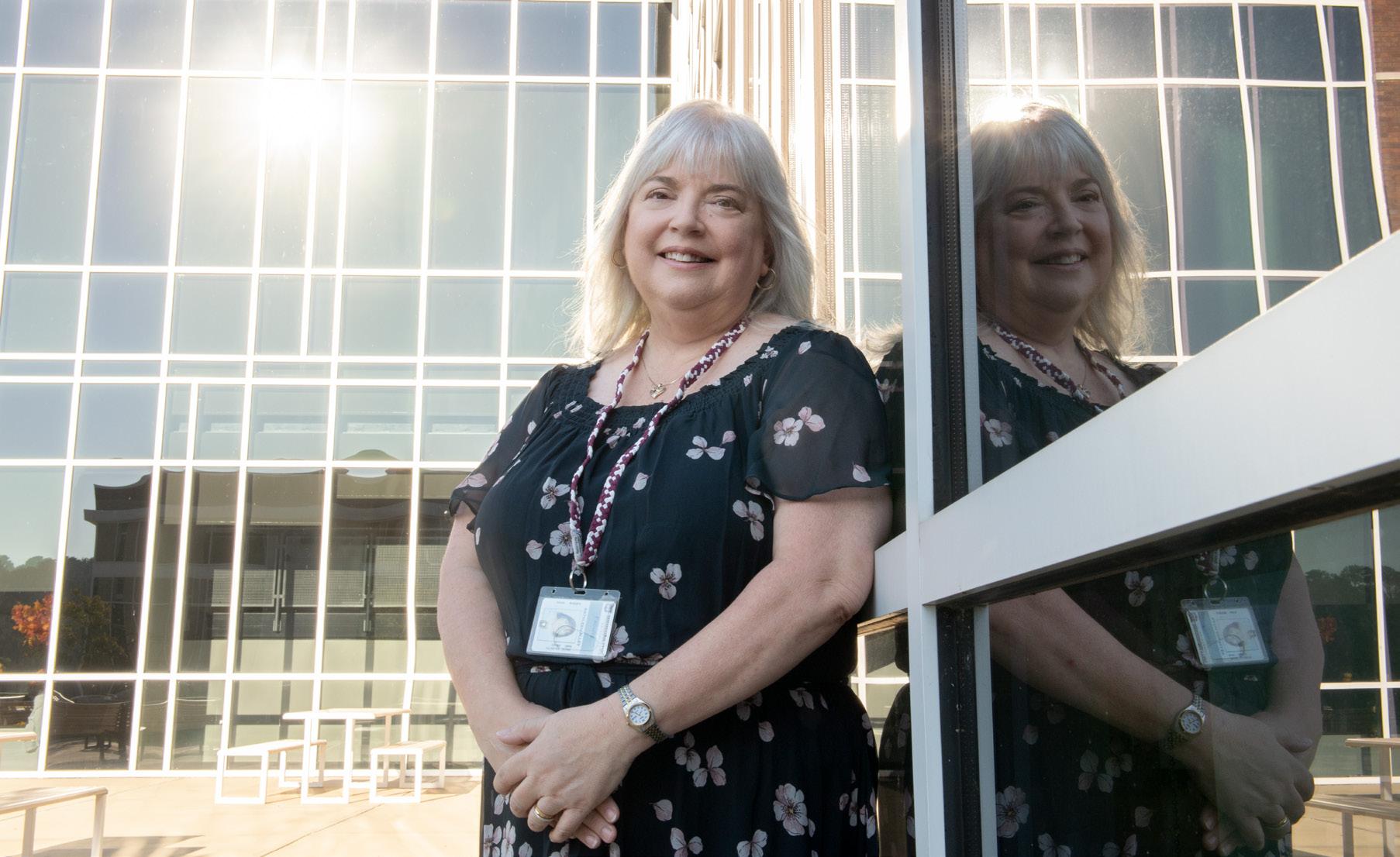
For some district children, arriving at PMS is their first time stepping foot on a college campus, and educators take full advantage of the MSU resources this proximity provides—from field trips and hands-on learning experiences to artistic performances and guest lecturers. For those otherwise unfamiliar with a university environment, this immersion can show a path to higher education.
“If you look at what studies about student interest in college say, they show this interest starts at the middle school level,” Nicholson said. “If we can create an environment that shows college is a possibility, then some of these children,
Kathleen Alley, an MSU associate professor, said Partnership Middle School is a “gem of the rural South."
“Instead of being in Allen Hall or somewhere else on campus, our students experience every aspect of the school. They come in when the buses are arriving, they hear the announcements, they hear the bells, and they hear all the movement in the hallways. It really does provide an authentic, immersive experience for them.”
~ Kathleen Alley
Lauren Shumaker said her intern experience at Partnership Middle School gave her the confidence to step into the classroom and take the reins as a teacher.

one of these days, are going to come to MSU’s College of Education saying they want to become a teacher themselves.”
The on-campus, in-classroom opportunities afforded by the school are also helping with recruitment for both future Bulldog students and faculty seeking research opportunities, said Teresa Jayroe, the dean of the MSU College of Education.
return to PMS in the 2022-23 academic year, said she looks forward to mentoring the next round of MSU students.
~ Lauren Shumaker
“It is enhancing opportunities not only for our preservice teachers but also for our faculty. They’re going to be able to go right here on campus and have these experiences that are so important and to see the transition from lower elementary to higher that happens in the sixth and seventh grades,” she said. “As we grow, opportunities are going to be enhanced for our faculty, for our students and for their students. The impact this school will have is just phenomenal.”
Current teachers also have chances to collaborate with MSU faculty and staff for programs and research, as well as options that allow them to provide insight into better shaping student teacher experiences and how to learn more about curriculum and teaching practices. Shumaker, who will
“MSU gave me a solid foundation to be able to become an effective teacher. My adviser, professors—they just wanted what was best for me and for me to blossom in teaching,” she said. “I knew I could become a good teacher because they gave me the confidence, and I can’t wait to do that for others.”
Alley, who counts Shumaker among her former students said she is a perfect example of the lasting effects of Partnership Middle School.
“Lauren was an amazing student. I knew she’d become an amazing teacher, and now she’s going to be an amazing mentor for our teacher candidates,” Alley said. “That’s just one example of the ongoing collaboration that makes the school great. We’re building a vision—a collective, collaborative vision between stakeholders who utilize the space. An incredible group of people formed this partnership and are working collectively to make a difference in our community. We think of PMS as a gem in the rural South, and I think that I’m just very blessed to be a very small part of it.”
32 FALL 2022
n
“MSU gave me a solid foundation to be able to become an effective teacher. My adviser, professors—they just wanted what was best for me and for me to blossom in teaching. I knew I could become a good teacher because they gave me the confidence, and I can’t wait to do that for others.”
Three MSU programs helping fill educator gap
Continuing a yearslong trend that was worsened by the COVID-19 pandemic, school districts across the country reported thousands of job openings as students returned to classrooms this fall. This fits with the results of a Rand Corp. survey which revealed one-third of teachers and principals polled were likely to leave their job by the end of the previous academic year.
From placing students in live teaching environments to giving working professionals more access to higher education, Mississippi State’s College of Education has a variety of programs available to keep classrooms in the Magnolia State and beyond filled with capable educators. Offered through its Starkville, Meridian and online campuses, the following programs are just three of the university’s initiatives meant to retain and recruit dedicated K-12 teachers.
Mississippi Excellence in Teacher Program: This collaborative endeavor with the University of Mississippi each year provides scholarships to 30 high-achieving students. These awards cover full tuition, room and board and books, and include a $1,000 technology stipend and a fully funded national or study-abroad experience. The award is available to students majoring in secondary education mathematics, science or English; elementary education; or special education. Awardees commit to teaching in Mississippi for at least five years after graduation.
MSU Teacher Residency: This clinical graduate program links education majors with a mentor teacher and places them into a partner school district where they receive hands-on experience in the classroom. A grant from the Mississippi Department of Education covers participants’ full tuition, books and testing fees. Awardees agree to serve as elementary or special education teachers for at least three years in Mississippi after completing their residencies.
Professional Advancement Network for Teacher Assistants: This undergraduate residency program helps meet the needs of working professionals, especially teacher assistants, by expanding access to the elementary education undergraduate program through flexible, hybrid learning experiences of online and in-person classes.
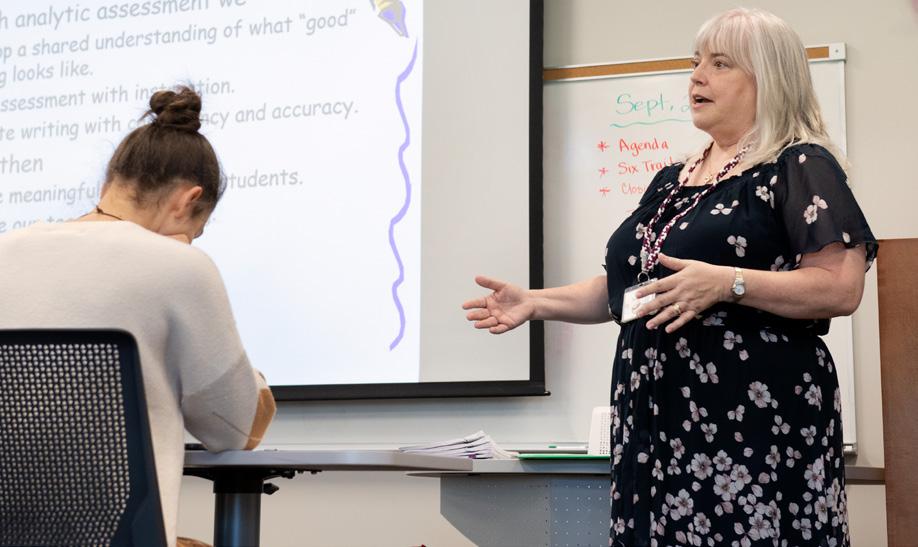
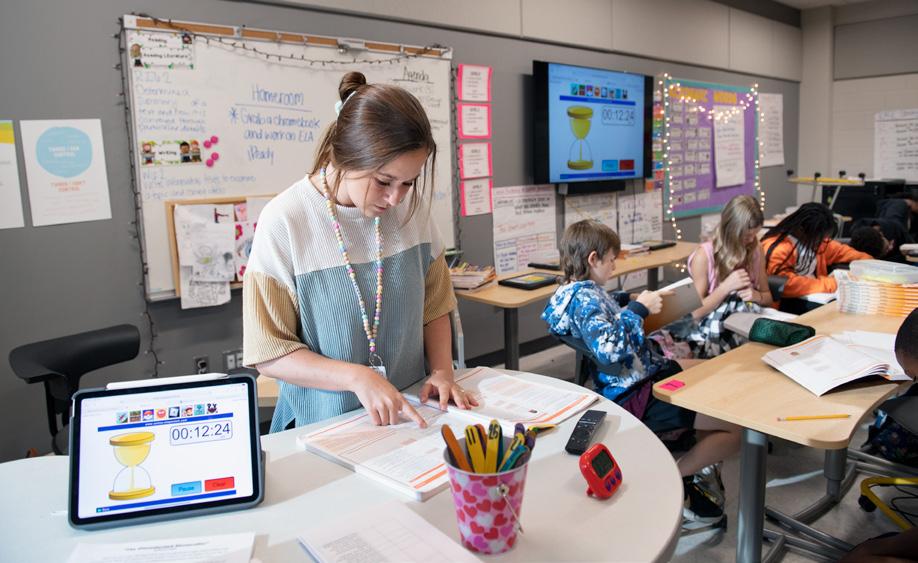
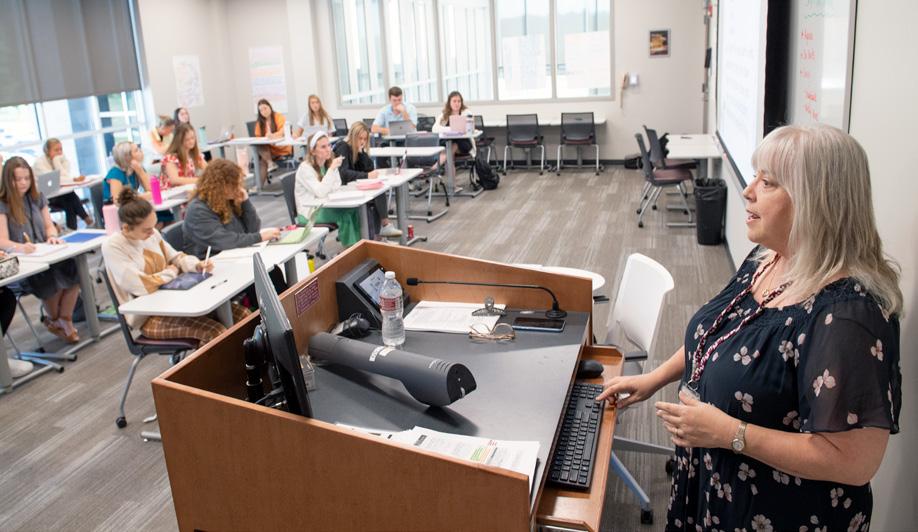
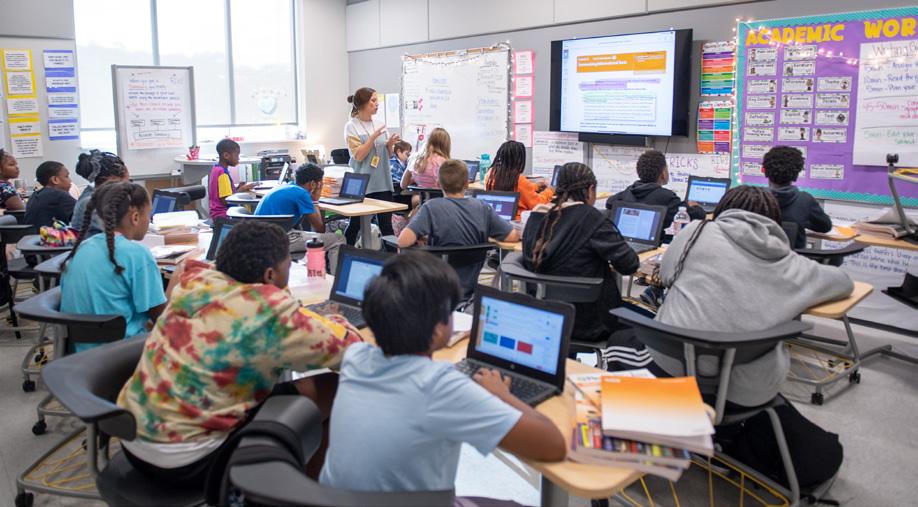
ALUMNUS.MSSTATE.EDU 33
SERVING STUDENTS
MSU initiatives, programs build on strengths of state’s largest university
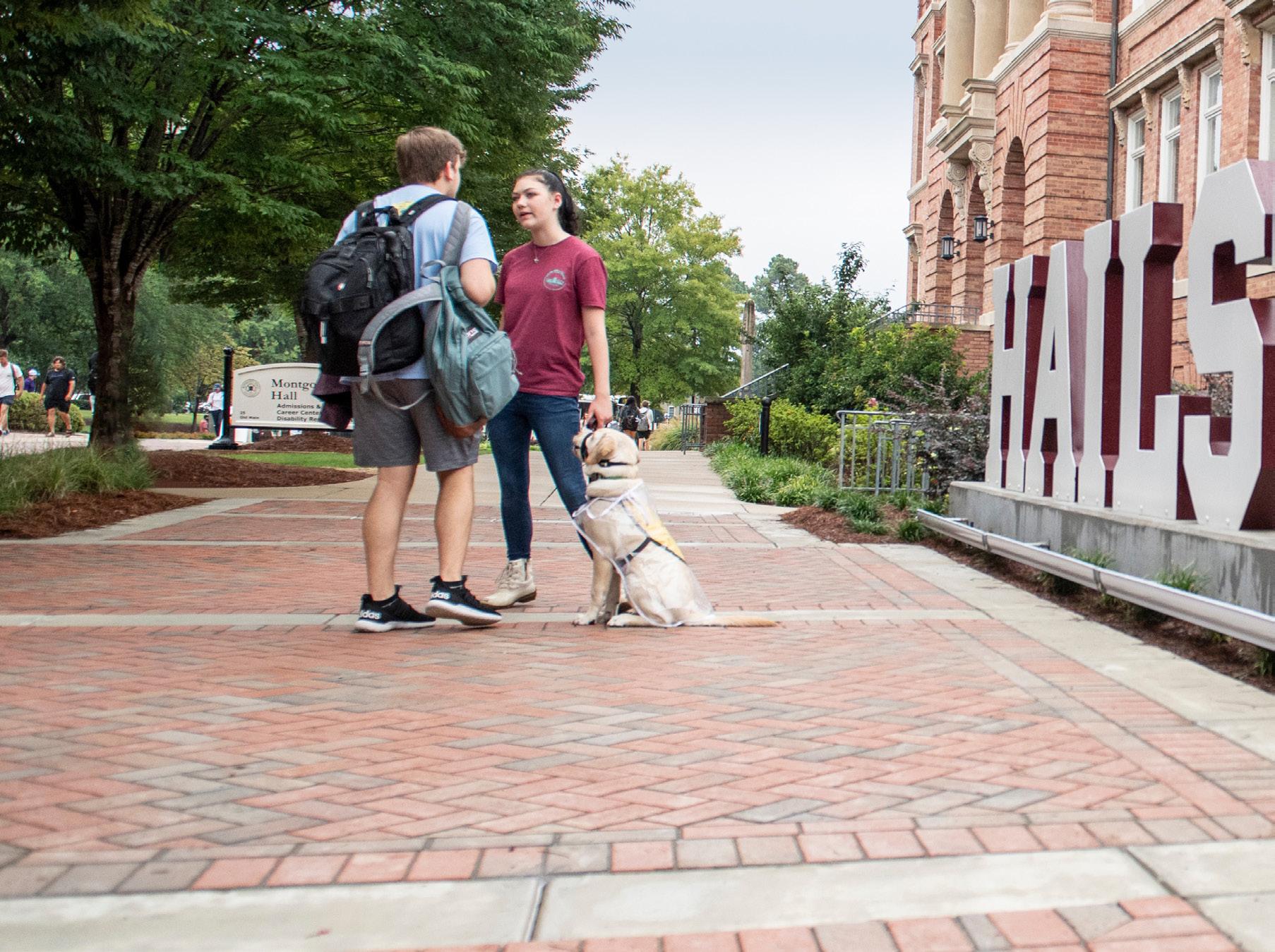 By Carl Smith, Photos by Megan Bean and Grace Cockrell
By Carl Smith, Photos by Megan Bean and Grace Cockrell
While the words learning, service and research are emblazoned on Mississippi
State’s seal, none of these guiding principles would be possible without support.
This year, university leaders enacted two new initiatives—full coverage of graduate assistants’ tuition and expanded ranks for instructors and teaching professors—that not only will provide help to both students and faculty at a time when it’s greatly needed but also will make the university more attractive to those seeking higher education or employment.
In addition to supporting those coming to State, the MSU Career Center is helping graduates successfully take their next steps at a historic rate.
The unit’s annual First Destination Survey revealed 97% of 2020-21 graduates who responded to the survey were either employed, enrolled in an advanced degree program, serving in the U.S.
military or participating in a volunteer program within the first six months of graduation.
“We often talk about being a family at Mississippi State, and that’s what families do—we take care of one another,” MSU President Mark E. Keenum said. “We want to make the very best investments we can in our people. It is also essential that we are as competitive as we can be in order to continue to recruit exceptional students and faculty to our campus.
“Covering tuition costs for our graduate assistants and modernizing our faculty ranks and titles will help us achieve our goals,” he continued. "We also want to support our students as they prepare for life after graduation. The MSU Career Center offers the resources and guidance students need as they prepare to join the workforce and begin building a successful career. These examples are just a few of the ways our university is investing
34 FALL 2022
in all of our Bulldogs—from students, to faculty and staff, and alumni, too.”
Graduate tuition coverage ‘a personal’ goal for provost
David Shaw can thank his wife for his academic and professional successes.
After earning a bachelor’s degree from Cameron University in Oklahoma, his path in higher learning continued to master’s and doctoral programs at Oklahoma State University. During that time, his wife Sherri worked a full-time job that ensured the couple was financially stable so the future MSU provost could continue his studies.
Decades later, Shaw said the ability to fully cover tuition for all graduate teaching and service assistants across the university is a significant act that will greatly improve the lives of those affected.
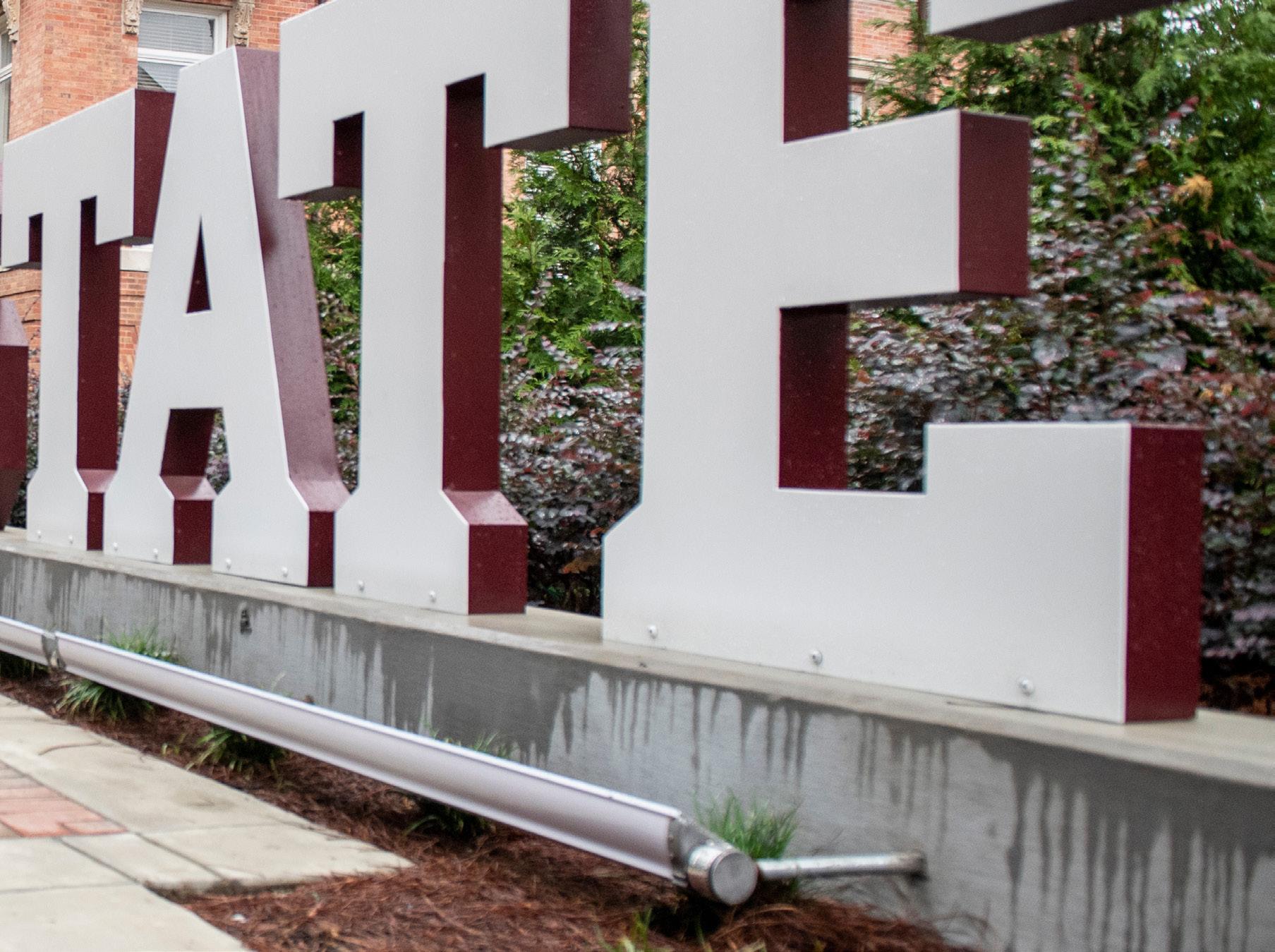
“Quite frankly, I don’t know how I could have possibly gone through graduate school if I had not had my wife and others support me,” Shaw said. “It was very personal for me to be able to provide that kind of a tuition waiver for our students. I never want the lack of funding to be an impediment to education for our graduate assistants.”
Finding ways to increase financial support for these graduate students has been a discussion among university leaders for years. While federal funding rules previously included graduate research assistants in tuition coverage, graduate teaching and service assistants were not fully covered. Increasing this coverage was identified as a top priority in 2021 by the Graduate Studies Task Force after a two-year study on how to better position the MSU Graduate School for the future. Additional funding from the Mississippi
ALUMNUS.MSSTATE.EDU 35
Legislature helped the university ensure full tuition coverage for any student receiving a graduate assistantship.
MSU had approximately 1,176 graduate assistants in the fall 2021 semester. Of those, 442 were graduate teaching assistants and 137 were graduate service assistants.
While graduate research assistants carry out their namesake—research—for the university, graduate teaching and service assistants aid both faculty and staff. Specifically, graduate teaching assistants support academic instruction—from leading lectures or serving as the instructor of record to exam preparation and grading— while graduate service assistants perform administrative functions and duties specific to the needs of their campus unit.
The ability to now offer full tuition coverage for all three types of graduate assistantships is a game-changer when it comes to the ability to recruit prospective students, said Peter Ryan, executive vice provost and dean of the MSU Graduate School.
Jeremy Montgomery racked up experience as both a graduate teaching assistant in his department and a graduate service assistant for the MSU Graduate School.
Knowing his tuition would be fully covered, he said, would be “a big stress reliever.”
“Ever since Dr. Keenum came to Mississippi State, he made it one of his priorities to try and level the playing field for all graduate students on assistantships, whether they’re research, teaching or service,” Ryan said. “The pandemic took the wheels off the wagon big time, but we kept the conversation going, because not having 100% tuition coverage for all assistantships put us at a real competitive disadvantage with our peers.
“We attract some of the best students because we have great graduate programs and we’re a great research institution—the numbers show it—but we would lose some of them because we weren’t able to be competitive in providing a reasonable package to enable them to come to Mississippi State,” he added.
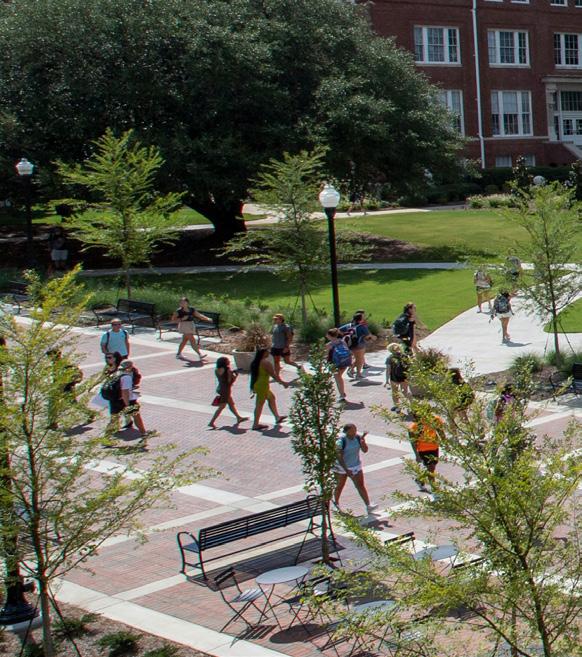
Jeremy Montgomery, a Ph.D. candidate in history, enrolled at the university in 2015
after receiving a bachelor’s degree from Xavier University of Louisiana. Since then, he’s racked up experience as both a graduate teaching assistant in his department and a graduate service assistant for the MSU Graduate School. Knowing his tuition would be fully covered, he said, would be “a big stress reliever.”
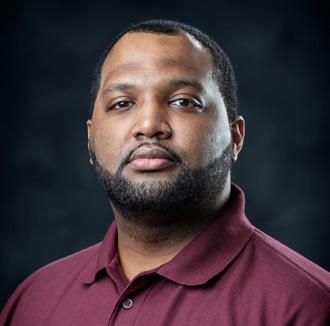
“When I talk to other graduate students, we always come back to the same question: How do I afford the cost of living of right now?" Montgomery said. “Higher education doesn’t seem feasible if you’re going hungry, can’t keep the lights on or can’t provide for your family.”
Tristan Henderson, who is working on his Ph.D. in molecular biology after graduating from Houston Baptist University in Texas, said he chose to enroll at MSU because his assistantship was guaranteed funding through a National Science Foundation grant.
Without that support, his academic path could have changed and led him to a different school offering better benefits.
“I’m lucky to have that, because not every graduate student has had guaranteed funding. You have to go where the money is, and that kind of dictates your top choices,” he said. “It’s a wonderful step in the right direction to make more competitive programs. It’s like a positive feedback loop, because the more support you can give to the workers on the ground and the graduate students, the better the university will be in the future.”
New professional tracks modernize faculty structure
By clarifying existing professional teaching ranks, adding a promotion ladder for instructors and reducing the barriers for established professionals looking to teach, MSU has positioned itself to attract and retain the best teachers the market has to offer in the future.
This spring, a universitywide faculty vote overwhelmingly supported the establishment of two new positions— teaching professor and professor of practice—and new ranks for them and existing instructor, clinical instructor and Extension instructor positions.
36 FALL 2022
While tenure-track positions remain unaffected, these changes to professionaltrack positions will address longstanding needs, including having advancement paths for instructor positions previously without promotion tracks, allowing for a route that frees instructors from research requirements and establishing a professor of practice track that will bring in experienced professionals who may lack the degrees required for academic, tenure-track positions.
“Having teaching professor and professor of practice both approved at the same time really plays into the strengths of the institution. Land-grant universities like Mississippi State are designed to educate everyone and need to bring that practical experience back to the classroom,” Shaw said. “If you look at the seal of MSU, it says, ‘Learning, research and service.’ We’ve always talked about the fact that those are three equal entities.
“We need to be sure to recognize that we’ve got faculty with Extension or outreach appointments that are just as much faculty as the rest of the campus and we have faculty that love to teach,” he continued. "Let’s give them the opportunity and responsibility to teach more, so that we are using the best people with the best talents in the best positions.”
Expanding and modernizing the faculty ranks was an idea that was shelved almost a decade ago but brought back for discussions
after Shaw became provost in 2019. A task force report on how to go about the expansion was issued and vetted by numerous university committees and the Robert Holland Faculty Senate before going before a universitywide vote at the end of the spring semester.
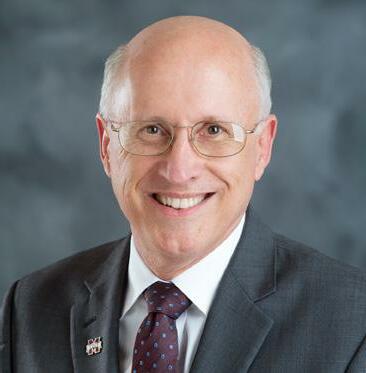
The 87% support the new structure received at the ballot box showed how united the MSU faculty is when it comes
"Land-grant universities like Mississippi State are designed to educate everyone and need to bring that practical experience back to the classroom.

If you look at the seal of MSU, it says, ‘Learning, research and service.’ We’ve always talked about the fact that those are three equal entities." ~ David Shaw
to supporting each other, said Rebecca Robichaux-Davis, the former faculty senate president and a professor in the MSU Department of Curriculum, Instruction and Special Education.
“It was a long process that was done very purposefully, and I think in the end, it showed because the unprecedented vote we had speaks for itself,” Robichaux-Davis said. “This whole process couldn’t have happened without the support of Dr. Keenum,
ALUMNUS.MSSTATE.EDU 37
Dr. Shaw and the rest of the administration and faculty who worked on it.
“Throughout this whole process, we promoted the idea of ‘one faculty’ and wanted to break down the barriers between tenure-track and nontenure-track faculty," she said. "We want to be one faculty, because we’re all here to contribute to the university in the best way possible. We’re going to attract and retain better instructors and have better instruction, so our students are going to benefit from this as well.”
‘There’s a grit to our students’
MSU Career Center Executive Director Bethany Mills’ career path is a perfect example of the adaptability students like those who come to her organization for help in securing a job need.
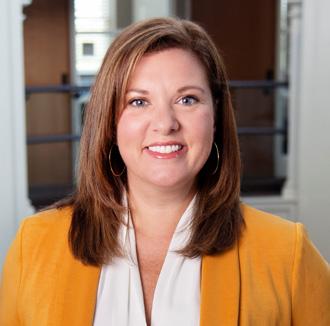
877 graduates—stayed in Mississippi for employment, with Tennessee coming in second.
To prepare students for these career opportunities, the center offers a variety of services through career advisers, who serve as liaisons to specific colleges or majors on campus. They’re the point of contact for students when they have job-related questions or needs, including how to search for jobs, prepare a resume or handle tough questions during a job interview. The center also hosts events linking employers— many of whom are alumni—to students through on-campus interview sessions and an online job board, among other outreach activities.
“We’re preparing them for those experiences, but we’re also creating the connections so they can find these opportunities. We have a very strong network of alumni wanting to hire Mississippi State graduates,” Mills said. “Employers who come here for career fairs and interviews tell us how impressed they are with Mississippi State students.
“They not only have the skills for work but they also have the skills for leadership and management,” she continued. "I love hearing that. And across the board I hear that there’s a grit to our students—an ability to lead, ask good questions and be curious, and they’re not afraid to do the work that’s required.”
In 2002, Mills started her undergraduate career thinking she would teach chemistry after graduation. Student teaching, however, made her realize a career in the classroom was not for her, so she went to graduate school to study counseling. A chance opportunity as a graduate service assistant with the Career Center ignited a passion for helping others find their way professionally, and she hasn’t stopped since.
While the university continues to make itself more competitive in attracting the best students and teachers, Mills, the campus community and the Career Center are working diligently to make graduates as competitive as they can be for new jobs and opportunities—and the newest data shows it’s working.
The center’s most recent First Destination Survey showed 97% of all respondents had successful career outcomes within six months of their graduation. Specifically, 71% found full- or part-time employment, while 23% enrolled in a program of continuing education. The survey showed an overwhelming majority of those finding jobs—approximately
The last three years for the Career Center have been ones filled with adapting to new economic conditions created by the COVID-19 pandemic, and Mills says her organization is working hard to prepare students for the uncertain job market that is developing due to rising inflation and less consumer spending.
“It’s going to be crucial to keep our talent in touch with opportunities that do come up. We have to rethink how we get them to those options,” she said. “I wish I had a magic wand to see the future and exactly how it will impact opportunities for our students. We just simply do not have enough information yet to say, but we’re going to continue getting them ready for every opportunity possible.
“Being able to adapt to changing conditions is key for our students, and we can help them with getting in front of employers for those hiring possibilities,” Mills added. “These opportunities are always going to exist. They might not be the ones that they’re the most excited about, but it can at least get them started in the right direction and they’ll have the skills to go on to something even better.” n
38 FALL 2022
"We’re preparing them for those experiences, but we’re also creating the connections so they can find these opportunities...Employers who come here for career fairs and interviews tell us how impressed they are with Mississippi State students." ~ Bethany Mills
Twice as Nice
Bulldog family celebrates two alumnae in 2022 Miss America competition
By Susan Lassetter
The Bulldog family will have two reasons to cheer during December’s Miss America pageant as Emmie Perkins, a senior communication major, and Alivia Roberts, a 2018 communication graduate, vie for the crown.
The reigning Miss Mississippi State University, Perkins was crowned Miss Mississippi 2022 in June.
The Hattiesburg native enters the pageant with the platform Music is Medicine, which is also the name of an organization she founded that focuses on bringing music and art into hospitals, nursing homes and school systems across Mississippi. She said she hopes to eventually take the program national. At MSU she is a mentor for the ACCESS program, a Roadrunner and a member of Kappa Delta sorority. A former intern for the Greater Starkville Development Partnership, she plans to work in public relations following her graduation.

ALUMNUS.MSSTATE.EDU 39
Our PEOPLE
Roberts also earned her qualifying title in June. A native of Shannon, she is using her Miss District of Columbia title to raise awareness for The D.R.E.A.M. Impact, a mentoring program that stands for Determination, Responsibility, Excellence, Accomplishment and Motivation. She currently works as an aide to U.S. Vice President Kamala Harris, which is the latest in several positions she has held in federal organizations including the White House, Department of Justice and U.S. House of Representatives. In addition to her MSU degree, she holds a Master of Public Administration and certificate in nonprofit management from George Washington University and a certificate in entrepreneurial leadership for the global marketplace from the University of Oxford, England. A decorated 4-H alumna and community volunteer, she is an active member of the Junior League of Washington, Greater Washington Urban League Young Professionals, Black Women’s Congressional Alliance and the MSU Alumni Association.
In addition to the evening wear and fitness competitions, all contestants will compete in interview and talent categories. Perkins will perform as a vocalist, while Roberts will showcase ballet en pointe. Watch both women compete against 49 others for the title of Miss America later this year. n

40 FALL 2022
Our PEOPLE
DIGGING DOWN DEEP
MSU alumnus takes irrigation industry by storm
 By Grace Jones
By Grace Jones
Cory Rowe, a 2000 agricultural economics alumnus, has been running Chicot Irrigation, his family’s business, for nearly a decade. Since he took the reins in 2013, it has grown into the largest agricultural irrigation company in the Southeast.
Founded in 1954, in Lake Village, Arkansas, Chicot Irrigation has been owned and operated by his family for three generations. Rowe’s maternal grandfather, James McDonald worked for and eventually bought Chicot Irrigation in 1973. Rowe’s mother and father joined in the family business and Cory, who grew up in it, returned full time after graduating from Mississippi State University.
Chicot Irrigation started as a well and pump business that focused on domestic and livestock water wells and irrigation projects. Now, over 60 years later, it offers irrigation well drilling, pumping solutions, underground pipeline installation, dewatering flood control pumps and more with its telemetry and technologybased management tools. The company has over 100 employees, with six offices and locations throughout Mississippi, Louisiana and Arkansas.
.MSSTATE.EDU
“My dad had an entrepreneurial mindset, so when he and my mom started working for my grandfather in the late ’70s, he oversaw the company installing some of the first center pivots in the Delta,” Rowe said. “My dad worked to diversify and grow the business’s product offerings. The devastating droughts that hit the Delta in the early ’80s made irrigation more mainstream as a risk management tool, and the shift from cotton production to grain production in the ’90s furthered that trend.”
Rowe began at Mississippi State in the fall of 1995, with the intention of attending MSU’s College of Veterinary Medicine. Halfway through, however, he changed course to pursue an agricultural degree. Upon graduation, he returned home to the family business.
“Even though I grew up in the irrigation and well drilling business, I hadn’t planned
for an agricultural career until I arrived at MSU,” Rowe said. “The relationships I formed with agricultural economics professors and other students who were from farm families, plus the classes and a job on South Farm helped me realize that an ag career was in my blood all along.”
At his family’s operation, Rowe worked from the ground up, starting in the field before moving into sales and accounting. After learning the nuts and bolts of the business, he progressed into management and opened a small office in Rolling Fork. Within a few years, the business grew so much he opened another office in Hollandale.
Rowe explained that while his father diversified the company’s product and service offerings, he sought to expand geographically to further offset the risks that come with a seasonal business like agricultural irrigation.

Our PEOPLE
"The relationships I formed with agricultural economics professors and other students who were from farm families, plus the classes and a job on South Farm helped me realize that an ag career was in my blood all along." ~ Cory Rowe
“Taking the reins was different and hard but also easier because I understood the work in the field, our business model and culture,” Rowe said. “There are nuances in the irrigation business, so you must do a lot of things well to help your customers. If you know what needs to happen in the field, you know what must happen to keep the business in line.”
To keep up with the times, Rowe said the company has employed many technological advancements since it began. Chicot now uses telemetry to measure soil moisture and make irrigation decisions based on field data while managing equipment from remote locations. These products fully automate irrigation across multiple fields.
“Irrigation has changed tremendously over the last decade,” Rowe said. “Much of that was driven by MSU research led by Dr. Jason Krutz, aimed to help farmers maximize irrigation efficiency.”
Krutz formerly served as an Extension professor and a scientist in the Mississippi Agricultural and Forestry Experiment Station. He now directs the Mississippi Water Resources Research Institute at MSU.
The innovation and hard work that Rowe, his company and researchers have put into improving irrigation systems and production has indeed helped farmers, employees and communities throughout the Midsouth.
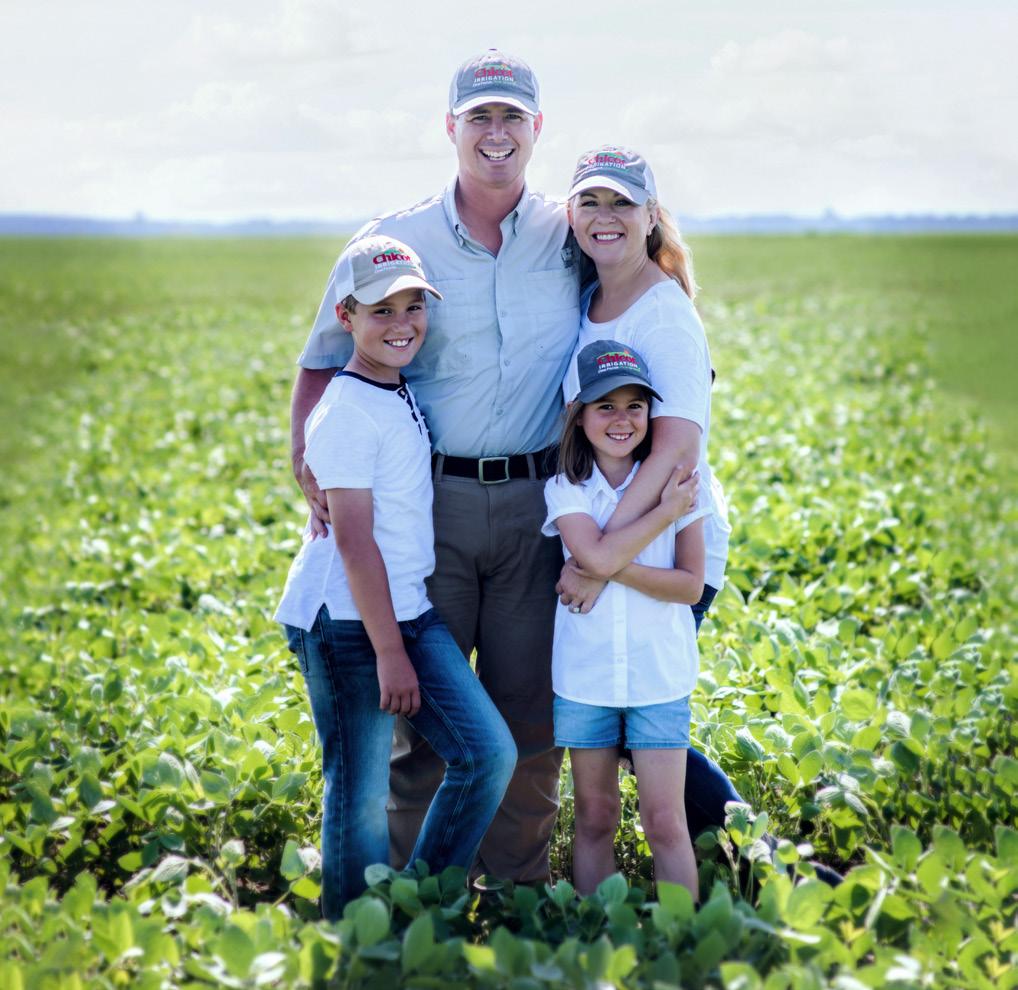
“While we’re a mom-and-pop operation, no large company has done what we do,” Rowe said. “I am proud of our customer relationships and how we provide high-paying jobs and support our communities and schools in rural areas. While we seek to make a profit, we’re also charged with being good corporate citizens in our communities.”
Chicot Irrigation not only supports the local communities they are in, but they also support MSU and students through high paying jobs, internships and opportunities to gain experience while in school.
“I’m proud that many of Chicot Irrigation’s employees are MSU alumni,” Rowe said. “We recruit students to work for us during the summer. MSU has such good agricultural programs. It is a point of pride for us to have employees from Mississippi State.” n
ALUMNUS.MSSTATE.EDU 43
Cory Rowe with his wife Heather and two children.
ARTISTIC SPARK
MSU’s Bostic blazes path to art career, illuminates the way for students
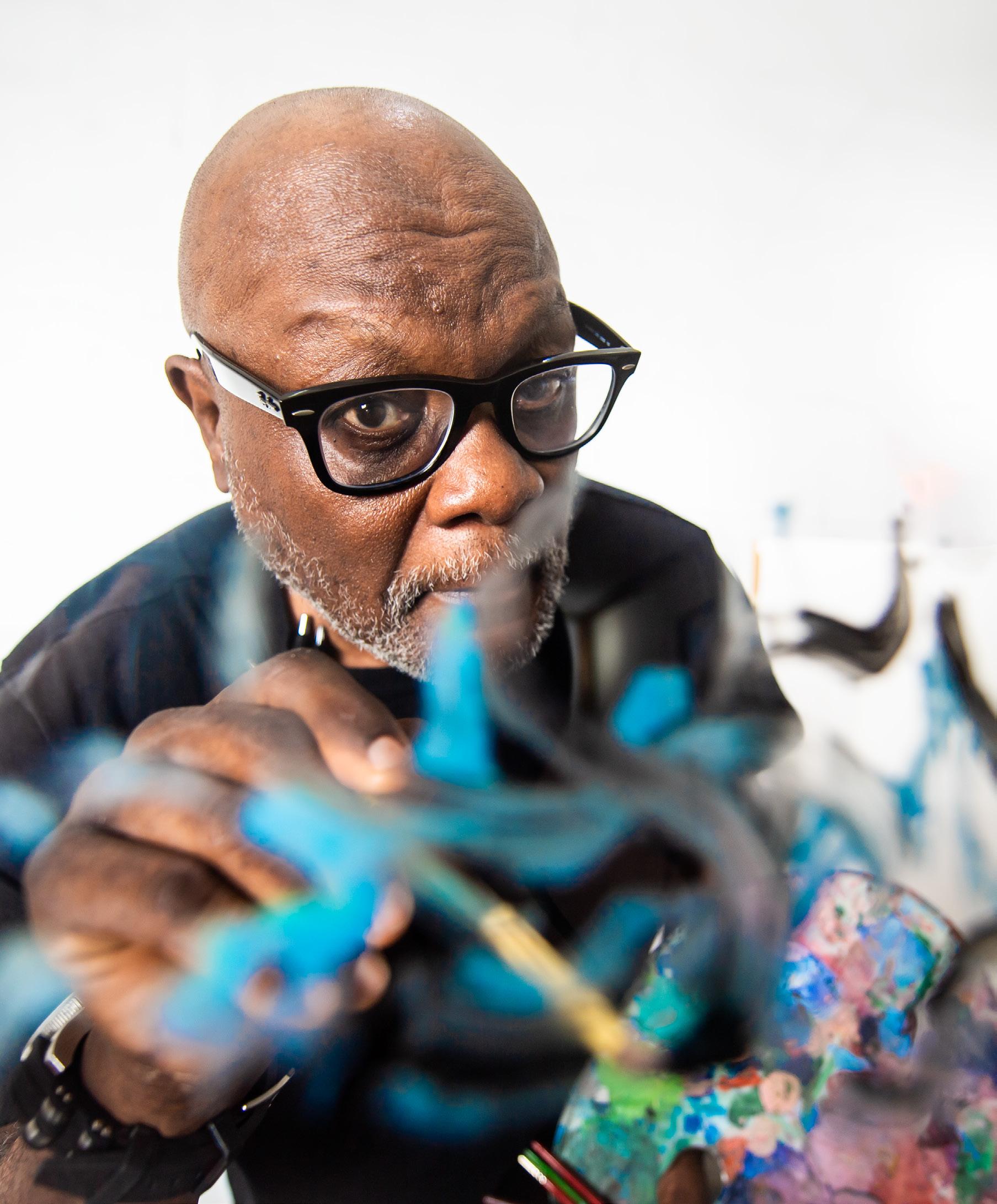 By Carl Smith, Photos by Grace Cockrell
By Carl Smith, Photos by Grace Cockrell
Our PEOPLE
Playing with matches as a kid sparked Alex Bostic’s passion for drawing. Now more than 40 years into his career and heading into his last year of teaching, the Mississippi State associate professor’s creativity is on national display, and his instruction and mentorship are preparing students to become professional artists.
Almost six decades ago, Bostic’s art was first displayed outside a Brooklyn, New York, fire department. That was when a local fire chief asked the then-7-year-old and his brother to spend their time drawing pictures instead of potentially burning down their neighborhood by playing with matches. A concerned neighbor had reported them to the authorities.
“She stuck her head out the window and yelled at us to be careful, so my brother told her she needed to mind her own business.
Ten minutes later, the firetruck arrived and stopped right in front of us,” Bostic said. “They took us back to the station, and the fire chief showed us pictures of fires that happened in the community. He gave us some crayons and paper and told us to draw things instead of possibly starting a fire.
youth, featured in a curated Norman Rockwell Museum exhibition examining how illustrations have shaped attitudes toward race and culture throughout history.
“I’m still having fun because I’ve never worked a day in my life,” he said. “When I decided at 7 years old that this was what I wanted to do, I made a beeline to becoming an artist. You could not deter me or convince me otherwise.”
“My job with my students is simple: I’m here to help you get where you want to go. I’m not just teaching from theory; I’m teaching from real, practical application. As an educator, I’m trying to give you knowledge that can help you on your journey.” ~ Alex Bostic
Bostic’s career includes stints as a Hallmark greeting card artist, U.S. Navy illustrator draftsman, movie poster designer and clip art creator—all jobs that allowed him to “keep the lights on,” he said, while he created his own art for personal satisfaction. In 1979, Bostic earned a bachelor’s degree in illustration from the prestigious Pratt Institute in Brooklyn, New York, and followed it with a master’s degree in illustration from New York’s Syracuse University 15 years later. His 37-year teaching career includes stops at the Kansas City Art Institute, Woodbury University, Virginia Commonwealth University and his alma mater, the Pratt Institute before he came to MSU in 2010.
“The other part of the chief’s instructions was to bring back our drawings. I got up early in the morning that next day to take mine. They put my drawing into the marquee and I was really happy,” he continued. “From then on, I would bring new drawings to the fire station every day and get my friends to come look at them. That’s when I knew I wanted to be an artist.”
This year, Bostic celebrated the dedication of his painting “Edmonia Lewis” as the 45th stamp in the U.S. Postal Service’s Black Heritage Series; the release of “Free at Last: A Juneteenth Poem,” a 32-page children’s book about the historically and culturally significant holiday he illustrated; and “Young Lando,” an imagining of the classic “Star Wars” character Lando Calrissian in his
While Bostic said he enjoys teaching the fundamentals of art and design, he said it is his students’ continued success that has brought him back to the classroom each year. Specifically, he said he takes pride in helping his former pupils pursue their goals of higher education. He can quickly rattle off a list of students working on advanced degrees—one at Florida State University studying sculpture, another at Syracuse University studying illustration and so on.
“My job with my students is simple: I’m here to help you get where you want to go. I’m not just teaching from theory; I’m teaching from real, practical application,” he said. “As an educator, I’m trying to give you knowledge that can help you on your journey.”
ALUMNUS.MSSTATE.EDU 45
Mentoring former students as they move forward in their careers is also an important aspect to Bostic. In 1989, Indira Bailey was a freshman in Bostic’s illustration class at the Pratt Institute. Bailey, who is now an assistant professor of art education at Claflin University in South Carolina, said two things stood out to her that year: how comforting it was to see someone who looked like her teaching and succeeding as an artist and a surprise trip Bostic, with his daughter in tow, took to see her when she was hospitalized during Christmas break.
The two reconnected years later through social media, and Bailey said Bostic continues to provide professional advice and inform her of opportunities to display her art.
“Any questions I have about my art or the business side, I can talk to him and he’ll guide me. He’s just always there for me,” she said. “He really wants to see artists excel and be successful.”
Having someone so dedicated to student success and able to impart real-world lessons on learners has been a boon for the MSU Department of Art, according to Angi Bourgeois, a professor and dean of the College of Architecture, Art and Design.
“Bringing his sense of entrepreneurship to our students at a time when the economy changed the way we think about creative careers and creative education was really valuable,” she said. “He figured out how you go out into the
world as an artist and make a place for yourself, and he translates that to our students. He really opened doors for students because of the approach he has—it’s not just about a solitary, creative process, but one that lives in the world and finds the pathway.”
Although Bostic said he plans to conclude his teaching career at the end of the coming academic year, he intends to stay in touch with his students as they continue pursuing art as a career.
“As educators, I think that students can always come back to us. It doesn’t end because you put on a graduation cap,” he said. “I’m just one of the pieces of the wheel that turns in your life.” n
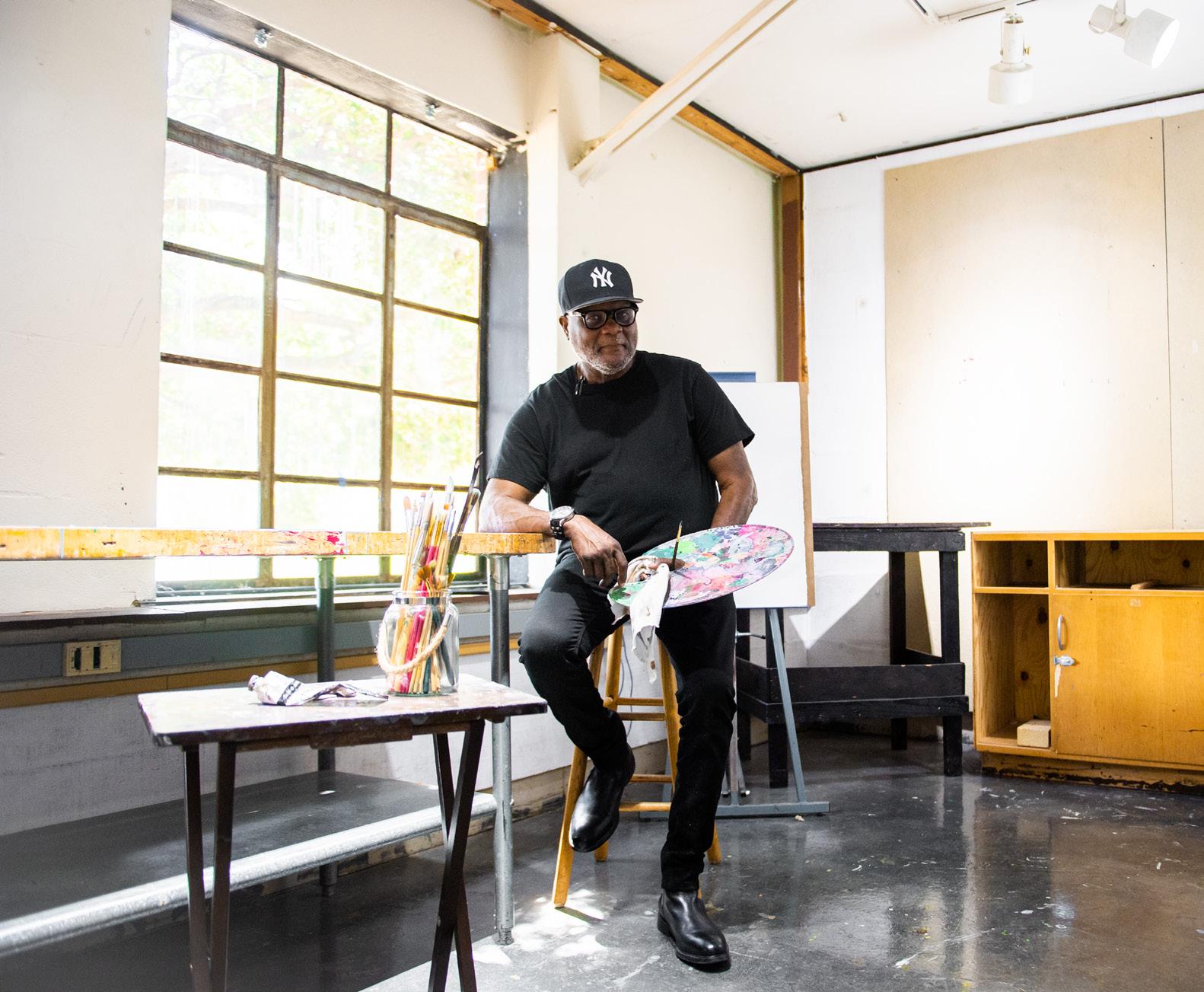
46 FALL 2022 Our PEOPLE
Estess gives back to his communityone meal at a time
By Carl Smith, Photos by Megan Bean
Charlie Estess believes in a simple idea: Meals can bring a community together.
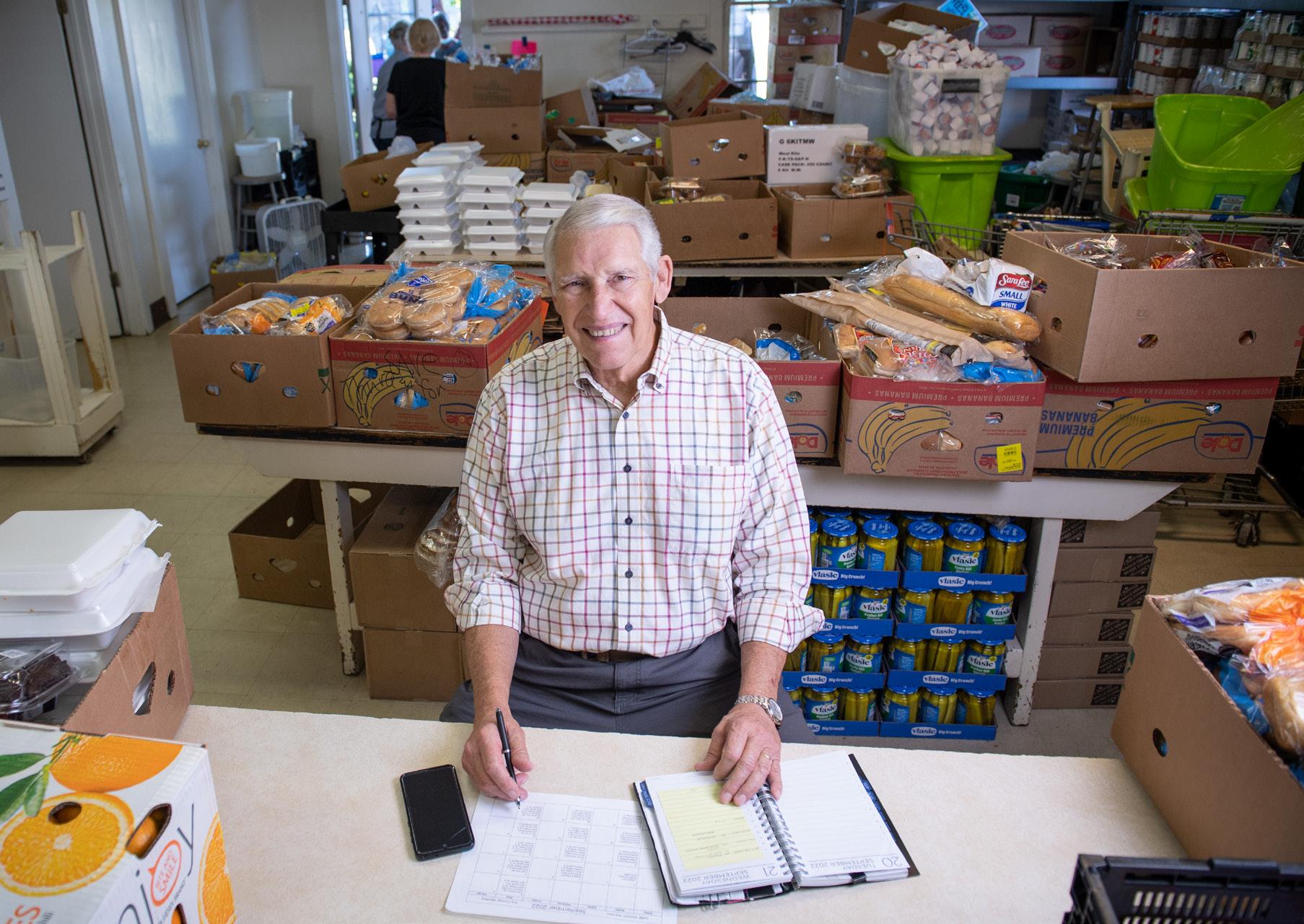
In Clarksdale, where Estess has lived for almost 40 years, the former Mississippi State Extension agent is doing just that—helping unite Coahoma County through the power of service, support and sustenance.
Estess is the executive director of the Care Station, a nonprofit that has provided free meals and groceries to those in need since 1987. He first became involved during the organization’s infancy through fundraisers in which he helped fry catfish, a Mississippi Delta staple.
“The reason I’ve been involved for so long is that it’s just so much deeper than a plate of food. We have a whole network of friendships that none of us would have ever had without the Care Station. We get to see the community come together and take care of one another, and it’s incredibly infectious,” he said. “That’s the thing about people caring for each other—it touches people’s hearts while making everyone understand the true needs of the community.”
The center offers many ways to get nourishment into stomachs and pantries, including daily walk-up meal services, multiple
ALUMNUS.MSSTATE.EDU 47
Through the Care Station, retired Mississippi State University Extension Service agent Charlie Estess unites Clarksdale residents through volunteerism and charity outreach efforts. The food bank provides meals and groceries to people in need via a walk-up location, delivery services and a mobile pantry.
home deliveries throughout the week, weekend grocery bundles and monthly food pantry opportunities.
In all, Estess estimates the center prepares about 1,000 meals each week for its walkup service and makes deliveries to almost 200 people. Almost 100 volunteers, many of whom are retirees, rotate in and out the center each weekday, and local firefighters and police officers even pitch in extra help.
Estess said helping his community provides a sense of profound satisfaction, but the bonds formed through service are a source of immense pride, similar to the fulfillment he found during his career with MSU.
An MSU graduate with a degree in education, Estess said joining the MSU Extension Service was a natural calling. His father and two of his uncles were agents, while a cousin worked with the local 4-H club.
For his own Extension career of three decades, Estess stayed close to the people of the Delta. In 1973, he joined the Humphreys County office while commuting two days each week from Belzoni to Starkville so he could work on a master’s degree. Twelve years later, he moved to the Coahoma County office.
Throughout his career, Estess worked with local farmers and young learners on a range of projects from pigs to catfish. He served as a district Extension agent and was involved with the Delta Research and Extension Center in Stoneville before his retirement in 2005.
He said being close to the people of the Delta, a mostly rural area of Mississippi with a large African American population, opened his eyes to the need throughout the region.
Historically, the area has suffered more from poverty-related issues than any other part of the state, and these issues disproportionately affect its Black residents. Most of the Delta’s counties recorded a poverty rate of 30% or higher from 201519, according to a 2020 U.S. Census Bureau report. Almost 35% of Coahoma County residents were living in poverty at that time, which includes about 41% of its Black residents. The Delta also sees higher unemployment rates, with many of the counties reporting rates above 5.5% compared to the national rate of 3.8%,
according to a June 2022 Mississippi Department of Employment Security report.
Like those from across the Delta, many Coahoma County residents live in what is considered a food desert—areas with reduced access to fresh fruits, meat and vegetables because of a lack of nearby grocery stores. Many people below the poverty line
“I’m not afraid to tell people about the true need. Every one of us needs to step up. It’s not like it’s just their problem, it’s everyone’s problem. The Extension Service was the perfect place for someone who wanted to make a difference in people’s lives. You’re going to love your job if you make a difference in people’s lives, and I loved my job.”
~ Charlie Estess
simply cannot afford to travel long distances to acquire food or even have access to travel in the first place. Convenience stores and fast-food chains, with their highly processed foods, typically fill the void of grocery stores in these areas, which leads to dietary and health issues for locals, including obesity, diabetes and heart disease.
“I’m not afraid to tell people about the true need. Every one of us needs to step up. It’s not like it’s just their problem, it’s everyone’s problem,” Estess said. “The Extension Service was the perfect place for someone who wanted to make a difference in people’s lives. You’re going to love your job if you make a difference in people’s lives, and I loved my job.”
Estess’ friends and neighbors say he makes a difference through more than providing food. They say he also provides hope to the people of Clarksdale.
Bubba O’Keefe, the tourism director for Clarksdale and Coahoma County said having someone like Estess out there
meeting the needs of others and giving hope to the community shows residents and visitors alike how special the area and its people are.
“Just to give people a pat on the back and show them that someone is there for them — people don’t realize what that can do for somebody,” said O’Keefe, who has known Estess since he moved to Clarksdale in the 1980s. “Charlie feels the need, and he feels the pain, too. Serving is not a job for Charlie, it’s a gift. He does everything from the heart. He’s just so personable and so interested in the welfare and well-being of others. He would do anything to help anybody.”
Both O’Keefe and Willie Turner, Clarksdale’s Ward 3 councilman, have spent time volunteering with the Care Station. Turner, a retired firefighter said Estess is so unassuming in appearance and nature that it would be hard to believe he has so much of an impact in the community.
“He’s just a normal guy doing God’s will. He’s not out front and he doesn’t strive for attention or need a pat on the back, but he’s doing a whole lot,” Turner said. “Charlie is a guy I admire. If there were more people like Charlie giving back to their communities, the world would be a better place. He’s a godsend.”
At 74 years old, Estess shows little signs of slowing down. He said he will continue to serve the people of his community for as long as possible and continue to impress upon others the good that service can do.
“Since I started working with the Care Station, I’ve had knee replacements, a shoulder replacement and a back surgery — just a little wear and tear over the years,” he said. “It’s hard work, but it’s the kind that is like a magnet. Giving back grabs hold of you and won’t let go.
“I had a lot of friends that when they retired, I invited them to serve. They all say, ‘I’ve lived here all my life, and I had no idea people were in such need,’” he said. “We deliver food to people who have experienced incredible misfortunes—amputations, blindness, paralysis—but they all still have smiles on their faces. You can tell everyone who volunteers gets more out of it than we put in.” n
48 FALL 2022
Our PEOPLE
Launched in the late 1980s, Care Station has grown to serve about 1,000 meals per week through its walk-up service. It also delivers food directly to about 200 residents. Estess, who serves as the nonprofit's executive director, says he and the organization's almost 100 volunteers get "more out of it than they put in."
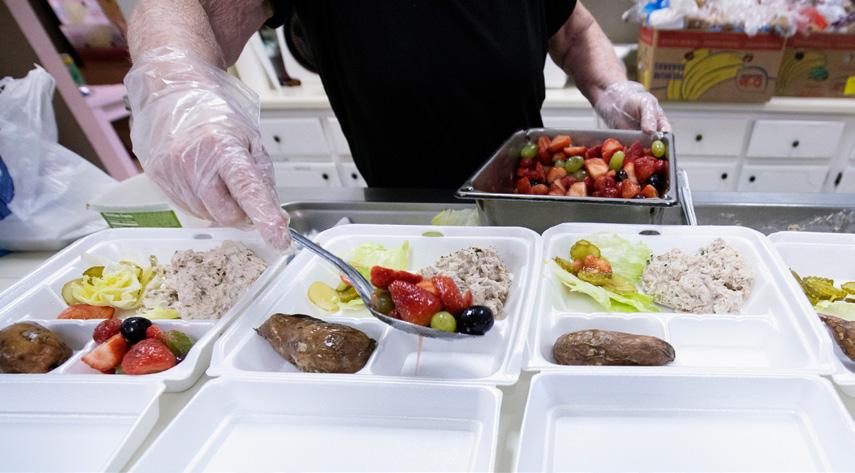


THE HUNGRIEST STATE
Though widespread in the Mississippi Delta, food insecurity isn’t region exclusive. It happens anywhere people can’t reliably afford or access nourishment. And unfortunately, it widely affects households across the Magnolia State.
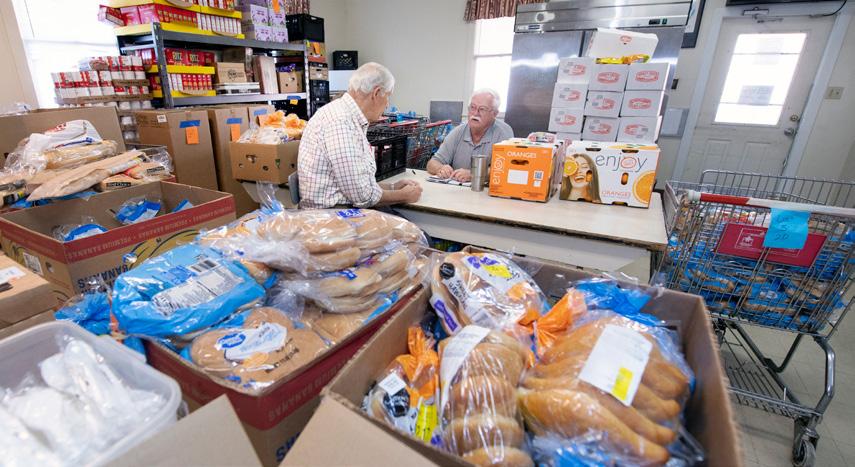
Recent reports from Feeding America rank Mississippi as the most food insecure state, with 1 in 6 residents facing hunger. Mississippi State University’s Television Center is striving to bring attention to this problem through “The Hungriest State,” an awardwinning, four-episode docuseries.

The series, which received a national James Beard Award nomination, looks at how hunger affects different parts of the state and what Mississippians are doing to help. Produced in conjunction with MSU’s Office of Public Affairs, it is part of the high-end production initiative MSU Films.
The pilot episode, “The Last Supermarket,” includes Charlie Estess and explores how a rural town is affected after the loss of its last major grocery store. This series premiere earned a national Edward R. Murrow award for News Documentary. Episodes three and four, “The Domino Effect,” and “The Fisherfolk,” brought home 2022 Southeast Emmy awards.
For more information or to watch the series in its entirety, visit www.films.msstate.edu
ALUMNUS.MSSTATE.EDU 49
Alumni Awards, & Leadership Conference
The MSU Alumni Association serves more than 158,000 living alumni of Mississippi State University who share the same love and devotion to the institution as the first three graduating classes that formed the alumni association in 1885. This loyalty and passionate spirit of service and accomplishment displayed by many graduates over time is saluted annually during the MSU Alumni Awards Banquet.
Alumni and friends gathered in April for campus ceremonies that honored the university’s 2022 National Alumnus, college Alumni of the Year, the 2021 Outstanding Young Alumnus, and the 2021 Distinguished Service Award recipients.
For commemorative videos and photos, visit www.alumni.msstate.edu/banquet or the Alumni Association’s Facebook page at facebook.com/msstate.alumni.

50 FALL 2022 ALUMNI News
~ 2022 ~
Cleveland
NATIONAL ALUMNUS
Born and raised in a rural community outside Union by Billy James and Billie Jean Cleveland, Randy was the youngest of three boys. As part of a close family, he enjoyed the outdoors and sports but also loved math and science from an early age. He received strong support and encouragement from his mom and dad, and pursued his passion to become an engineer.
A star student, Randy was also a stand-out athlete. He was a starter for Decatur High School in football, basketball and baseball and was named Most Athletic his senior year when the teams made the state playoffs in all three sports. He played tight end for the undefeated championship football team.
When Randy graduated from Decatur High School as valedictorian in 1979, he had athletic scholarship offers to continue playing football. But the Newton County native could not be swayed from his path toward the greatest engineering school in the South at Mississippi State. He completed his pre-engineering studies at East Central Community College in Decatur before heading north to achieve his academic goals at MSU.
At MSU, Randy was a member of the Tau Beta Pi and Pi Epsilon Tau honor societies and was an officer in the student chapter of the Society of Petroleum Engineers. As a senior, he was inducted into the MSU Engineering Student Hall of Fame.
Randy met Nina Ward in her hometown of Demopolis, Alabama, in 1981. The couple married two years later, just before Randy’s final semester at MSU, and made their home in University Village student housing as newlyweds.
He graduated in December 1983 and the couple moved to New Orleans, where Randy served as an engineering consultant for Arthur Andersen. In 1984, he began his career with Exxon where he held a variety of technical and operational assignments for the Gulf of Mexico and Gulf Coast region.
L-R: Randy Cleveland and President Mark E. Keenum
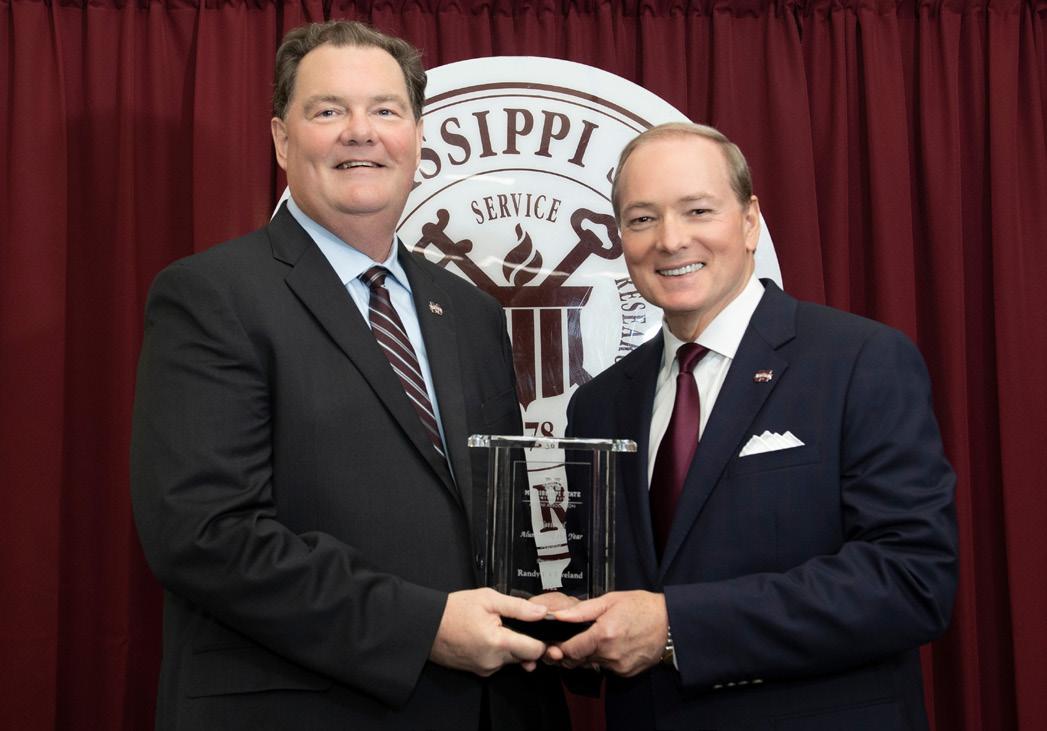
His progressive career positioned Randy at the helm of operations across the company, enabling him to lead at locations throughout the United States and abroad.
Following the 1999 merger of Exxon and Mobil, Randy and Nina moved to Aberdeen, Scotland, where he assumed the role of operations manager for the company’s North Sea business. The Clevelands moved to London, England in 2004, where Randy served as the joint interest manager for ExxonMobil’s Europe Region, overseeing the company’s largest production business unit.
Having grown up in rural Mississippi, he said he is grateful for the opportunities he had in his career to work and live abroad, gaining greater perspectives and unforgettable memories such as hosting Princess Anne of the royal family.
In 2006, the couple returned state-side to Houston, Texas, where Randy managed the ExxonMobil Production Co. U.S. portfolio. He led the organization to its best-ever safety and environmental performance and received the U.S. Federal Offshore Distinguished Performance Award, a first for ExxonMobil.
After leading the merger integration of XTO Energy Inc., the largest U.S. gas producer, into ExxonMobil Corp. in 2010, Randy became president of XTO, headquartered in Fort Worth, Texas.
In 2016, he was named vice president Americas for ExxonMobil Production Co. responsible for businesses spread across the U.S. and Canada and new ventures in Guyana, Brazil and Argentina. He served in that role until his retirement in 2019.
Throughout his 35-year career, Randy has been an exemplary leader. He has served on over 30 boards of directors for ExxonMobil subsidiaries and affiliates, as well as the Texas Oil and Gas Association executive board, America’s Exploration and Petroleum Board, America’s Petroleum Institute Upstream Committee and the Texas Parks and Wildlife Foundation board. He was appointed by the Governor of Colorado as co-chair of an Oil and Gas Environmental Task Force, seeking solutions for balancing environmental and societal considerations with oil and gas operations.
Leveraging his career to foster a broader impact in the community, Randy secured company sponsorships for activities such as Introduce a Girl to Engineering Day, Habitat for Humanity projects and the Iditarod. He also served on the Fort Worth City business leadership round table.
His life and career have taken he and Nina all over the world and provided opportunities for many incredible experiences including seeing Australia’s Great Barrier Reef, the
ALUMNUS.MSSTATE.EDU 51
NAMED 2022
beaches of Normandy and many others. Yet, throughout the years and miles traveled near and far, Randy has always maintained a strong connection with his alma mater.
He was instrumental in the 2014 reestablishment of MSU’s petroleum engineering program, and the following year, he and Nina established an endowed professorship within the program to ensure its continued success. The couple has invested in areas across MSU and the Bagley College of Engineering, including an endowed scholarship and several other scholarships and funds supporting undergraduate research and other programs.
In 2020, the Clevelands expanded their support at MSU with a gift to establish of the Randy J. Cleveland Engineering Student Center. The gift enables a complete renovation of the former Materials Testing Laboratory to serve as a comprehensive, state-of-the-art student services center. The center will enrich learning experiences for generations of aspiring engineers and further cements the Clevelands’ legacy at MSU.
Beyond financial investments, Randy has dedicated his time and service to Mississippi State as volunteer, advocate and mentor. He is a member of the MSU Foundation board of directors, where he leads the fundraising committee as chairman, and serves on the dean’s advisory council for the Bagley College. Randy also serves as a mentor for students through the Bulldog Network and has served as a guest speaker on several occasions.
For his outstanding contributions, Randy was recognized as a Distinguished Engineering Fellow for the Bagley College of Engineering in 2008 and was named the college’s Alumnus of the Year in 2019. He also was recognized as the 2019 Alumnus of the Year for East Central Community College.
Randy and Nina are fully enjoying retirement in Fort Worth when they’re not visiting their Estes Park, Colorado, home. Regardless of location, he continues to uphold and share his loyal Bulldog spirit. A leader in his personal and professional endeavors, he is an excellent role model for current and future generations of the Bulldog family.
Mississippi State University is grateful for the opportunity to honor Randy and the accomplishments he has reached along his own journey as a respected leader and dedicated servant, and as the 2022 National Alumnus of the Year. n
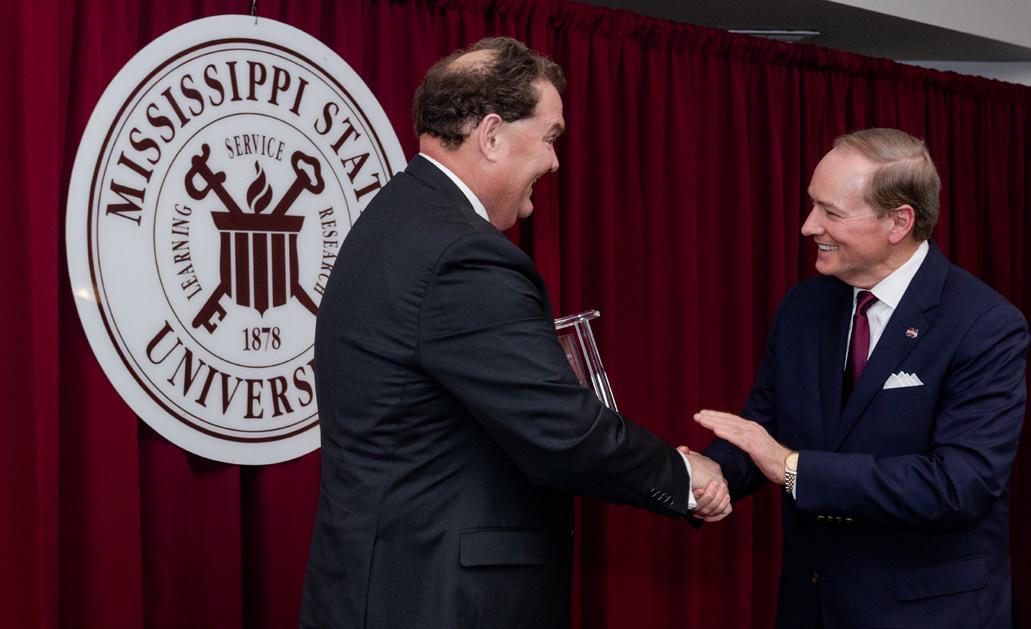
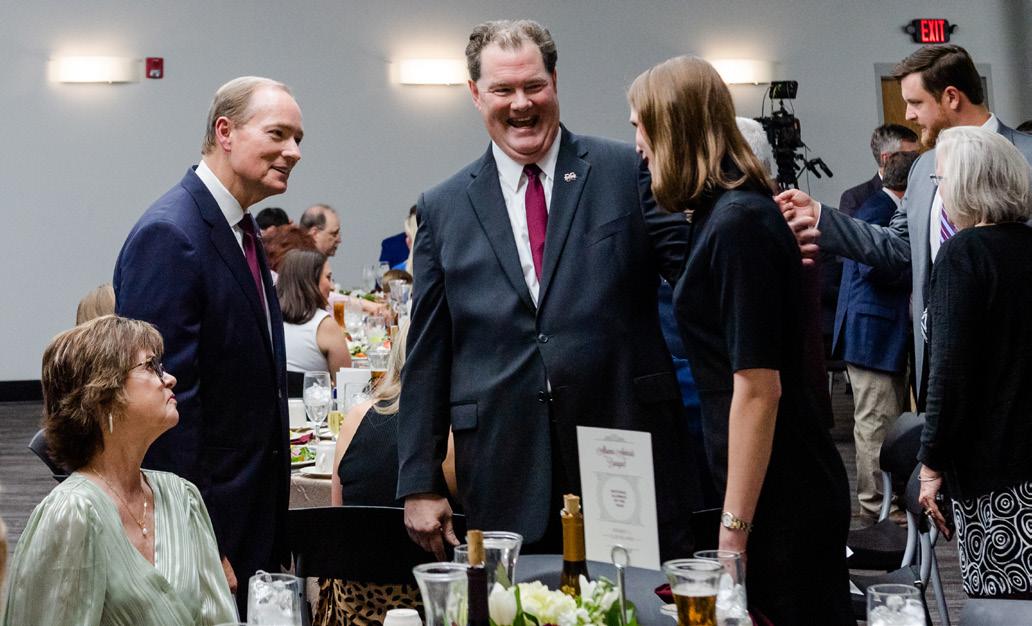

52 FALL 2022
ALUMNI News
Alumni of the Year
Mississippi State University’s eight academic colleges selected an impressive group of Bulldogs as their 2022 College Alumni of the Year. These individuals are recognized for their many accomplishments and the Bulldog spirit they embody in their personal and professional lives.

COLLEGE OF AGRICULTURE AND LIFE SCIENCES
Daniel Bruce “Dan” Batson of Perkinston comes from a family steeped in horticulture and his GreenForest Nursery has become a model for the industry. A third-generation Bulldog and horticulturist, Batson followed the footsteps of his father and grandfather. He completed both bachelor’s and master’s degrees in ornamental horticulture at MSU in 1980 and 1982, respectively. He founded
GreenForest Nursery in 1983 on land that has been in the Batson family for two centuries. Serving as president and CEO, he has positioned GreenForest Nursery as one of the most progressive green-industry businesses in the country. Batson is an avid leader in his profession and community and has received numerous awards throughout his career, including being named the 2010 Swisher Sweets Mississippi Farmer of the Year and the 2013 Nursery Management Magazine Grower of the Year.
COLLEGE OF ARCHITECTURE, ART AND DESIGN
For the last 25 years, Angela Roberts Cavaluzzi has led and shaped the transformation of New York City as a public official, public architect and city maker. She has been directly involved in some of the most impactful development projects in the city’s history, including Hudson Yards, the
World Trade Center, and the High Line, among others. She has served as a New York City planning commissioner and as director of the Mayor’s Office of Capital Project Development, where she oversaw and supported a $1 billion plus portfolio of mayoral priority capital projects. In 2016, she assumed her current role of president of the Hudson Yards Development Corp. The Long Beach native holds a 1982 Bachelor of Architecture from MSU and also earned a master’s degree from Columbia University.
COLLEGE OF ARTS AND SCIENCES
Dr. A. Randle “Randy” White of Greenwood is a 1966 chemistry and pre-medicine graduate who has positively impacted countless lives throughout his career. White completed his medical degree from the University of Mississippi School of Medicine, where he served as an assistant professor of medicine for eight years before beginning
ACADEMIC COLLEGES RECOGNIZE
ALUMNUS.MSSTATE.EDU 53
FRONT (L-R): Regina Sanford, Randy Cleveland, MSU President Mark E. Keenum, Angela Roberts Cavaluzzi. BACK (L-R): Curtis Hopkins, Daniel Batson, Dr. A Randle White, Mark Akin, Don Whitmire Jr.
his private nephrology practice in 1983. He founded Delta Hills Nephrology Associates, PLLC in Greenwood and continues to serve as managing member. White also is considered a pioneer for bringing dialysis to the Mississippi Delta, having established dialysis facilities in seven counties where the treatment was previously unavailable. He has served on countless professional and community boards over the years and is a proud supporter of MSU, where he provides opportunities for current and future Bulldogs in the health professions industries. White and his wife are very proud of their three daughters, Allison Seymour, Ashley Pittman and Dr. Rachael Faught. Allison and Rachael are both MSU alumnae.
COLLEGE OF BUSINESS
C. Donald “Don” Whitmire Jr. recently retired as vice president, controller, financial reporting and principal accounting officer of Freeport-McMoRan, Inc., the world’s largest publicly traded copper company. Prior to joining Freeport-McMoRan in 1989, he worked in the energy audit practice of Arthur Andersen specializing in the oil and gas industry and serving on the firm-wide Oil and Gas Industry Team. A 1978 accounting alumnus, Whitmire graduated with special distinction and served as president of the student honors council. Over the years, he has maintained strong connections with his alma mater through dedicated support and service, including being an active member of the Adkerson School of Accountancy advisory council for more than 20 years. For his outstanding service and commitment, Whitmire was honored as an Alumni Fellow for the College of Business in 2010 and was named among the Top 100 Alumni during the college’s Centennial Celebration in 2015. He and his wife reside in Scottsdale, Arizona, and have three sons who are MSU graduates.
COLLEGE OF EDUCATION
Regina Sanford of Aberdeen has more than 30 years of public school experience as a teacher and administrator across multiple states. The Laurel native earned bachelor’s and master’s degrees from the University of Southern Mississippi before completing a
doctorate in secondary education at MSU in 1991. In addition to public school, she has also taught as an adjunct professor at the University of St. Thomas in Houston, Texas, and at the University of Southern Mississippi. She has also served as a consultant for the Texas Educational Agency Region IV program. Sanford retired in 2019 as assistant superintendent of curriculum and instruction for St. Tammany Parish Schools. An active member of the Alumni Association, she is proud to give her time and support to Mississippi State because she values the quality education and programming offered by the land-grant institution.
JAMES WORTH BAGLEY
COLLEGE OF ENGINEERING
Dr. Allen K. Sills of Franklin, Tennessee, is pioneering a career that combines his educational background with his lifelong love of sports as chief medical officer for the NFL. He also serves as a professor of neurological surgery at Vanderbilt University Medical Center and as the founder and co-director of the Vanderbilt Sports Concussion Center. The Starkville native graduated summa cum laude in biological engineering from MSU in 1986, and went on to complete his medical degree, residency training and an NIH-funded neuro-oncology fellowship at Johns Hopkins University School of Medicine. A fellow of the American Board of Neurological Surgery and the American College of Surgeons, Sills previously founded the Memphis Regional Brain Tumor Center. He is an active community leader who has served on numerous boards, including the MSU Foundation board of directors, and continues to serve as the neurosurgery consultant for all Mississippi State athletic teams.
COLLEGE OF FOREST RESOURCES
Curtis Hopkins of Flora is a two-time MSU graduate, earning a bachelor’s in forestry in 1971 and a master’s in wildlife ecology in 1973. He also holds a doctoral degree in wildlife sciences from Texas A&M. Hopkins began his career as an assistant ranger and wildlife biologist for the U.S. Forest Service and later joined Ducks Unlimited, where
he held progressive leadership roles. From 2007 until his retirement in 2013 he served as director of the Southern Region that encompassed 13 states. Hopkins was then executive secretary for the Southeastern Association of Fish & Wildlife Agencies where he worked with 15 state fish and wildlife agencies, Puerto Rico and the U.S. Virgin Islands to promote wildlife and fish conservation until last March. His career achievements have been distinguished with many awards over the years, including the Mississippi Wildlife Federation’s 2009 Conservationist of the Year and SEAFWA’s 2017 National Blue-Winged Teal Award. At MSU, Hopkins has served on the dean’s advisory board for the College of Forest Resources is a member of the Wildlife, Fisheries, and Aquaculture advisory board. In 2006, he was honored as the college’s Alumni Fellow.
COLLEGE OF VETERINARY MEDICINE
Dr. Mark Akin of Collierville, Tennessee, always knew he was destined to be an equine veterinarian. After earning a bachelor’s degree in animal science from MSU in 1982, he went on to complete his Doctor of Veterinary Medicine from the university’s College of Veterinary Medicine in 1986. After graduation, Akin practiced on the Thoroughbred Racetracks of Maryland, where he was lucky enough to have four Kentucky Derby runners, six Preakness Stakes runners and five Belmont Stakes runners. He later opened Akin Equine Veterinary Services in Collierville, where he specializes in providing equine ambulatory practices. He credits MSU’s top quality education with preparing him for success in his career. The Shannon native helps advance his industry through membership in organizations including the American Veterinary Medical Association, American Horse Council and the American Association of Equine Practitioners, among others. He is also a loyal supporter of his alma mater. After 36 years of equine practice, he still loves what he does and says the best part of his job is helping make the dreams of horse owners and trainers come true. n
54 FALL 2022 ALUMNI News
TWO VOLUNTEERS RECEIVE Service Awards
The Distinguished Service Award annually recognizes individuals who have displayed outstanding volunteer and leadership efforts within their local alumni chapter. Their efforts are essential in upholding the mission of the Alumni Association and also bring favorable recognition to the university. Two dedicated alumni are recipients for 2021.
Creath Edens Townsend of Mobile, Alabama, has maintained strong connections with her alma mater throughout her life. She has been an active member and longtime board leader of the Mobile-Baldwin County, Alabama Alumni Chapter since 1998, serving on various committees and as president for the last several years.
Dedicated to helping fellow Bulldogs stay connected to MSU, Edens Townsend has hosted numerous watch parties for MSU athletic events and send-off parties for local students. She also helped organize virtual events to maintain chapter involvement and fellowship during the COVID-19 pandemic. As president, she orchestrated the push to include and engage Baldwin County alumni with the former Mobile chapter, growing the organization’s reach and potential. Edens Townsend is also an active member of the Alumni Association’s Alumni Recruiting Network and serves on the chapter’s scholarship committee to ensure financial support for aspiring students in her area.
Outside her alumni involvement, Edens Townsend is an active volunteer at her kids’ school, a sustainer of the Junior League of Mobile and a former member of the board of directors and host for the Distinguished Young Women program.
She earned a bachelor’s degree from MSU in elementary education in 1985. During her time as a student, she was an active member of the Famous Maroon Band’s Flag Line, serving as captain for two years under Kent Sills. She also played the clarinet in the university Concert Band.

Edens Townsend has been instrumental in the success of her alumni chapter and encourages everyone to get involved with
their alumni chapters “because it’s a link to your foundation and you never know where it could take you.”
Joe Abston of Pascagoula, better known as “BullDawg Joe” was True Maroon through and through. He completed a Bachelor of Accounting and Master of Professional Accountancy at Mississippi State University, where he was involved with intramural sports, residence hall order, and the Baptist Student Union.
In 1994, he began working for Jackson County Port Authority of Pascagoula where he served as the manager of finance and administration for 27 years. Abston was passionate about helping others and making his community a better place. He served the City of Pascagoula as councilman for three terms, volunteered his time and service with many organizations, served as the announcer and clock operator for local sporting events for 25 years, and was the beloved community Santa Claus.

A devout member of the Mississippi Gulf Coast Alumni Chapter, Abston held various leadership positions within the chapter since 2016. For more than a decade, he spearheaded scholarship efforts on the Mississippi Gulf Coast, serving on the scholarship committee since 2009 and also chairing the committee from 2011 to 2021. Abston also was instrumental in organizing the first drawdown in 2013, which has remained the chapter’s most successful annual fundraiser event. He was always one to step up and volunteer for efforts including highway cleanup, Road Dawg events and letter writing, among others.
When Abston lost his battle with COVID-19 last year, his wife Missy, a fellow MSU graduate who earned a bachelor’s degree from the College of Education in 1992, and other members of the Gulf Coast MSU Alumni Chapter hosted a drive-in vaccine clinic in Abston’s memory. More than 60 shots were given to help protect members of his community. An exemplary alumnus and member of his community, Abston’s legacy of service and loyalty will live on through his forever Maroon and White spirit. n
ALUMNUS.MSSTATE.EDU 55
Distinguished Service awardee Creath Edens Townsend and Patrick White, national president
Abston
ASSOCIATION SALUTES
Outstanding Alumni Chapters
The MSU Alumni Association honored high-achieving chapters in May during the Chapter and Volunteer Awards Reception on campus. Developed to encourage and promote leadership, chapter membership and chapter engagement activities, the Chapter Recognition Program awards outstanding chapters each year according to their membership and achievement within the Honor Chapter Point System. Of the 90 chapters that make up the MSU's Alumni Association, 48 were honored during the reception.
Honor Chapters
Adams-Franklin-Wilkinson
Attala County
Baton Rouge, LA Birmingham, AL
Bolivar County Clay County
Greater Chattanooga, TN Dallas, TX
DeSoto County
Greater Fort Worth, TX
Grenada-Montgomery
Huntsville-Decatur, AL Lauderdale County Lee County
Leflore-Carroll
Lincoln County Mississippi Gulf Coast
Memphis, TN
Mobile, AL
Monroe County
Greater New Orleans, LA Newton County Northeast Florida Pine Belt Rocky Mountain Colorado
Smoky Mountain Tennessee South Texas Southwest Mississippi Greater Tampa, FL Warren County Washington County Washington D.C.
Yazoo County
Gold Chapters
Atlanta, GA
Leake County
Oktibbeha County
Greater Orlando, FL
Sharkey-Issaquena
Silver Chapters
Clarke County George-Greene
Greater Houston, TX
Lowndes County Northwest Florida
Bronze Chapters
Central Mississippi
East Texas
Nashville, TN
Panola-Tallahatchie
Simpson-Smith
Special recognition was also given to chapters and respective alumni leaders in the following categories for their innovative efforts to better serve the MSU alumni base.
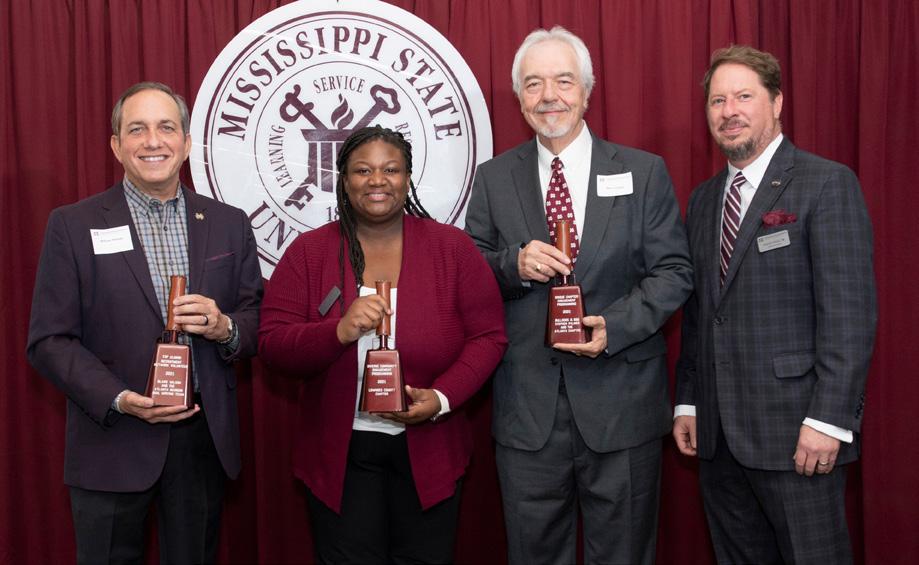
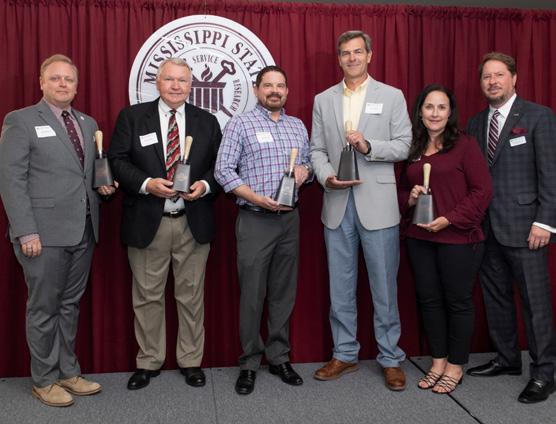


Top Alumni Recruitment Network Volunteer
Blaire Wilson and the Atlanta, Georgia Maroon Mail Writing Team
Unique Chapter Engagement Programming
Bulldogs & BBQ – Stephen Palmer and the Atlanta, Georgia Chapter
Diverse Community Engagement Programming
Lowndes County Chapter
56 FALL 2022 ALUMNI News
Gold Silver Bronze
PRICE NAMED Outstanding Young Alumnus
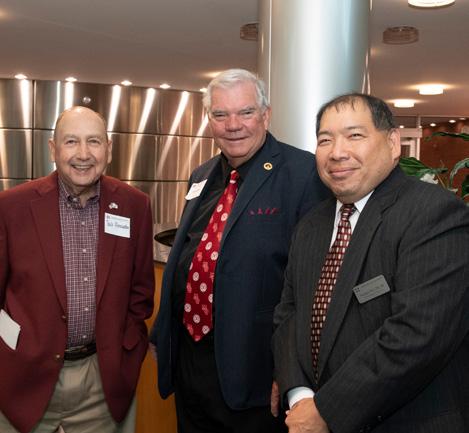
The MSU Alumni Association annually honors the university’s most outstanding young alumnus or alumna. For his professional leadership and service achievements, Walker Price of Germantown, Tennessee, has garnered the honor of 2021 Outstanding Young Alumnus.
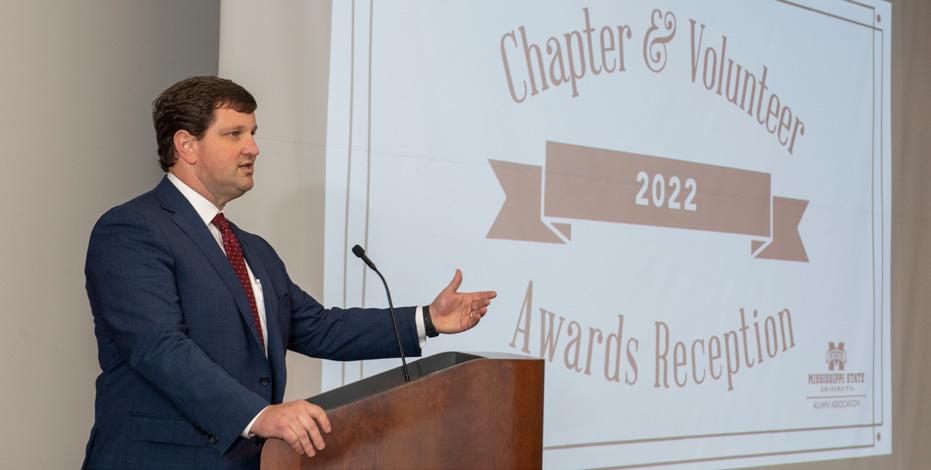
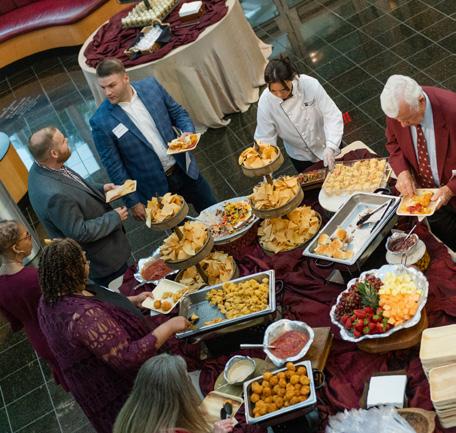
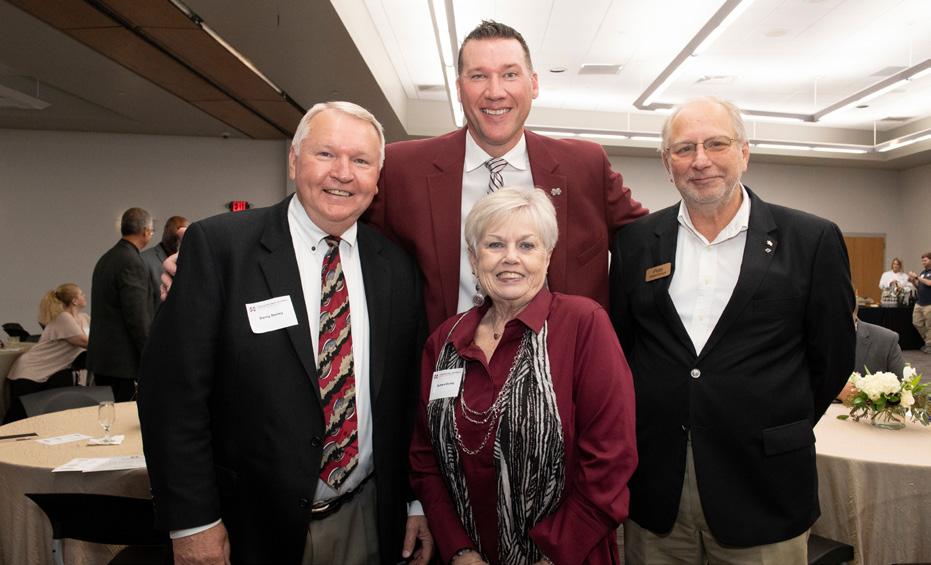
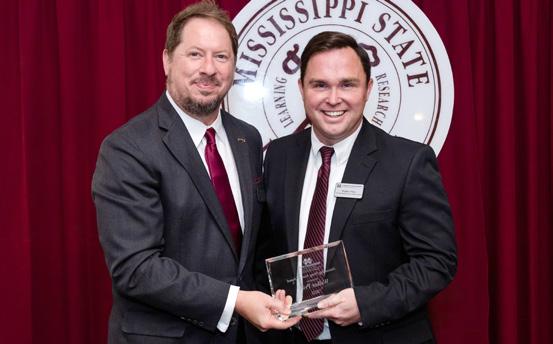
A native of Nashville, Tennessee, Price graduated from MSU in 2011 with a bachelor’s degree in communication. As a student, he was involved in Greek life and served on the Old Main Festival committee and campus activities board.
After graduation, Price relocated to Germantown where he serves as a sales and marketing professional for Airheads/Mentos and is a dedicated member of the Memphis Maroon Club. He has served on the club’s board of directors since 2012, chairing both the social and golf fundraiser committees.
An asset to the Memphis Maroon Club’s efforts over the years, Price regularly volunteers his time with fellow alumni to build support for areas including the Salvation Army, St. Jude and Le Bonheur children’s hospitals, and the West Cancer Center, as well as the club’s annual Christmas toy drive and scholarship awards. During the COVID-19 pandemic, Price was integral to the club’s connectivity and outreach, boosting its social media presence and implementing remote meetings and events, which included a virtual 5K fundraiser.
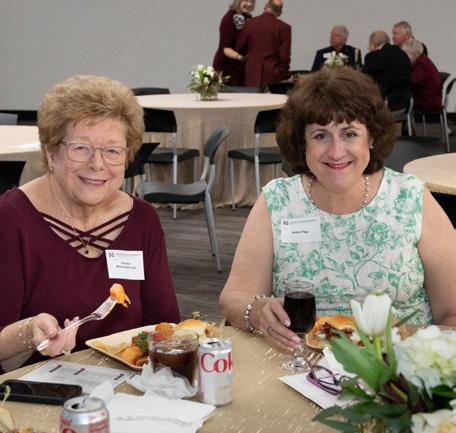
He also is an active member of the Bulldog Club, the Alumni Recruiting Network and the Young Alumni Advisory Council. For his outstanding service, Price was earlier honored by the Memphis Maroon Club with the 2018 Distinguished Service Award and the 2017 Young Alumnus of the Year Award. n

ALUMNUS.MSSTATE.EDU 57
Patrick White, national president, and Walker Price
Following 2021’s virtual Leadership Conference, the MSU Alumni Association was eager to welcome alumni volunteers back to campus for the annual event in May. Aiming to educate, empower and celebrate volunteer members and leaders of the association, the conference provided valuable networking and idea-sharing opportunities through interactive activities including information exchange breakout sessions. In addition to new alumni chapter officer orientation and the association’s annual business meeting, participants also heard updates from key university representatives and other staff and volunteer leaders. A special presentation discussing the Young Alumni Program, Bulldog Network and Alumni Recruitment Network highlighted important ways for volunteers to engage and grow their outreach.

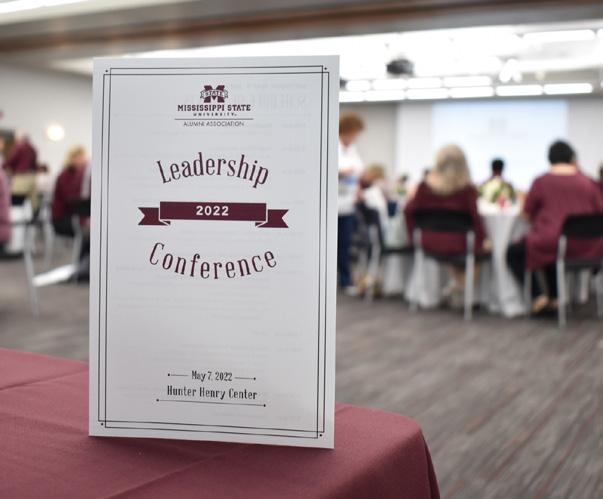
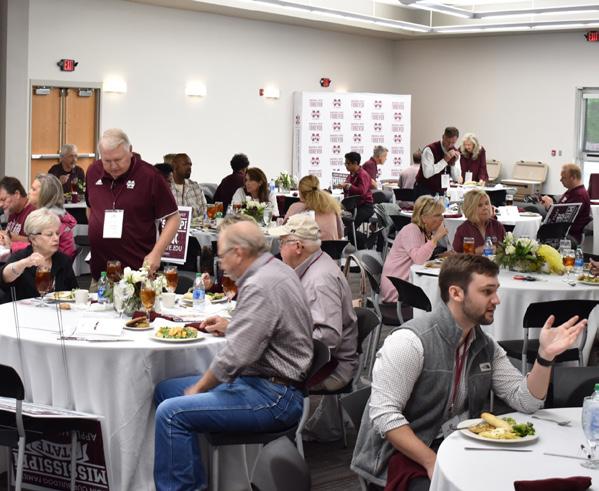
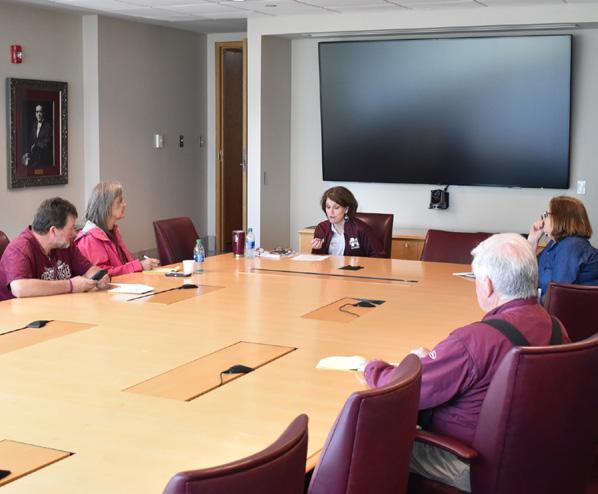

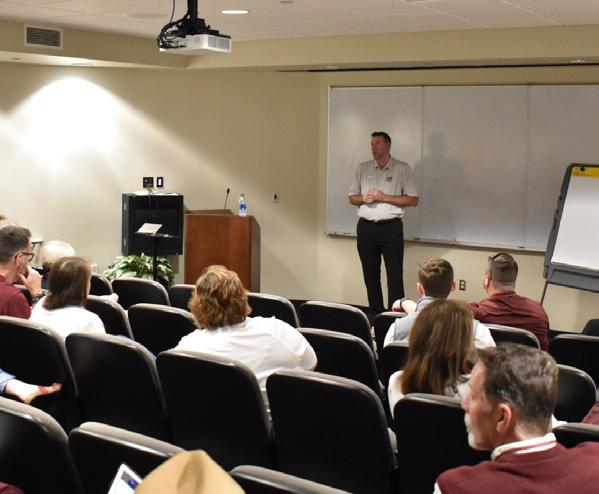
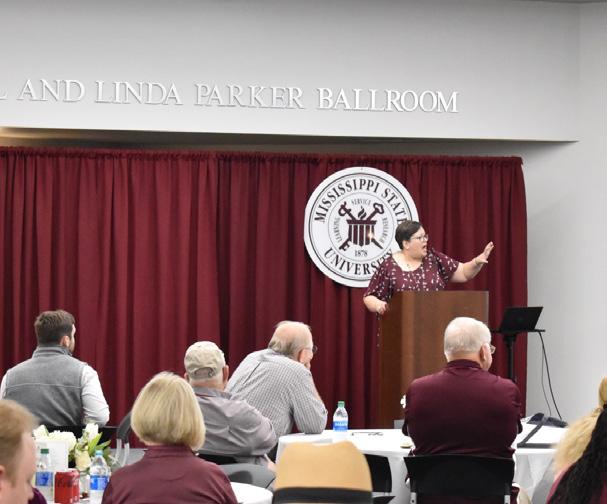
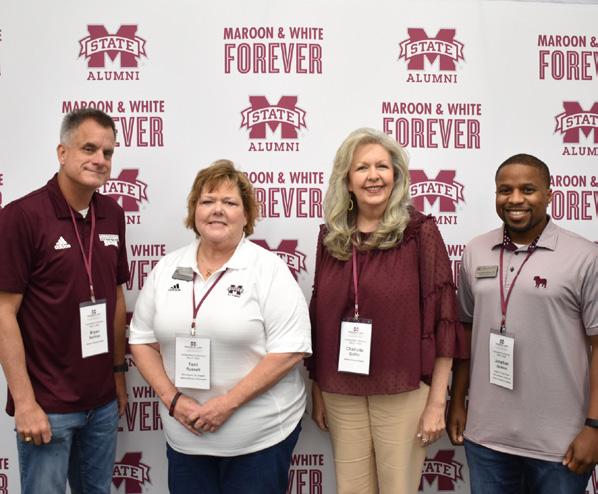
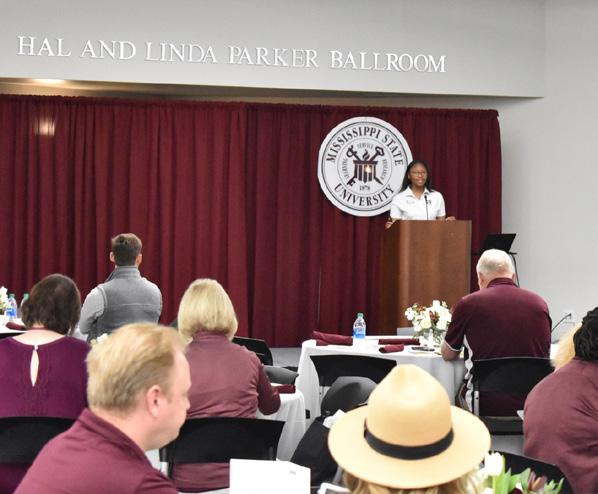

58 FALL 2022 ALUMNI News
2022 LEADERSHIP CONFERENCE
20
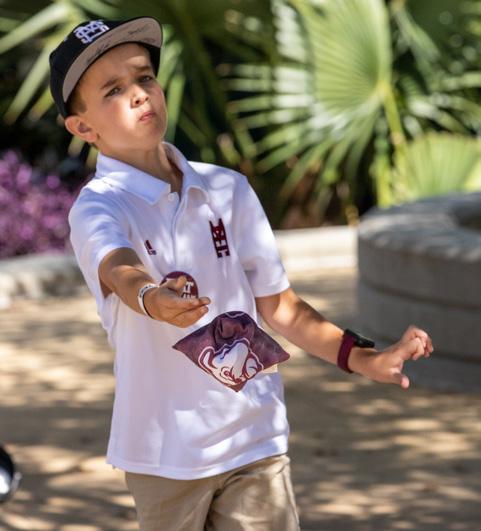
PA R TIES
Mississippi State University
The MSU Alumni Association enjoys welcoming alumni and friends back “home” to the Hunter Henry Center for the Official Alumni Tailgate this football season. To all of those who stopped by to visit and be a part of this special gameday tradition, we look forward to seeing you next year too!
Visit the Official Alumni Tailgate website at alumni.msstate.edu/ tailgate to learn more.
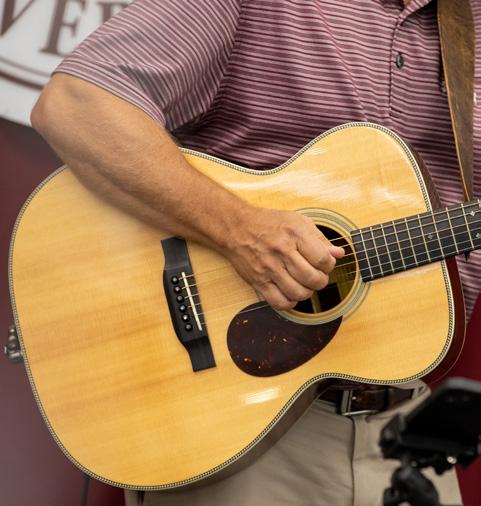
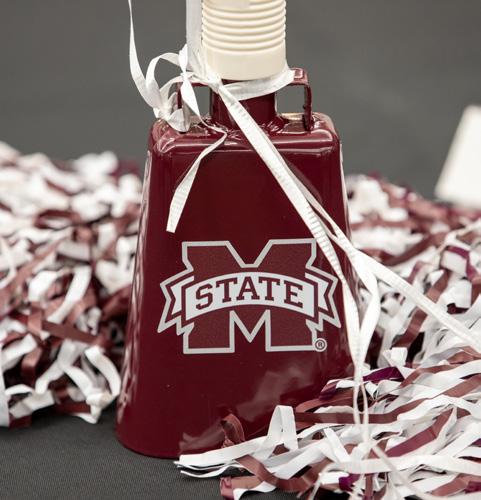
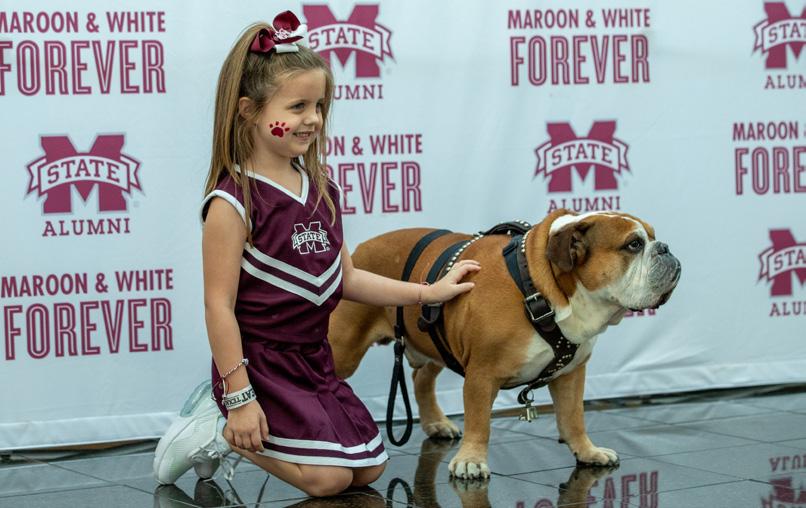
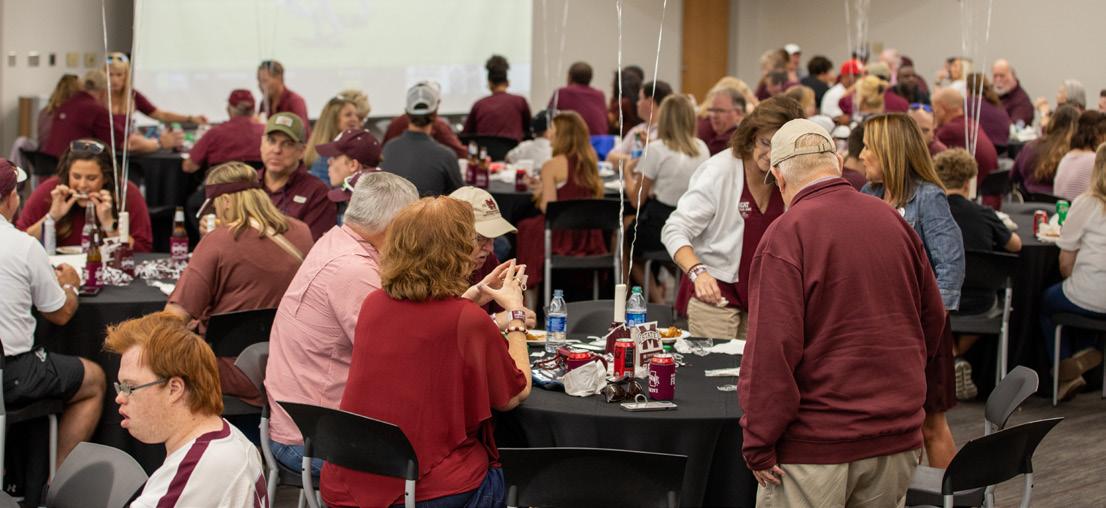

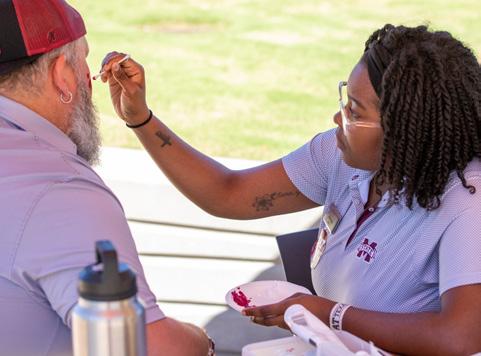

ALUMNUS.MSSTATE.EDU 59
ALUMNI ASSOCIA T ION
22
EMBARK ON AN
ADVENTURE
Grab your passport, we're going on a trip!
The MSU Alumni Association annually sponsors trips across the globe through the Traveling Bulldogs program. With a set number of reserved spots for each trip, be sure to book your 2023 destination today! By booking a trip through the Traveling Bulldogs program, you not only receive tailored itineraries with top-notch tour guides, but also are helping to support your MSU Alumni Association. If you would like to receive our monthly travel e-newsletter or learn more about upcoming trips, please visit www.alumni.msstate.edu/travel

60 FALL 2022 ALUMNI News
*All trips and dates are subject to change.
Visit our website for the most current information.
Traveling Bulldog 2023 Trips
JANUARY
Antarctica Discovery Dazzling Down Under Taste of the Caribbean and Panama Canal New Zealand and Circumnavigating the South Island
FEBRUARY
The Wolves and Wildlife of Yellowstone
The Galapagos Islands
Tahiti and French Polynesia Under Sail
MARCH
Victory in the Pacific Great Trains and Grand Canyons Egypt and the Eternal Nile
Hawaii Three Island Adventure Portrait of Italy
APRIL

Dutch Waterways
European Coastal Civilizations Historical Baseball
MAY
The Kentucky Derby Cruise the Heart of Europe Easy Company Village Life Dordogne Flavors of Northern Italy

JUNE
Stunning Scenery of Alaska: SEC Conference Cruise National Parks and Lodges of the Old West Great Journey Through Europe
JULY
Western Gems of the Emerald Isle
Discover the Canadian Rockies by Rail
AUGUST
Discover Southeast Alaska Kenya Safari: The Big 5
SEPTEMBER
Flavors of Sicily
Passions and Pursuits River Cruise: Southern France Insider’s Japan
OCTOBER
Landscapes and Lighthouses of Coastal Maine Gladiators to Gondolas Greek Isles and Turkish Riviera
Experience the Victory at the National WWII Museum
NOVEMBER
Polar Bears of Churchill Macy’s Thanksgiving Day Parade Holiday Markets Cruise
DECEMBER
Montreal and Quebec City Christmas Markets
Scan Me
ALUMNUS.MSSTATE.EDU 61
ALUMNI ASSOCIATION 2022-23 LEADERSHIP
The MSU Alumni Association welcomed its officers and directors for the national board for 2022-23. These individuals began terms July 1.
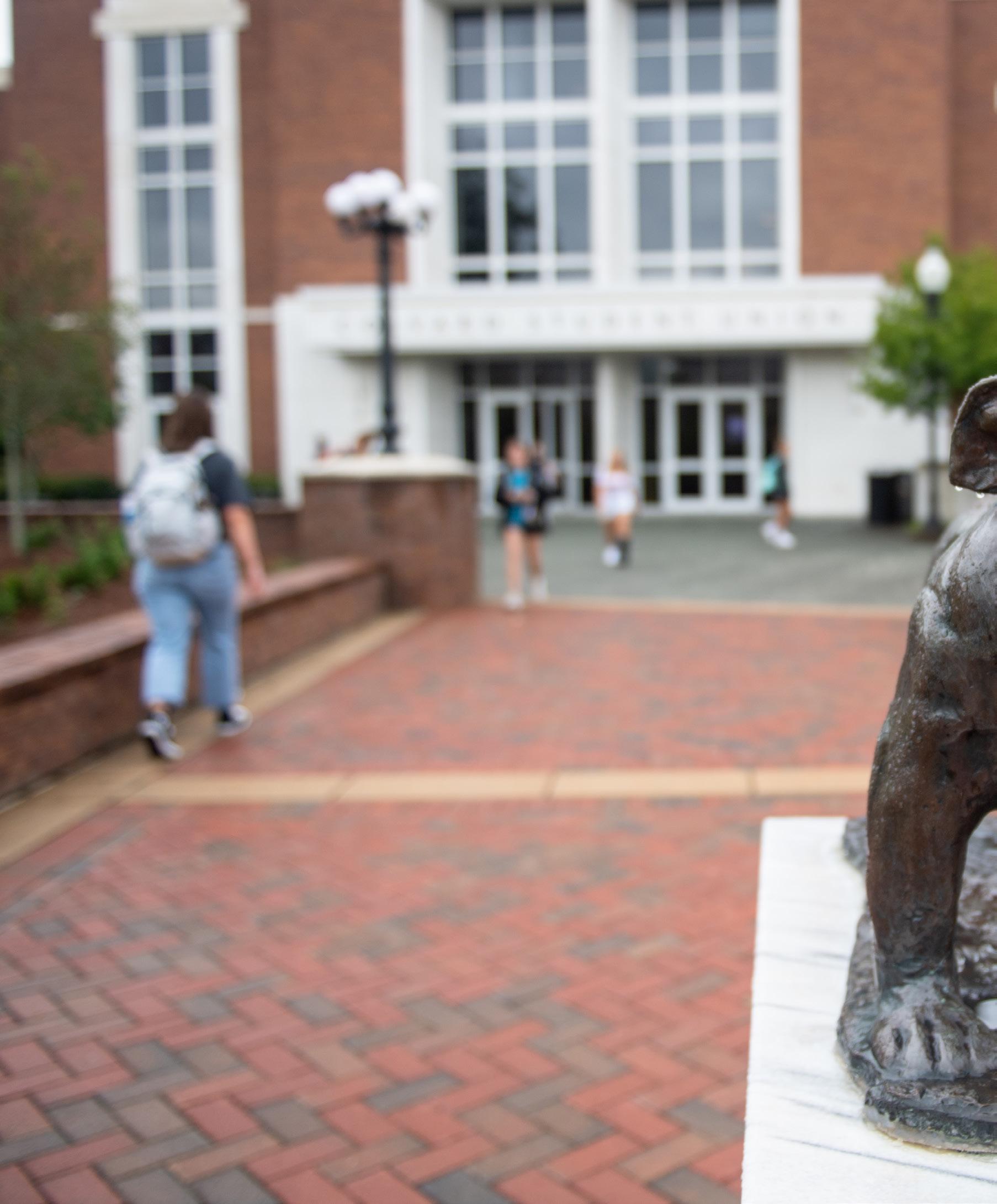
The association’s national officers continue in their roles for 202223. They are, Patrick White of Spring, Texas, a 1990 Bachelor of Arts in communication graduate, as president; Terri Russell of Helena, Alabama, a 1984 Bachelor of Science in industrial engineering and a 1986 Master of Science in industrial engineering graduate, as vice president; Riley Nelson of Vicksburg, a 1999 Bachelor of Accountancy and a 2001 Master of Taxation graduate, as treasurer; and Sherri Carr Smith of Gulfport, a 1986 Bachelor of Arts in communication graduate, continues as immediate past president.
The association also welcomed the following returning and new directors to its national board.
DIRECTORS RETURNING
TO THE BOARD :
Adrienne Morris (’05, ’07, ’10) of Columbus will return to serve a second term as Mississippi North Region 3 director. She serves the Lowndes County Alumni Chapter as president, having earlier been vice president. She has served MSU on the communication department advisory board and the Montgomery Leadership Program advisory board.
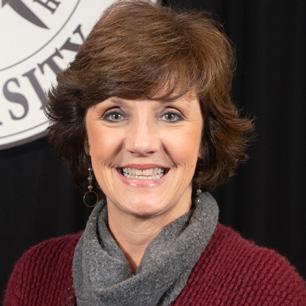

Crystal Jackson Vincent (’05) of Wylie, Texas, also will continue in a second term as director for the State of Texas. She most recently served as co-chair for Black Alumni Weekend 2020/2022, which raised over $53,000 in scholarships. She was active in the Birmingham, Alabama Alumni Chapter and served on the MSU Black Alumni Advisory Council.
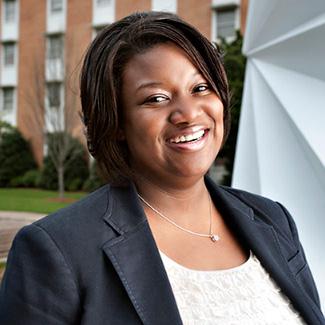
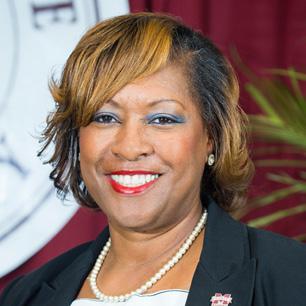
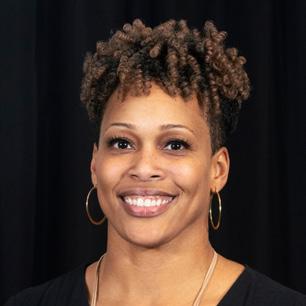
DIRECTORS JOINING THE BOARD:
A.D. Hunt Jr. (’70) of Hattiesburg will join the board as the representative of the former national presidents. The 2008-09 MSU Alumni Association national president, Hunt served on the Alumni Association’s board for several years and is a former officer and volunteer with the Pine Belt Chapter.
Connie Spells Raines (’85) of Conyers, Georgia, will join the MSU Alumni Association board as director for the State of Georgia. She chaired MSU’s Black Alumni Weekend in 2018, has previously served on the Atlanta, Georgia Alumni Chapter’s scholarship committee and is a member of the Black Alumni Advisory Council.
Jason Barrett (’01) of Starkville joins the board as president of the Robert Holland Faculty Senate. Barrett is an associate Extension professor at MSU, specializing in community development, economics and natural resources, and water and wastewater utilities.
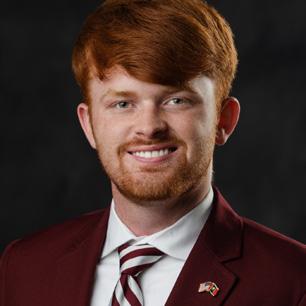
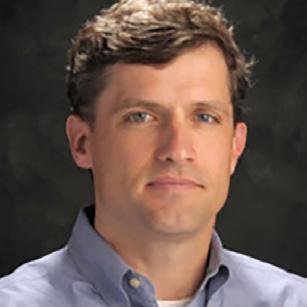
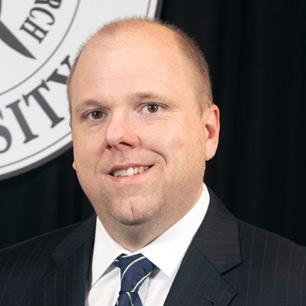


Kennedy Guest of Brandon joins the board as president of the MSU Student Association. He is a senior majoring in accounting and is a member of the Shackouls Honors College. This is Guest’s fourth year serving the student body within the Student Association.
The alumni association was founded June 17, 1885, by the first three graduating classes of the then Mississippi Agricultural and Mechanical College. A full-service organization, the association now includes over 100 chapters and clubs. Mississippi State currently has more than 158,000 living alumni. For more information about the MSU Alumni Association, contact Executive Director Jeff Davis at 662.325.7000 or jdavis@alumni.msstate.edu
62 FALL 2022 ALUMNI News
White
Russell
Nelson
Smith
Morris
Guest
Barrett
Raines
Hunt
Vincent

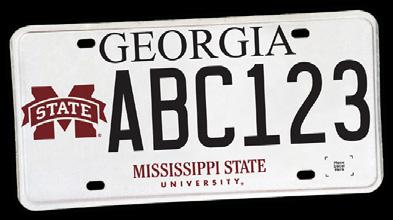


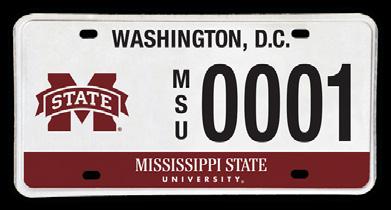

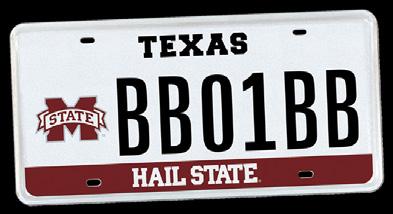
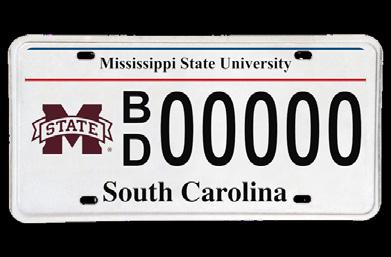


ALUMNUS.MSSTATE.EDU 63 For more information about purchasing a Mississippi State University car tag, please visit alumni.msstate.edu/cartag
Alumni Association ANNOUNCES STAFF CHANGES

Mississippi State University Alumni Association recently welcomed a new staff member to the team and placed two veteran staff members in new positions.
Incoming staff member Toria Carter serves as coordinator for student engagement. A second-generation MSU graduate, Carter hails from a family of Bulldogs. Her father, Greg Carter, played and coached basketball at MSU, and her brother Tyson also played Bulldog hoops. Carter’s mother Schreese is a former Alumni Association staff member who oversaw the Alumni Delegates student organization—a duty for which Carter is now be responsible, making the new position that much more special to the Starkville native and her family.
Carter earned bachelor’s and master’s degrees from MSU in 2016 and 2018, respectively. She went to work for the University of Georgia’s Career Center following graduation, and most recently served as a graduate recruiter for global consulting firm Protiviti in Atlanta, Georgia. In her role at MSU, Carter leads the Alumni Delegates and works with the group to connect with the student body to foster a long-lasting relationship with the alumni family. She specifically oversees programs such as Student Study Break, Senior Celebration, the Alumni Delegate Tuition Raffle, The Ring and Tradition Keeper programs, New Maroon Camp and Orientation.
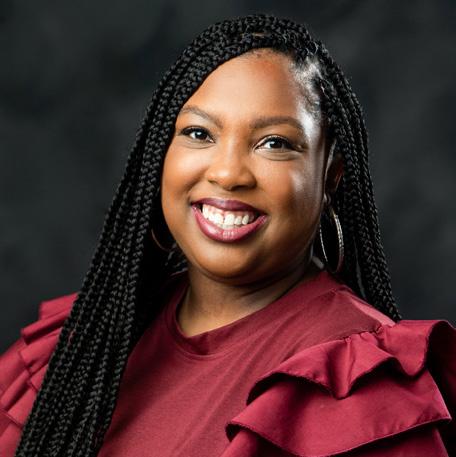
Longtime staff member Orly Hardin now serves as the organization’s associate director. Having served as the assistant director of alumni engagement and recruitment programs the past four years, she now oversees the coordination and direction of professional staff and provides leadership for young alumni
programs, alumni outreach and student engagement directives. Her responsibilities include coordinating student and alumni engagement through programs such as Alumni Delegates, the Bulldog Network, Alumni Career Initiatives and more.
Born in Michigan and raised in Atlanta, Hardin graduated from Emory University with a degree in psychology. She began her career at Mississippi State in 1998 in the Office of the Controller and Treasurer. She later served in various roles in the Office of Admissions and Scholarships. In 2007, Hardin joined the Alumni Association as an administrative assistant.
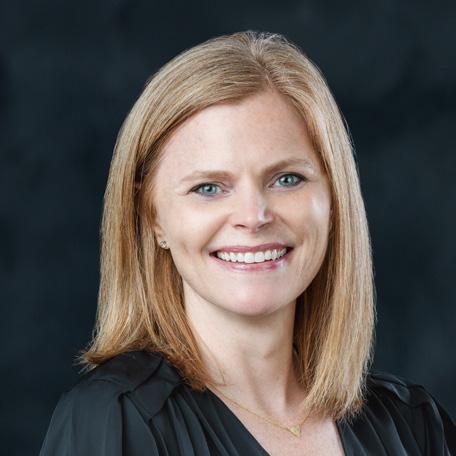
Fellow Alumni Association staff veteran Sykes Zimmerman also assumed a new role as coordinator of alumni engagement. In her new role, Zimmerman is responsible for the planning and coordination of the overall alumni base through events including the Official Alumni Tailgate, Alumni Fellows and College Alumni of the Year programs, Alumni Reunions and the Legacy Program. She also works closely with MSU Foundation staff to develop strategies and implement initiatives to grow alumni membership and participation.
Zimmerman joined the Alumni Association in 2017 as administrative assistant. She came to the association from the College of Veterinary Medicine, where she worked in the dean’s office.
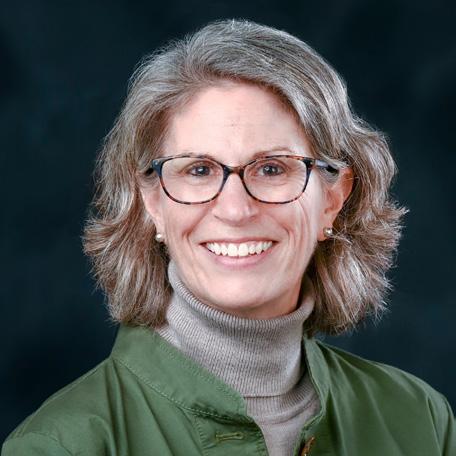
Before joining MSU, she spent a decade in administrative, management and customer service roles, including time as a financial service representative for Cadence Bank and a financial coordinator for McReynolds Orthodontics. She is an MSU graduate with a bachelor’s degree in university studies.
Learn more about the MSU Alumni Association's engagement opportunities and programs at www.alumni.msstate.edu or @MSStateAlumni on Twitter. n
64 FALL 2022 ALUMNI News
Toria Carter
Orly Hardin
Sykes Zimmerman
Alex K. Stowers, a senior business administration major from Guntown, won the 17th Alumni Delegate tuition drawing. For the fall 2022 semester at Mississippi State, Stowers received 12 credit hours of “free” tuition.
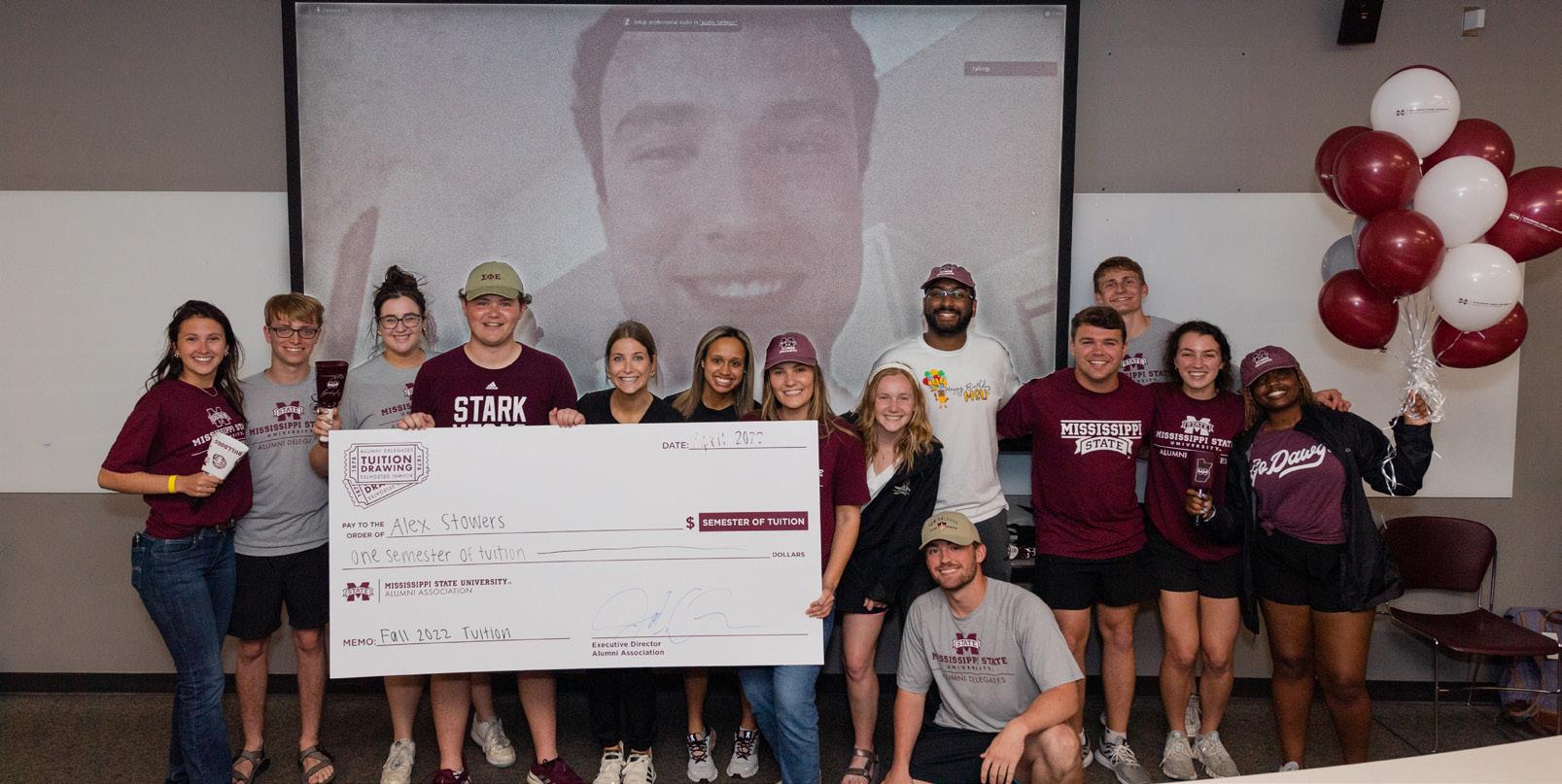
Stowers said he is grateful to the MSU Alumni Association and the Alumni Delegates for the generous gift. His ticket was one of more
Excellence in teaching, advising awards honor MSU faculty, staff
Three esteemed MSU faculty members earned special recognition from the Alumni Association as part of the universitywide 2022 Faculty Awards and Recognition Program. Jeff Davis, executive director of the MSU Alumni Association, presented the faculty and staff members with awards for outstanding teaching and mentorship of students throughout their academic careers. Recipients included:
Braden Leap, an assistant professor in the Department of Sociology in the College of Arts and Sciences, and Jake Shivley, an associate clinical professor in the Department of Clinical Sciences in the College of Veterinary Medicine received Graduate and Professional Teaching Excellence Awards.

John Ramirez-Avila, an associate professor in the Richard A. Rula School of Civil and Environmental Engineering in the James Worth Bagley College of Engineering, received the Outstanding Graduate Student Mentor Award.
than 3,500 sold, each offering an MSU student the chance to win one semester of free in-state tuition. Eligible students include any undergraduate enrolled full time at the university. During the spring semester, the Alumni Delegates raised $14,760 from ticket sales. Money raised beyond the cost of tuition support scholarships and priority programs within the Alumni Association.
ALUMNUS.MSSTATE.EDU 65
MSU SENIOR FROM GUNTOWN WINS ‘FREE’ FALL TUITION DRAWING
Alumni Association Executive Director Jeff Davis (second from left) is pictured with award recipients (L-R) Jake Shivley, John Ramirez-Avila and Braden Leap.
Tuition drawing winner Alex Stowers, center, a senior business administration major, is presented with a check by members of the MSU Alumni Delegates organization.




66 FALL 2022 ALUMNI News Attention Alumni-Owned Businesses, Eliminate Credit Card Processing Fees & Support Mississippi State University Impact by Ironwood offers the latest payment products, like IronChoice, designed to reduce or eliminate the cost of accepting credit cards with solutions to fit your business needs. • Countertop terminals • Contactless payments • Mobile payments • Online ordering & eCommerce • Point-of-sale options • Invoicing & text-to-pay • Recurring payments When you process your payments with Impact, we give a portion of our revenue to support Mississippi State University. Visit our website for a no-obligation consultation. Ironwood is a registered ISO/MSP with Merrick Bank, South Jordan, UT, and Fifth Third Bank, N.A., Cincinnati, OH. impactmsstate.com
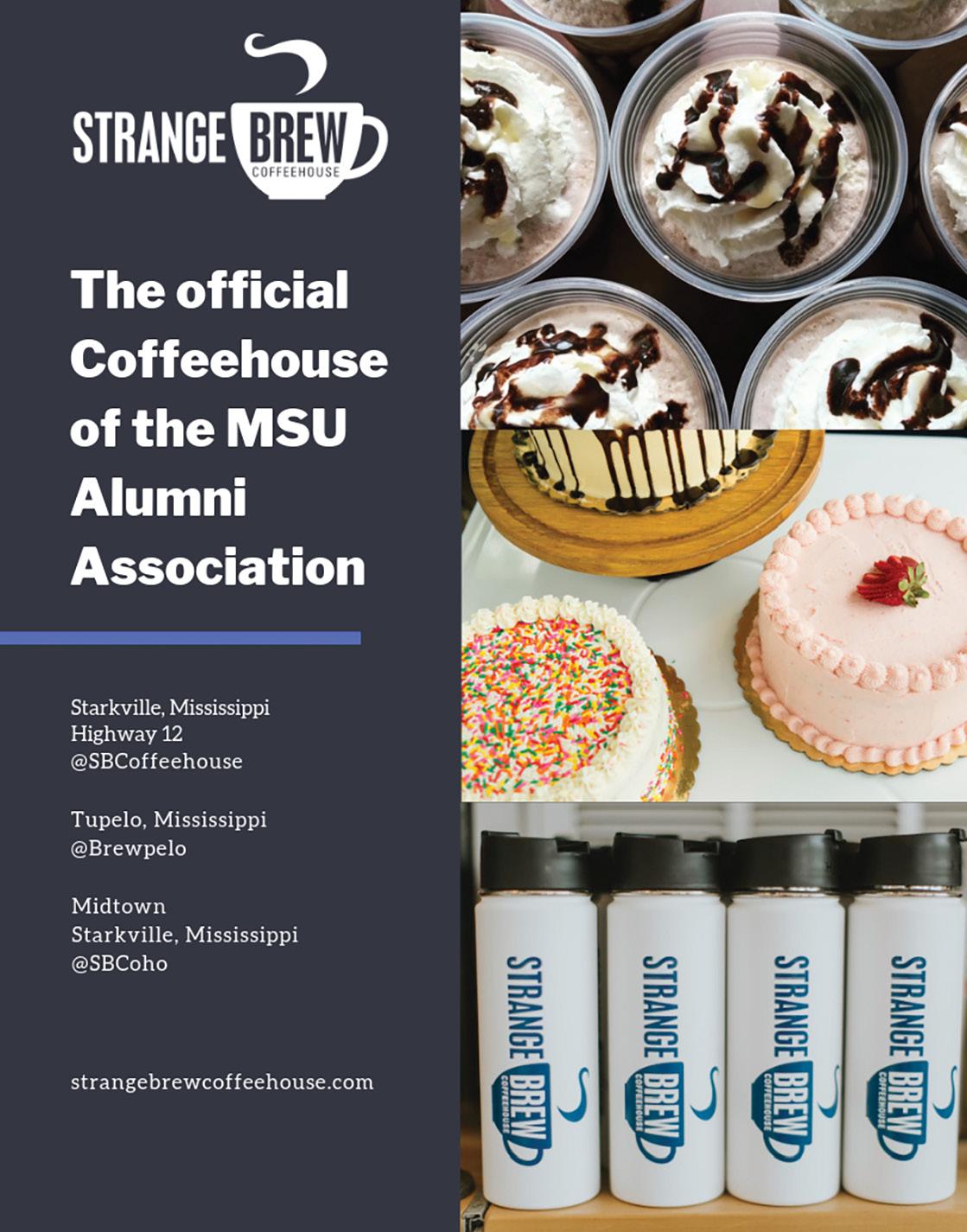









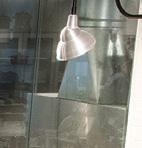














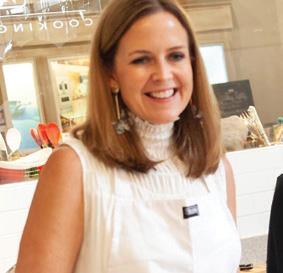
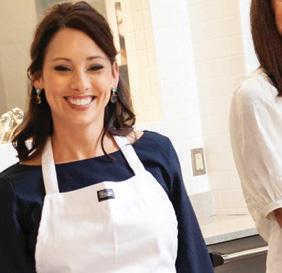












ALUMNUS.MSSTATE.EDU 67
AS AN ALUMNUS, YOU CAN MAKE A DIFFERENCE
With your participation, future classes of Bulldogs can be impacted. Through the Alumni Recruitment Network, you have the opportunity to share your MSU experiences and passion with the next generation of Mississippi State University Bulldogs.
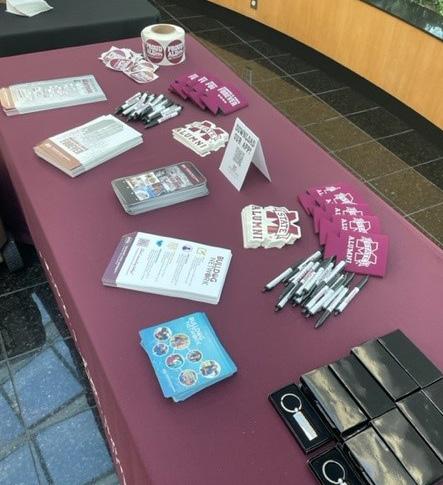

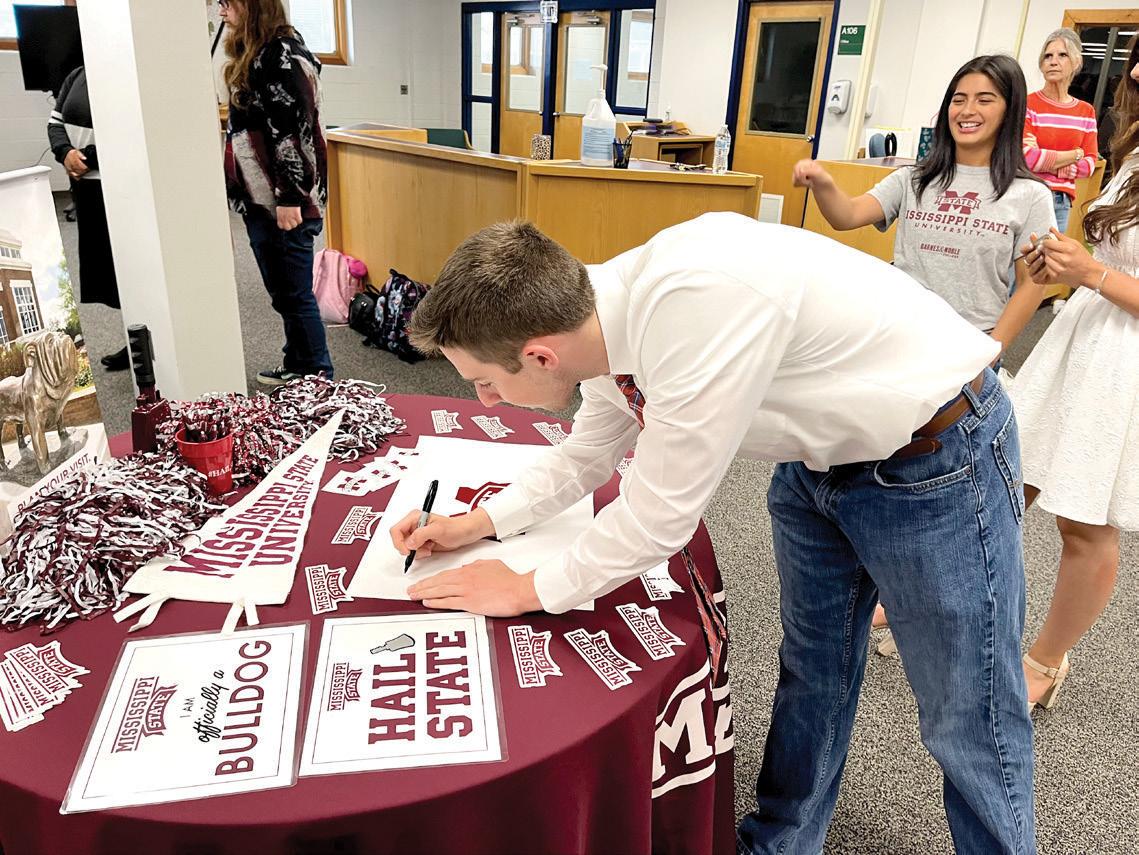


HOW WOULD YOU LIKE TO GET INVOLVED?
MAROON MAIL WRITERS
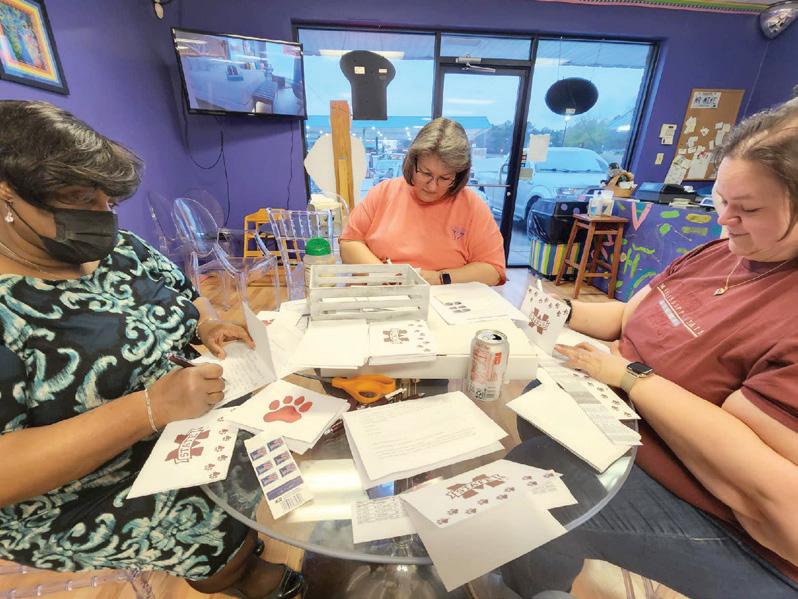
BULLY'S COLLEGE FAIR CREW
HAIL STATE EVENT REPS & SPEAKER AT AN EVENT
LEGACY RECEPTIONS
The MSU Alumni Association celebrated Bulldog alumni and their students at Legacy Receptions during each Orientation session this summer. The receptions enabled alumni and their children to connect and reminisce with other Legacy families. Participants enjoyed food, drinks and the chance to learn about opportunities to reconnect and get involved at MSU.
68 FALL 2022
ALUMNI News
NATIONAL BOARD
The MSU Alumni Association national board of directors gathered on campus in May at the Hunter Henry Center for its spring meeting. FRONT L-R: Janelle Finley Adams, Stephanie Williford, Adrienne Morris, Jonathan Jackson, Andrea Frank, Taylor Flowers, Deborah “Lynn” Burwell, Paige Roper, Sherry Carr Smith, Stephen Woo; MIDDLE L-R: Stratton “Strat” Karatassos, Riley Nelson, Herbert “Bert” Clark, Fred Monsour, Rebecca Robichaux-Davis, William Bowlin, Jimmy McPherson, Theressia McAlpin, Dave Dickson, Bradley Garrison, Gary Blair; BACK L-R: Nathan Cummins, Jeff Davis, Patrick White.
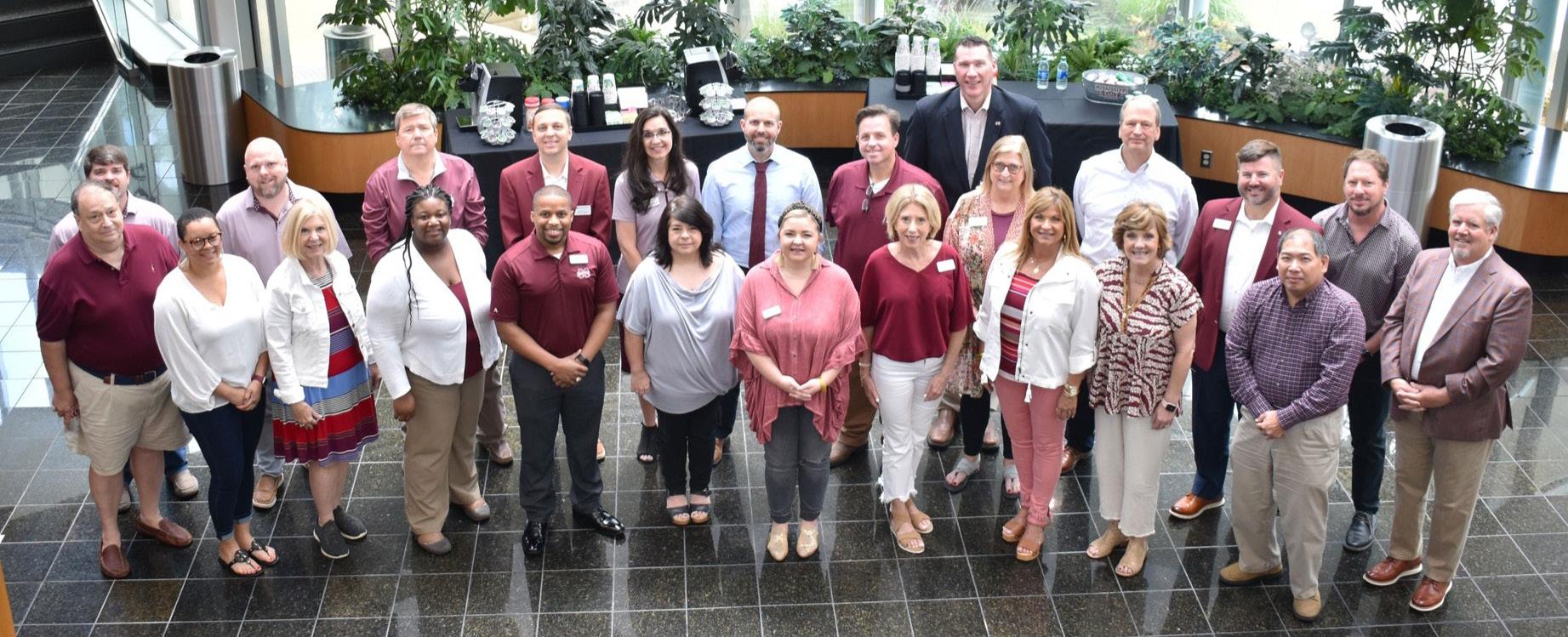
MISSISSIPPI ON THE MALL
For more than three decades, the Mississippi Society of Washington D.C. has gathered on the National Mall for its signature event that showcases the hospitality and Southern culture of the Magnolia State at the nation’s capital. The event typically brings some 600 attendees together for an afternoon of fun and food, including Mississippi farm-raised catfish, hush puppies, craft beer, wine, sweet tea, live music, yard games and more. The 32nd annual picnic event was held June 11. For more information on MSU alumni events, visit www.alumni.msstate.edu
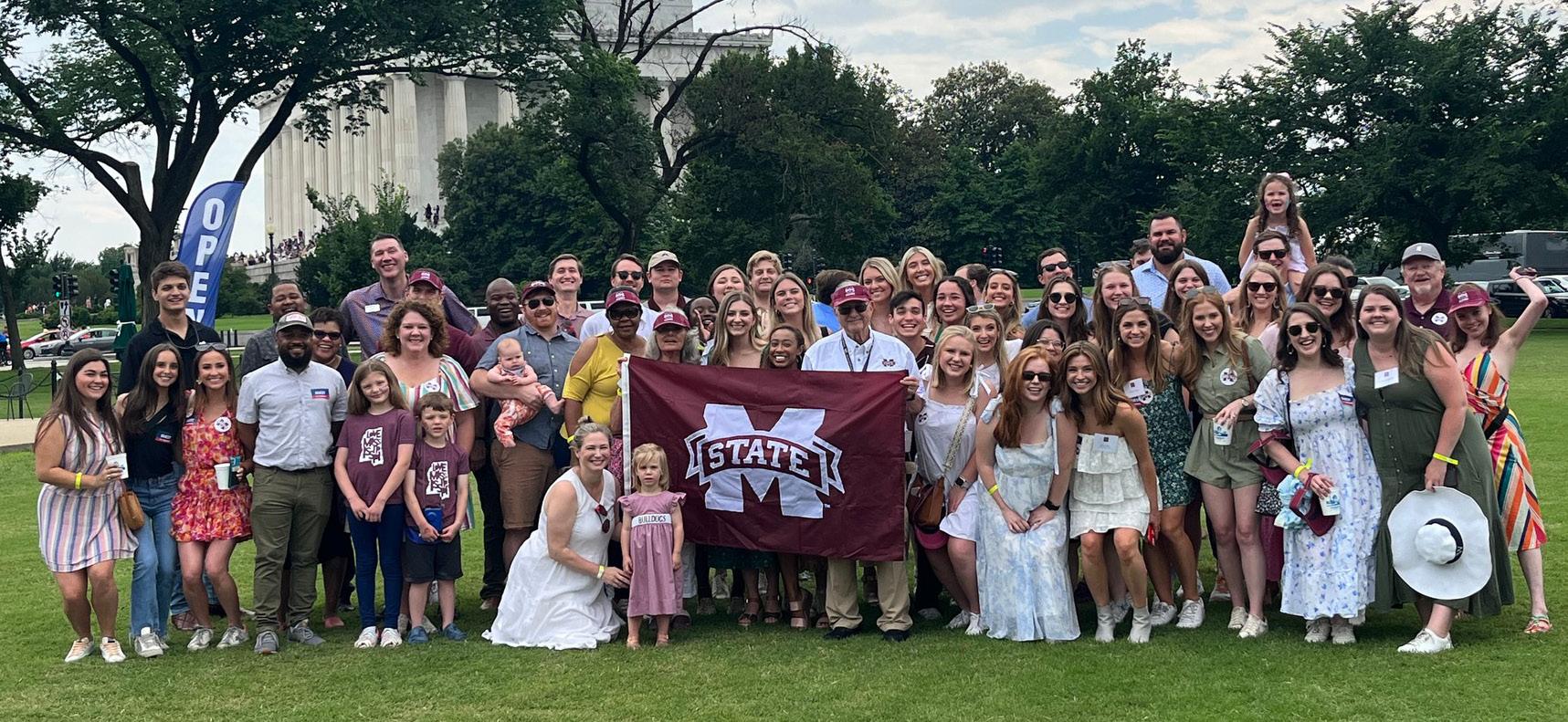
ALUMNUS.MSSTATE.EDU 69
SENIOR CELEBRATION
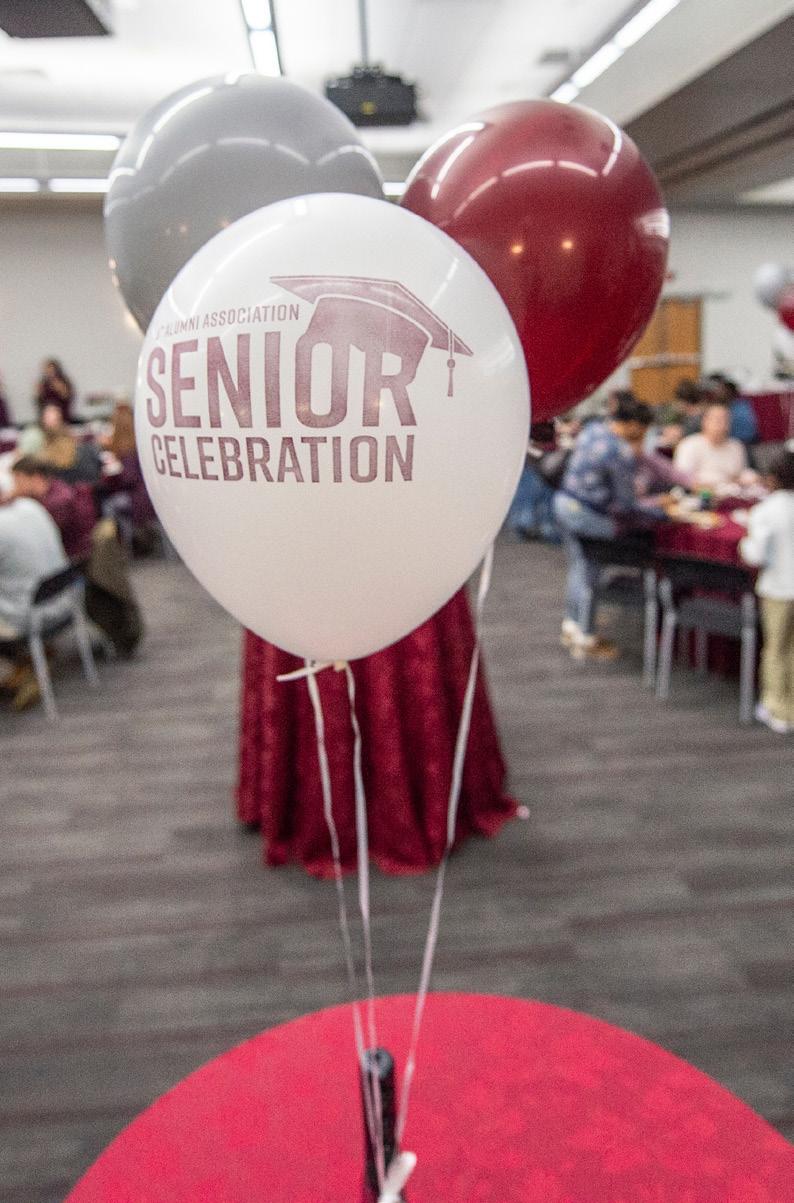

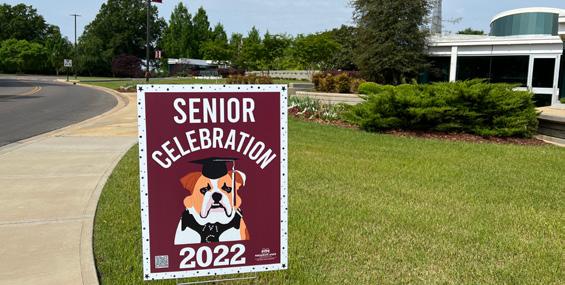
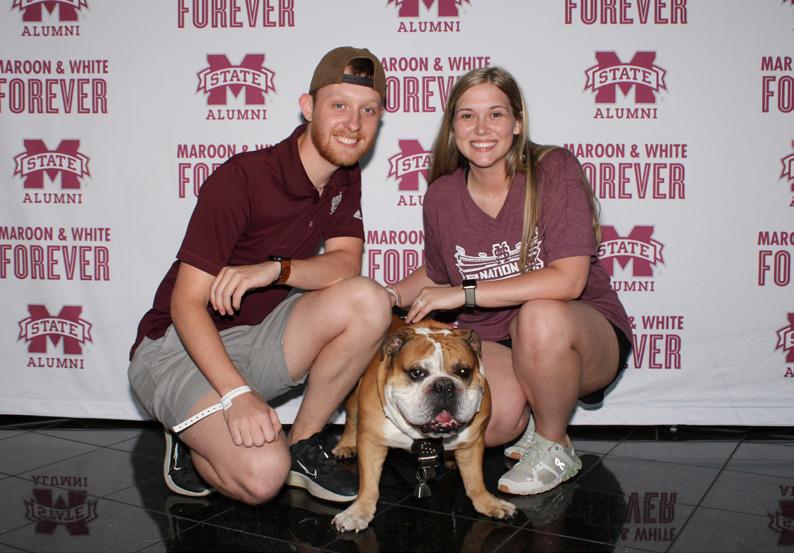
The MSU Alumni Association and the MSU Alumni Delegates annually host Senior Celebration to honor the university’s seniors as they prepare for commencement ceremonies. Over 450 seniors attended the May 2 reception at the Hunter Henry Center, where they enjoyed food, drinks and activities to mark the occasion. Participants also received gifts from the association in celebration of their accomplishments.
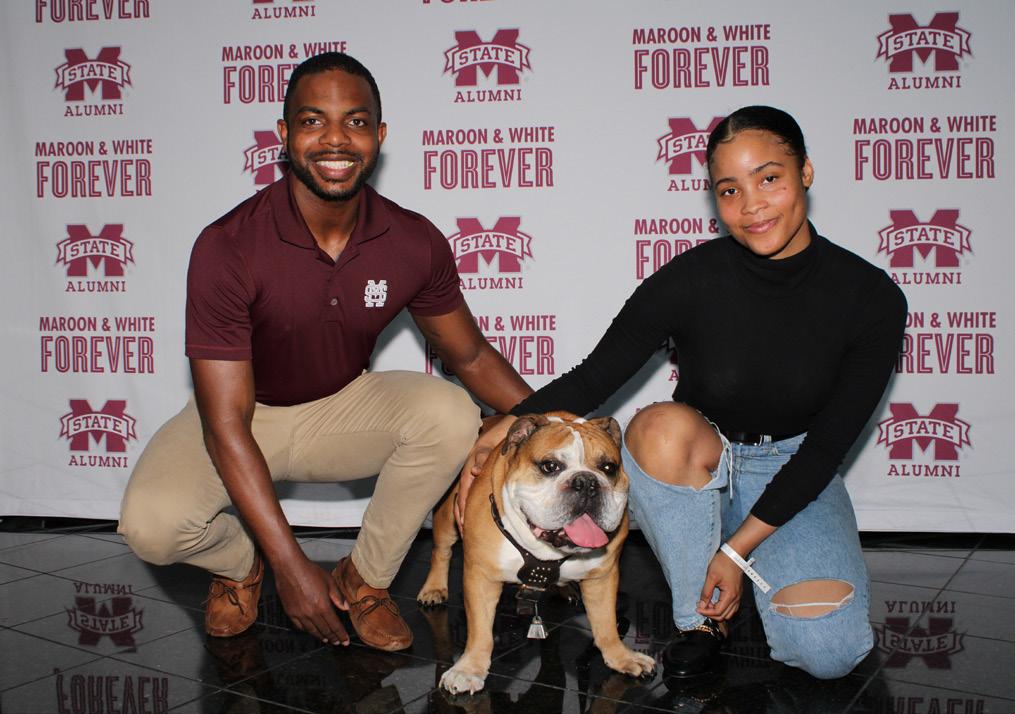
70 FALL 2022 ALUMNI News
RING CEREMONY
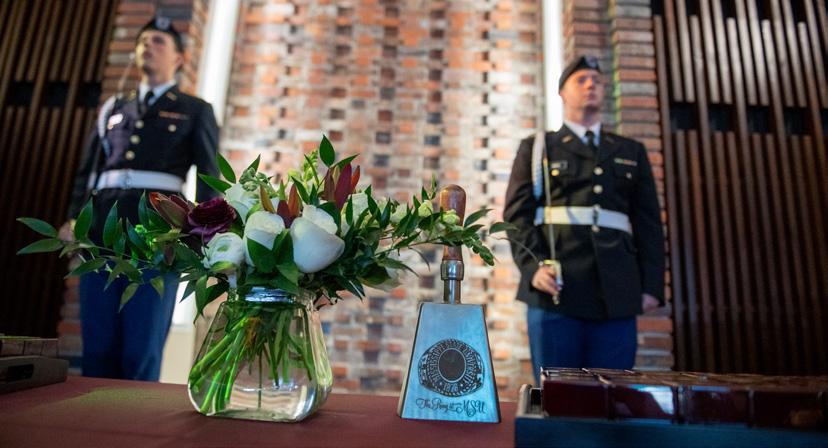
The MSU Alumni Association hosts The Ring at MSU, a time-honored tradition, for the presentation of the university’s official class rings purchased prior to each spring and fall commencement. More than 50 Bulldogs received rings, presented by MSU President Mark E. Keenum, during the spring 2022 ceremony. The event took place in May at the Chapel of Memories.
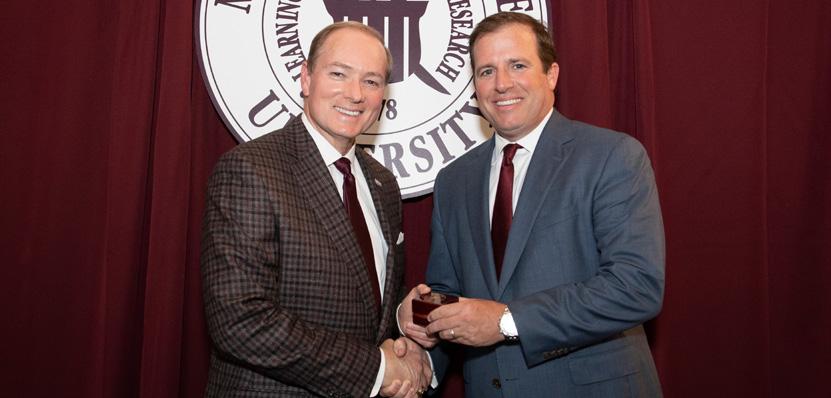
During the ceremony, state Sen. Josh Harkins of Flowood was recognized by the Alumni Association as the spring ring honoree. A fiercely loyal alumnus with the tenacious Bulldog spirit, Harkins received a special class ring for his dedication and support of his alma mater. Harkins graduated from MSU’s College of Business in 1997 with a degree in marketing and business administration. He then returned to his native Rankin County to join his family’s commercial and residential real estate, construction and development firm. In 2011, Harkins was elected to represent Mississippi’s District 20. He rose quickly in leadership and now serves as chair of the Senate finance committee. Harkins is a passionate Bulldog fan and is active with the Central Mississippi Alumni Chapter, where he was recently recognized as the chapter’s Alumnus of the Year. For more information on official MSU class rings, visit www.alumni.msstate.edu/classring
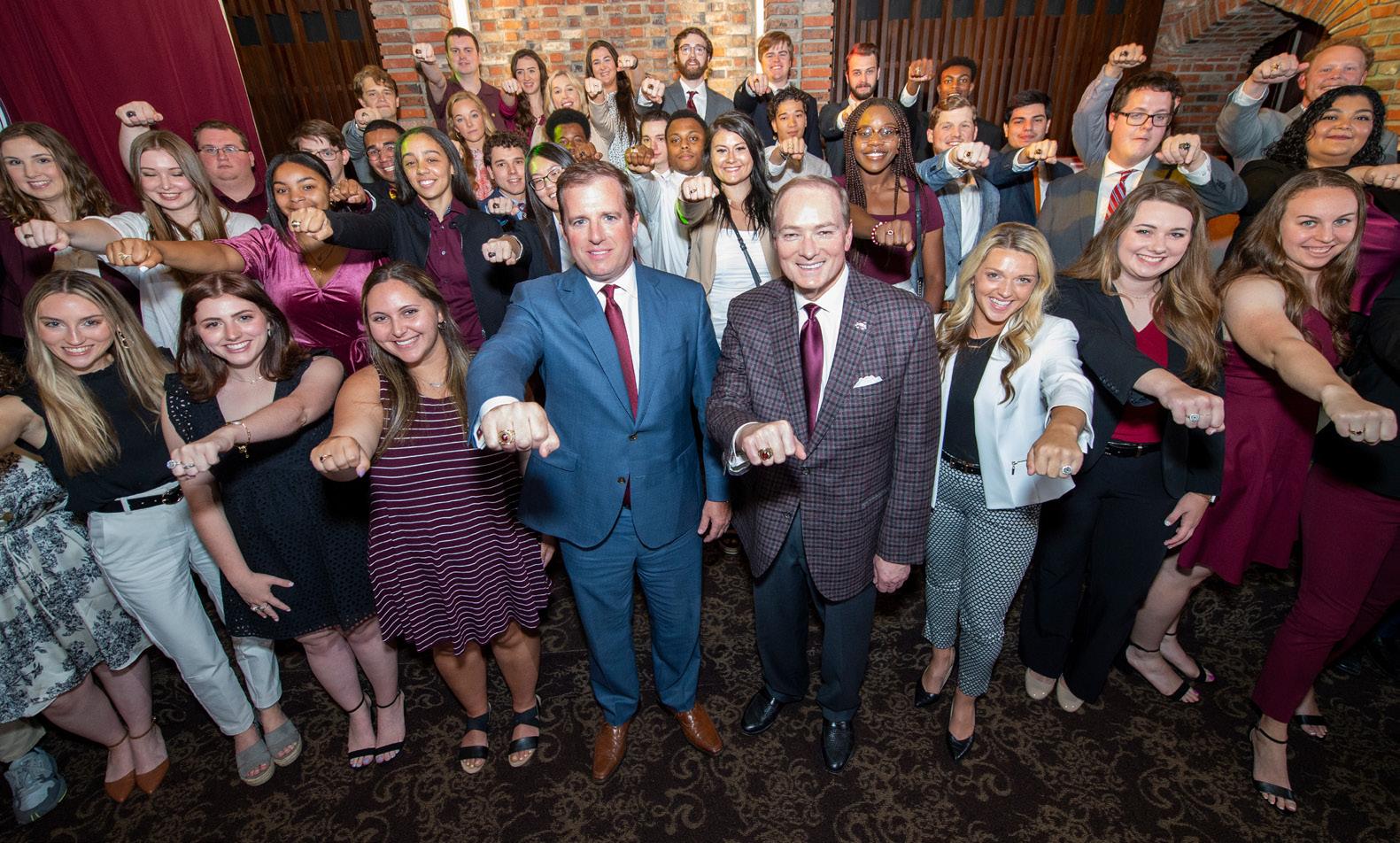
ALUMNUS.MSSTATE.EDU 71
TOP: Mississippi State President Mark E. Keenum (center right), state Sen. Josh Harkins, class of 1997, and graduating seniors show off commemorative class rings during a ceremony at the Chapel of Memories. Keenum traditionally hands out class rings to students before each semester’s commencement ceremonies.
WELCOME TO THE CITY
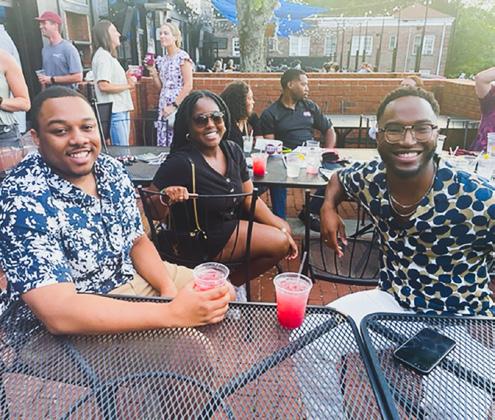
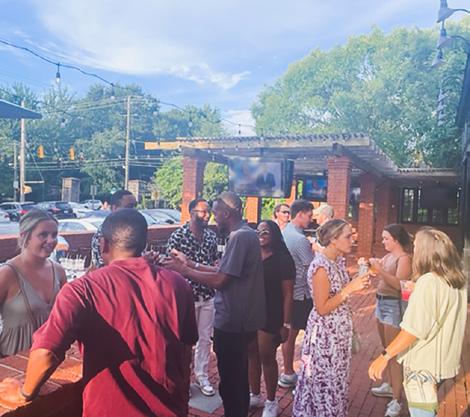
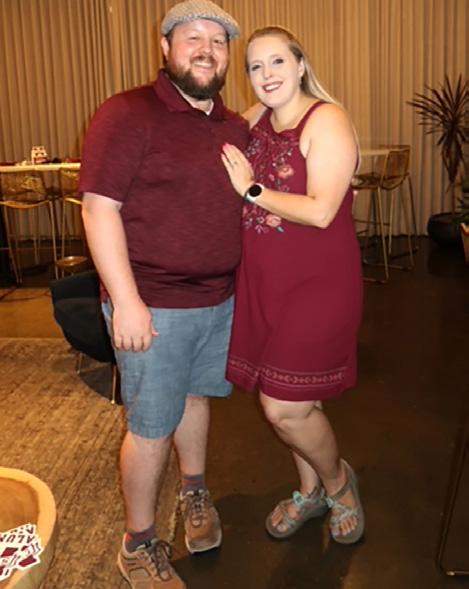
This summer, the MSU Alumni Association hosted Welcome to the City events in four locations: Washington, D.C.; Atlanta, Georgia; Houston, Texas; and Jackson. These social events welcome recent graduates into their new cities and give them the opportunity to meet other young Bulldogs living in the area. The events were well attended with 20-30 alumni per event, and participants enjoyed refreshments and fellowship with local Bulldogs. Watch for upcoming alumni events nationwide at www.alumni.msstate.edu/events or follow @msstatealumni on social media.
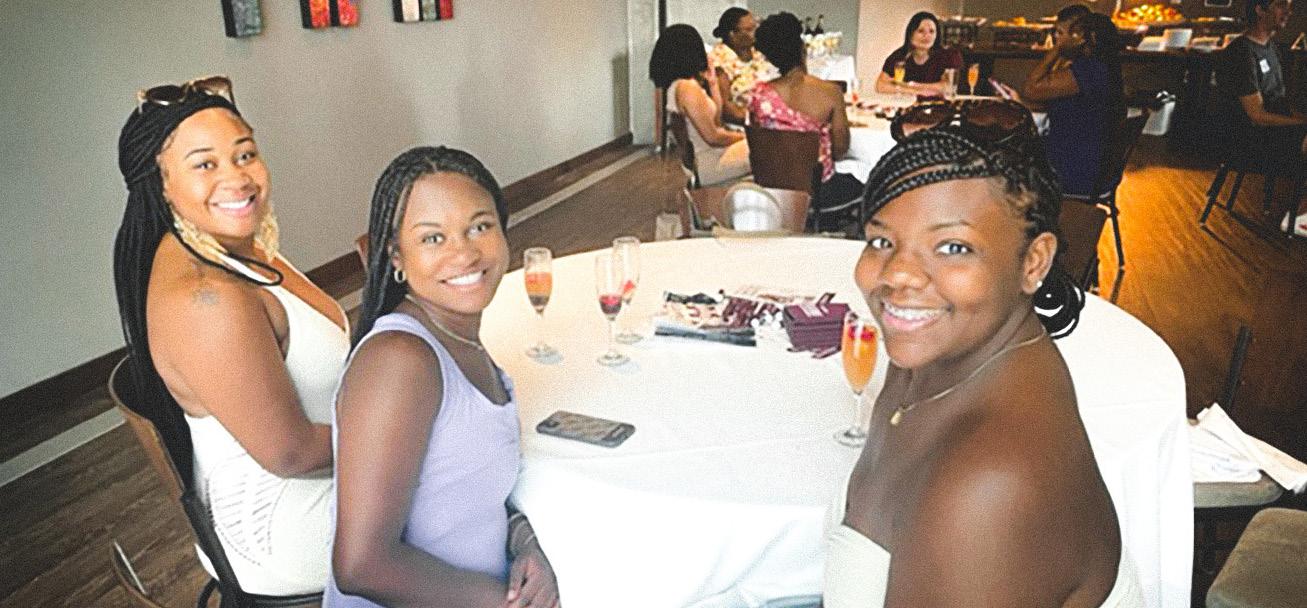


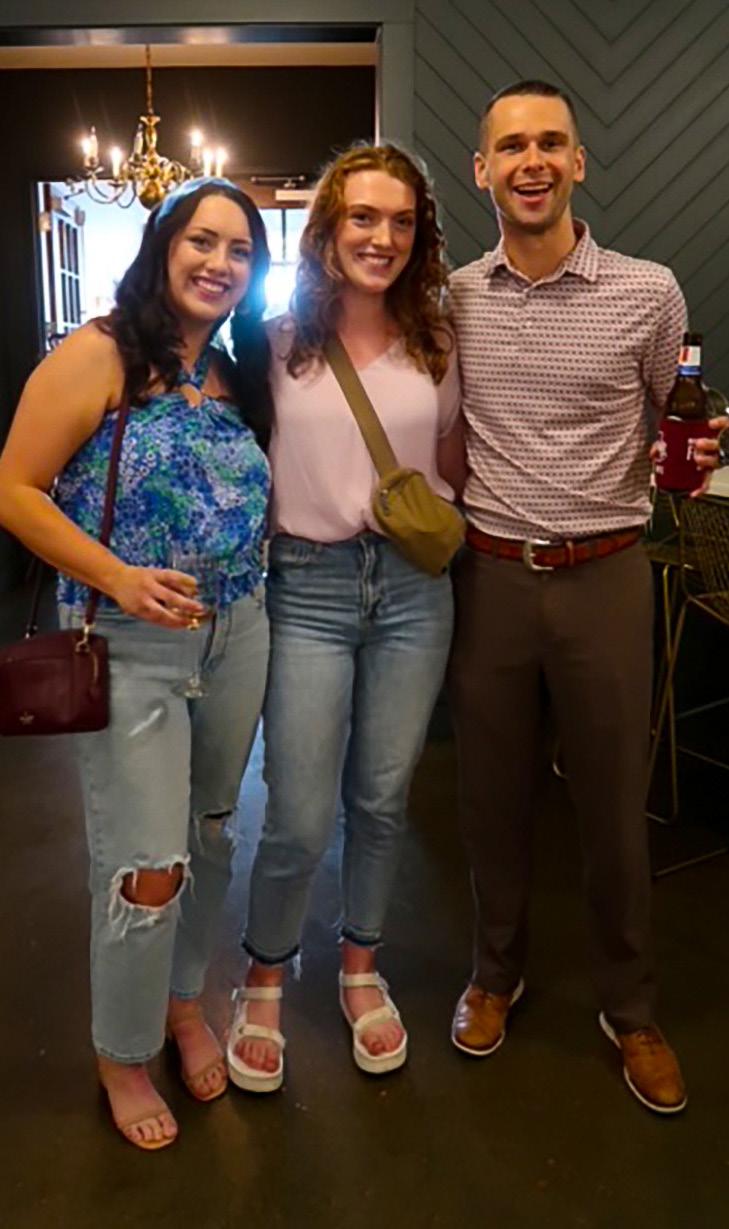
72 FALL 2022 ALUMNI News

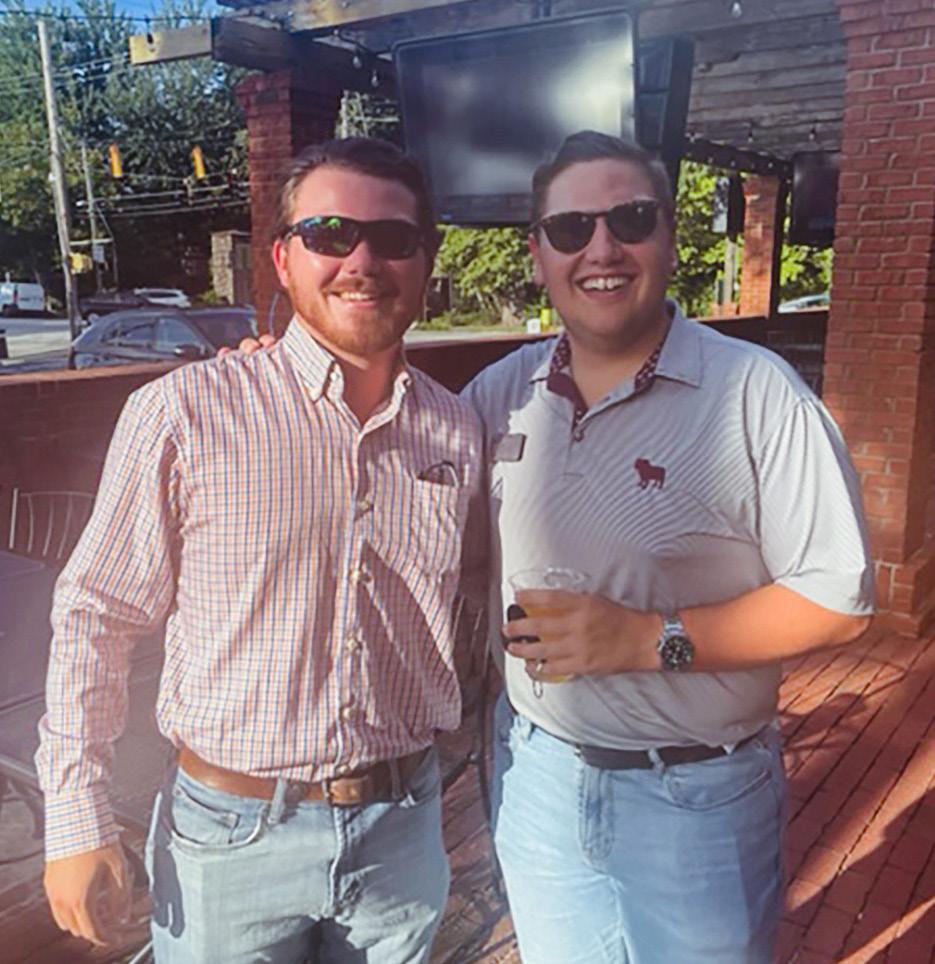
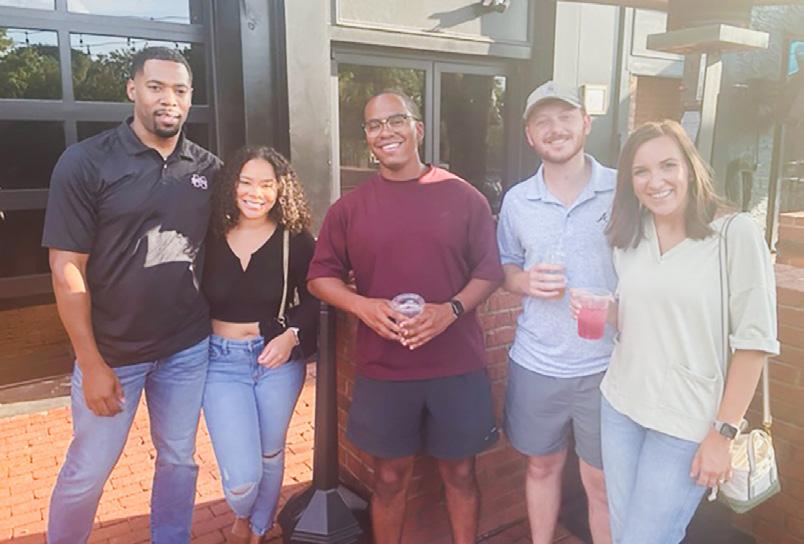
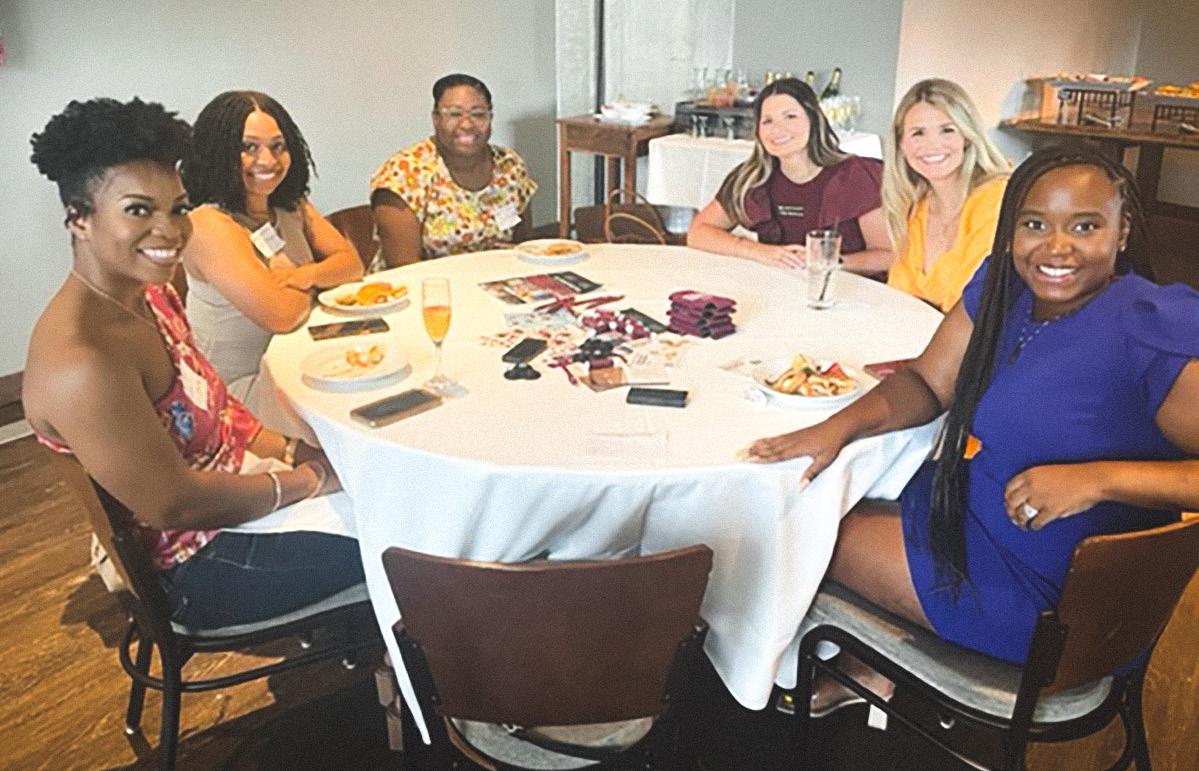

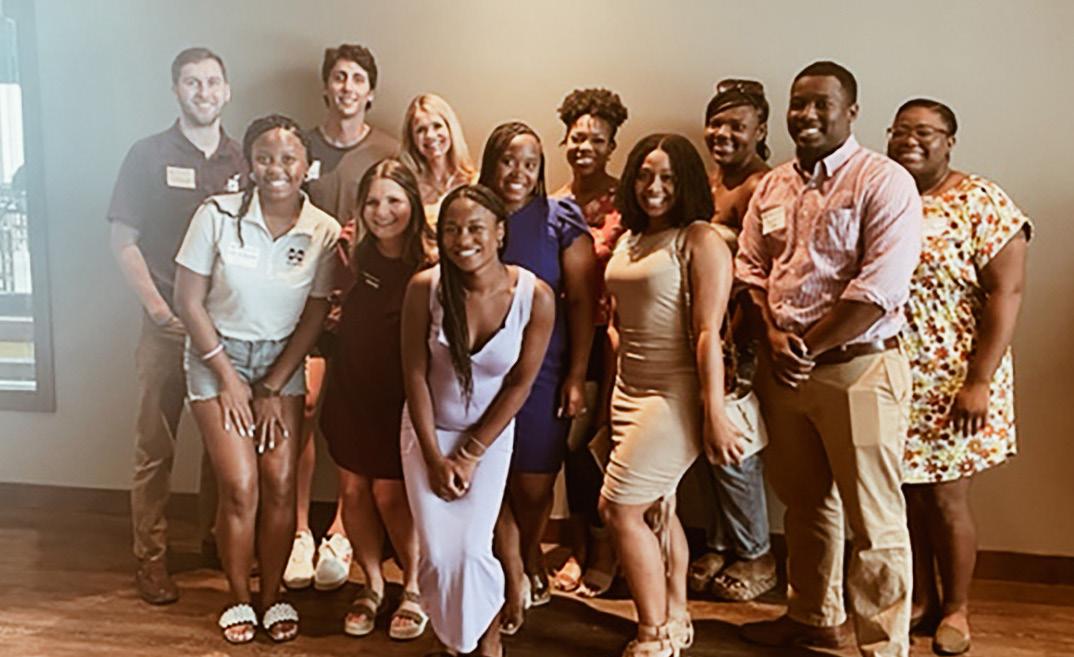
ALUMNUS.MSSTATE.EDU 73
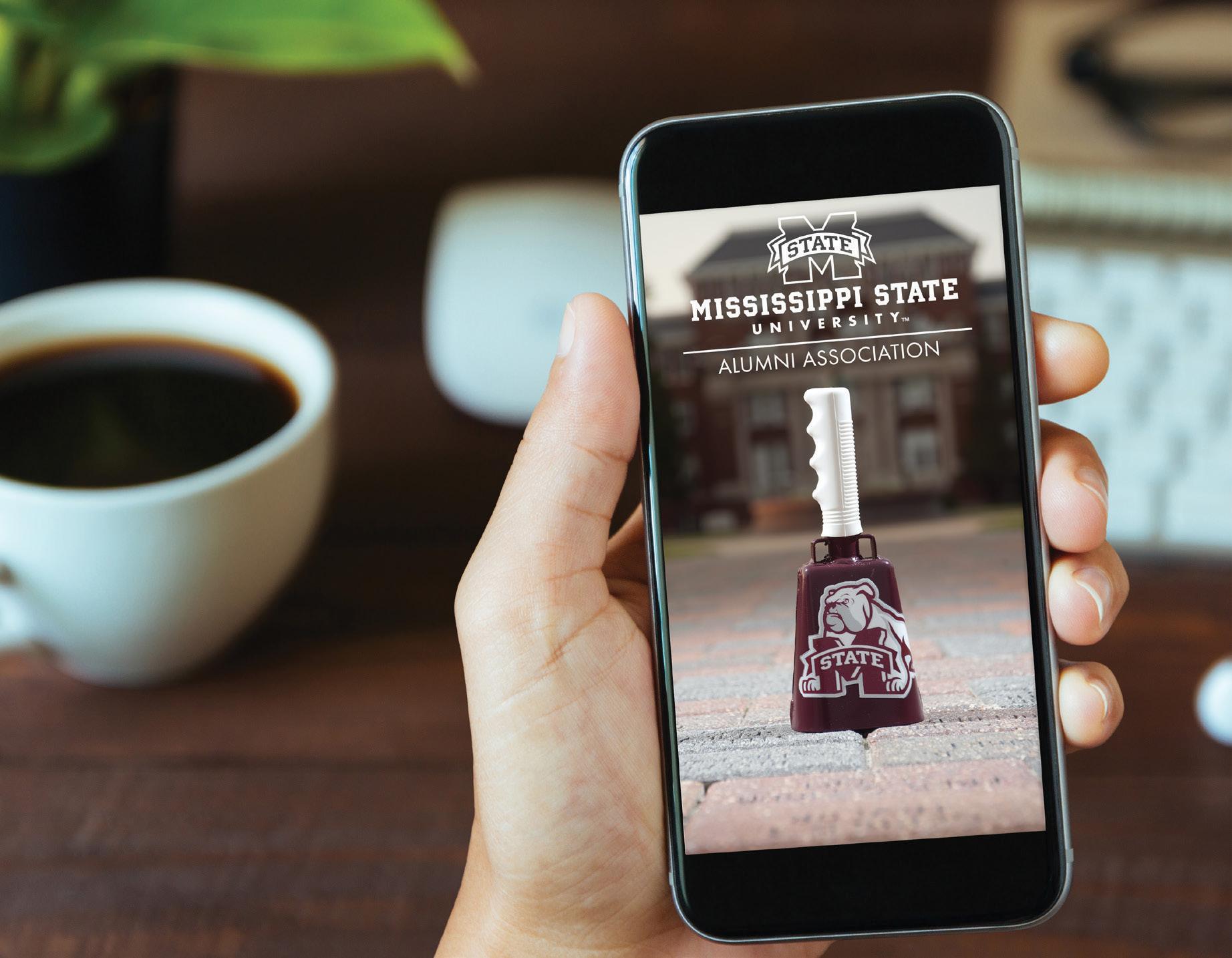


74 FALL 2022 Get exclusive discounts at participating businesses Find your alumni chapter or club and catch up on alumni and MSU news Stay connected and share your #HailStateAlumni experience Make your impact and donate to Mississippi State University ONE APP: ENDLESS CONNECTIONS DOWNLOAD TODAY! Get the official MSU Alumni Association app to connect with Bulldogs everywhere! Shop balfour4me.com/msu We’re bringing the to you. TR A DIT ION
BIG DATA, BIG OPPORTUNITY Endowment supports technological innovation at MSU

 By Addie Mayfield, Photos by Logan Kirkland and Submitted
By Addie Mayfield, Photos by Logan Kirkland and Submitted
Fueled by the abundance of information collected daily about everything and everyone, data science is helping to make the fast-paced economy and systems of today’s world smarter and more efficient. The research potential stemming from this rapidly growing supply of information, combined with advanced machine learning and the expansion of computational capacity, is opening new doors for Mississippi State University to lead a revolution in data analytics and meet the growing demand for experts.
A recent commitment from MSU alumnus Lamar McKay is significantly strengthening Mississippi State’s
position as a leader in the field through endowmentlevel support for the McKay Predictive Analytics and Technology Integration Laboratory, which will further enhance the James Worth Bagley College of Engineering’s capabilities in this growing field.
Created to support faculty, students, research and programs, the gift will facilitate advanced understandings and applications of data analytics. More specifically, the McKay Predictive Analytics and Technology Integration Laboratory Excellence Endowment will ensure ongoing support benefiting infrastructure, personnel, travel funds and other
ALUMNUS.MSSTATE.EDU 75 GIVING Back
GIVING Back
"Mississippi State University is a leader in turning data into knowledge and then using that knowledge to make intelligent decisions that can positively affect a wide range of fields such as advanced manufacturing, autonomous mobility systems, health care, cybersecurity, precision agriculture and so much more."
~ President Keenum
resources necessary to sustain and grow efforts of the Predictive Analytics and Technology Integration Laboratory (PATENT) at MSU.
“This contribution is pivotal to the expansion of predictive analytics research and its technology integration in the state of Mississippi, and I cannot express my gratitude enough for this very generous gift,” said Shahram Rahimi, MSU professor and head of the Department of Computer Science and Engineering. “I have no doubt that his contribution will boost the speed of discovery and technology development in the area of predictive analytics across the nation.”
PATENT, housed in the Bagley College’s Department of Computer Science and Engineering, accelerates advances in a number of interdisciplinary fields by addressing the challenges of data management, data integration, data analytics and predictive modeling and simulation to realize the full potential of big data. By integrating various technologies and data sources, including artificial intelligence and machine learning, PATENT will contribute to developing next generation solutions that are data driven, resilient and robust in both real-world and
theoretical domains across these diverse industrial sectors.
“Mississippi State University is a leader in turning data into knowledge and then using that knowledge to make intelligent decisions that can positively affect a wide range of fields such as advanced manufacturing, autonomous mobility systems, health care, cybersecurity, precision agriculture and so much more,” said MSU President Mark E. Keenum. “Mr. McKay’s vision and generosity will support our students and faculty and significantly enhance their work to broaden and expand the economic and societal impact of predictive analytics and technology integration. We are grateful for his investment in them.”
McKay spent 40 years in progressive leadership roles in the oil industry, ultimately serving as deputy chief executive of BP PLC before retiring in 2020. He became involved in data analytics and technology integration at the corporate level during the latter part of his career, which sparked his passion for the emergent field and how it relates to the business world.
“The cost of sensing and measurement technologies has gone down tremendously,
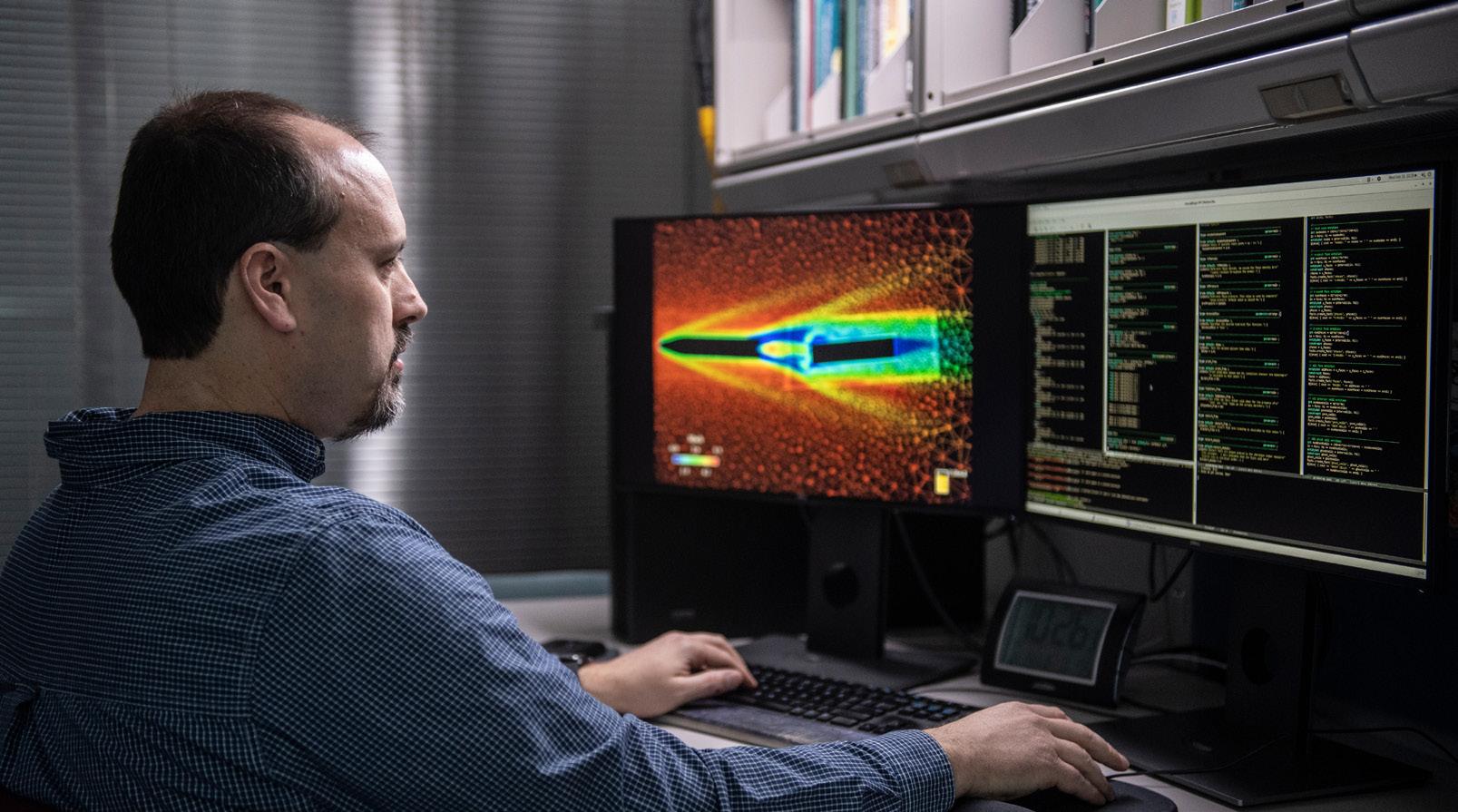

making it easier to create data. But the massive amounts of information collected all around us each day make it harder to use the data sensibly,” McKay said. “Most companies use only a tiny fraction of the data that’s available to make intelligent decisions about what their businesses or processes are doing.”
He continued, “There has been an explosion in terms of production around technology and artificial intelligence that’s allowing us to put a layer of intelligence on top of the data collected to understand better how to improve things. When I became involved in the application of these technologies at BP, I saw the potential in what we were trying to do to strategically change and optimize the business and became really interested in the concept.”
McKay’s support for PATENT reflects his passion and will enhance opportunities for MSU faculty and students to engage in related research that positively impacts science, industry and society. It also reinforces the Bagley College of Engineering’s reputation as a leader in purpose-driven innovation for the real world.
“The Bagley College of Engineering has traditionally been at the front end of tackling complex, multidisciplinary problems since its inception," said Jason Keith, dean and Earnest W. and Mary Ann Deavenport Jr. Endowed Chair. "The formation of the McKay Predictive Analytics and Technology Integration Laboratory endowment and its emphasis on using the modern tools of artificial intelligence and machine learning will ensure that our faculty maintain that competitiveness for years to come.”
Although PATENT is housed in the Department of Computer Science and Engineering, the innovative lab facilitates research and educational initiatives that span multiple disciplines and departments. As a result, McKay’s gift will further enhance the program’s prominence as a universitywide hub aimed at attracting ambitious faculty and students, producing graduates who are fluent in data-driven inquiry and affecting greater collective outcomes.
“The fundamental purpose of this program is to bring people, processes and learning together to do something better," McKay said. "Whether filtering and integrating data to optimize processes at the individual level or for multidisciplinary purposes, the intention is to incorporate disciplines across campus for pooled expertise and perspectives.”
A native of Jackson, McKay graduated from MSU with a degree in petroleum engineering in 1980 and went to work for Amoco Production Company. Throughout his career, he assumed progressive operational and commercial roles that enabled him to lead the organization’s ventures in the United States and abroad. After working on the BPAmoco merger, McKay was named chairman and president of BP America Inc. and also served as chief executive of BP’s global upstream business.
“Mississippi State provided me a very practical and common-sense based degree and methodology that set me up well for my career,” McKay said. “It was an education broader than just purely engineering, which greatly benefited me, and I am proud to be able to pay back that experience to some degree.”

In addition to his most recent commitment, McKay and his wife Nancy have also invested in other areas at MSU. In 2012, the Houston, Texas, couple established the Lamar McKay Endowed Scholarship in the Bagley College and later created the McKay Petroleum Engineering Laboratory fund to assist with the purchase and maintenance of lab equipment. McKay said he hopes his commitment for the McKay PATENT endowment will inspire support from corporate players.
“Mississippi State has all the ingredients to be a leader in these types of new areas,” McKay said. “Additional support will contribute to a strong base of expertise to propel future developments.”
For more information on supporting strategic opportunities in predictive analytics, digital transformation and data science at MSU, contact Bennett Evans, senior director of development for the Bagley College of Engineering, at 662.325.0386 or bevans@ foundation.msstate.edu

"The Bagley College of Engineering has traditionally been at the front end of tackling complex, multidisciplinary problems since its inception. The formation of the McKay Predictive Analytics and Technology Integration Laboratory endowment and its emphasis on using the modern tools of artificial intelligence and machine learning will ensure that our faculty maintain that competitiveness for years to come."
~ Jason Keith
ALUMNUS.MSSTATE.EDU 77
Lamar and Nancy McKay
CARL FAMILY REMEMBERS SON WITH GIFT TO MSU ATHLETICS
By Ashleigh Lee, Photos by Megan Bean
Agift to Mississippi State University Athletics from the Fred and Margaret Carl Foundation memorializes MSU alumnus Christopher Leflore Carl, who died March 13, 2021.
The gift, which supports Bulldog athletics, also renames gate G1 of Davis Wade Stadium in honor of the late alumnus.
A private unveiling of the Chris Leflore Carl gate was held at the football stadium last fall. A banner bearing Carl’s name is also being added to MSU baseball’s Dudy Noble Field at Polk-DeMent Stadium.

78 FALL 2022 GIVING Back
“Chris was a true Bulldog in every sense of the word. During his life’s journey, Chris positively impacted many people’s lives. He made a difference in this world and was loved by his family and his Mississippi State family. Chris’s legacy will live on for generations at Davis Wade and Dudy Noble with these markers."
- PRESIDENT KEENUM
A resident of Miramar Beach, Florida, Carl received a Bachelor of Business Administration in 1999 and an MBA in 2000, both from MSU’s College of Business. Along with other business interests, he was a co-owner of Dawg House Storage in Starkville and loved supporting the Bulldogs.
“Chris was a true Bulldog in every sense of the word,” said MSU President Mark E. Keenum. “During his life’s journey, Chris positively impacted many people’s lives. He made a difference in this world and was loved by his family and his Mississippi State family. Chris’s legacy will live on for generations at Davis Wade and Dudy Noble with these markers.”
Carl shared a love for MSU with his parents Fred and Margaret Carl of Greenwood, who have been loyal Bulldog Club members for more than 24 years. Fred, founder of Mississippi-based companies Viking Range Corp. and C3 Design Inc., received an honorary Doctor of Science from MSU in 2009. He currently serves on the School of Architecture advisory board, was named the College of Architecture, Art and Design’s Alumnus of the Year in 2015 and previously served on the MSU Foundation board. In 2003, he made a generous commitment to the CAAD community design center, which was subsequently named the Fred Carl Jr. Small Town Center in honor of his support.
The couple’s recent gift from the Fred and Margaret Carl Foundation will benefit Bulldog student-athletes, coaches and fans through the ongoing “Today. Tomorrow. Forever.” initiative for athletics facilities. It
also serves as a way to carry on the legacy of their late son.
“Chris Carl spent a lifetime passionately supporting the Mississippi State Bulldogs,” said MSU Athletics Director John Cohen. “For decades, the Carl family has been so instrumental and generous to MSU academic and athletic programs that it is truly fitting that Chris Carl’s name should now live on at Davis Wade Stadium and Dudy Noble Field. When family, friends or fans visit one of these facilities, there will now be a part of Chris and his indomitable spirit right there with them.”
For nearly 50 years, the Bulldog Club has provided resources like scholarships, academic support, room and board, books, life skills, and career development to help student-athletes to excel inside and outside the classroom.
For more information on ways to support the Bulldog Club or to learn about naming opportunities available through MSU Athletics, contact Alvin Franklin, associate athletic director for development, at 662.325.1244 or afranklin@foundation. msstate.edu

“Chris Carl spent a lifetime passionately supporting the Mississippi State Bulldogs. For decades, the Carl family has been so instrumental and generous to MSU academic and athletic programs that it is truly fitting that Chris Carl’s name should now live on at Davis Wade Stadium and Dudy Noble Field. When family, friends or fans visit one of these facilities, there will now be a part of Chris and his indomitable spirit right there with them.”
- JOHN COHEN
ALUMNUS.MSSTATE.EDU 79
MSU President Mark E. Keenum, left, and Athletics Director John Cohen, right, stand with Margaret and Fred Carl Jr. at Davis Wade Stadium gate G1, which now bears the name of the Carls’ late son, Chris.
1970s
Howard Hagwood (B.S. social studies education, ‘79) has retired after 42 years with the Meridian Public School District. His final day was June 30, 2021. He began his career teaching ninth grade Mississippi history and civics at Kate Griffin Junior High School. He was a classroom teacher for 25 years and a district administrator for 17 years, serving as principal, dean of students and director of the district’s behavioral interventions program.
1980s
Marvin Adams (B.S. nuclear engineering, ‘81) has been appointed by President Joe Biden to serve as deputy administrator for defense programs within the Department of Energy. He will oversee federal programs that ensure the safety, security and effectiveness of the U.S. nuclear weapons stockpile and help manage the $16 billion budget of the National Nuclear Security Administration. This position is one of four top jobs in the NNSA that require Senate approval. He has been the HTRI Professor of Nuclear Engineering, a Regents Fellow and director of the National Laboratories Mission Support for the Texas A&M University System.
1990s
Rob Jay (BPA accounting, ’90) has been named CEO of ScionHealth. Headquartered in Louisville, Kentucky, the health care system has 79 hospitals in 25 states. Jay previously served as executive vice president of integrated operations for LifePoint Health in Tennessee.
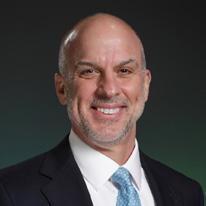
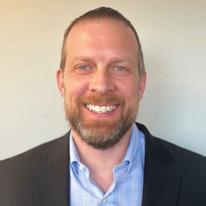

Dana Osborn Porter (Ph.D. agricultural engineering, ‘93) was elected president of the American Society of Agricultural and Biological Engineers for 2023-24. She joined the society’s board of trustees in 2022 rotating through a three-year term in which she will serve as president elect, president and past president. She is a professor and associate head of the Department of Biological and Agricultural Engineering at Texas A&M.
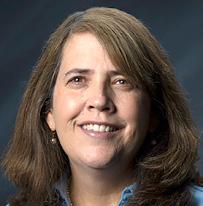
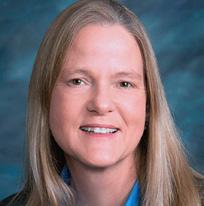
Donald Cook (B.S. psychology,’94; M.Ed. secondary education, ‘97) was named executive director of the Mississippi School for Mathematics and Science by the Mississippi State Board of Education. He will oversee all operations, function and activities of the school including long- and short-range planning, development and implementation of policies and director for financial, personnel, academic, admission and student service matters. He is a graduate of the MSMS inaugural class and began his career in education in 1996 as a teacher at Northwest Rankin Attendance Center in Brandon. Most recently he served as an instructor for Southern Union State Community College in Opelika, Alabama, and a science teacher at Newman High School in Georgia. He was department chair and associate professor of science and mathematics at Point University in West Point, Georgia from 2011-21.
Adolph Simmons Jr. (M.S. sociology, ‘94) was named deputy director of managed care business operations for the North Carolina Medicaid program within the state’s Department of Health and Human Services. He has worked for the state of North Carolina since 1994 and joined the Medicaid office in 2012.

Christine Powell (B.S. electrical engineering, ‘95) has achieved federal senior executive service status and been selected to lead NASA’s rocket propulsion test program office at the Stennis Space Center near Bay St. Louis. In this position, the 31-year NASA veteran will manage it’s chemical rocket propulsion test facilities, activities and resources across the agency. A native of Biloxi, she previously served as assistant director of the Stennis Engineering and Test Directorate.
Chris Nail (B.S. civil engineering, ’96) is now roadway design division director for the Mississippi Department of Transportation. He began as an engineer in training at the Newton Project Office before being promoted to resident engineer. He later worked as the assistant District 5 local public agencies engineer and then preconstruction engineer with the same division.
2000s
David Bradford (M.S. mechanical engineering, ‘00) is now business development manager for the Turner Construction Co. office in Memphis, Tennessee. He previously served as principal of Smith Seckman Reid Inc. and is wrapping up his first term as commissioner for District 2. He is an active member of the American Society of Heating, Refrigerating and Air Conditioning Engineers, the American Institute of Architects and the Urban Land Institute. He also serves on the boards of the local YMCA and Habitat for Humanity.
Jonathan A. Huff (B.S agricultural science, ’05; M.S. and Ph.D. agronomy, ’07, ’10) was named North American sales leader for Nouryon, a global specialty chemical company based
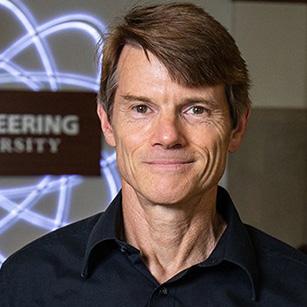
80 FALL 2022 CLASS Notes
in Amsterdam, the Netherlands. Prior to joining the company, the Forest native spent 12 years with Corteva Agriscience, formally Dow AgroSciences, serving in various capacities within the research and development and sales and marketing units.
Melanie Lewis Dickerson (B.S. political science, ’06) was recognized as a member of the Class of 2022 40 under 40 by the Denver Business Journal. She is a portfolio lead for Community Solutions, a nonprofit organization that seeks to end homelessness. Prior to joining Community Solutions in 2014, she worked for the city and county of Denver as partnerships manager for Denver’s Road Home. She is president of both the Metro Denver Homeless Initiative board of directors and Mile High Young Professionals. She is also part of the Junior League Denver board of directors.
Drew Kenna (BBA, ‘06) was elected president of Mississippi Young Bankers, a section of the Mississippi Bankers Association. He serves as president and chief operations officer of the Bank of Forest. He is also on the board of directors for the bank’s holding company, First Forest Corp. In addition to his role as president, he will serve as a trustee for the Mississippi School of Banking and on the MBA Education Foundation board.
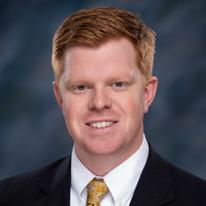
R. J. Morgan (B.A. secondary education, ‘07; M.S. school administration, ‘13) has been named a Fellow of the Overby Center for Southern Journalism and Politics at Ole Miss. He is an associate professor in the university’s School of Journalism and New Media and director of the Mississippi Scholastic Press Association. He recently launched the Integrated Marketing Communication Association, a national high school media and marketing organization. He serves on the national certification committee for the Journalism Education Association and received the Elizabeth Dickey
Distinguished Service Award from the Southern Interscholastic Press Association. He earned Master Journalism Educator status from JEA in 2020.
Mark Thomas (B.S. civil engineering, ’09) is now state safety engineer with the Mississippi Department of Transportation. He joined MDOT in 2021 as an engineer in training with the Traffic Engineering Division. He was promoted to assistant state safety engineer with the highway and rail safety division in 2019 after serving seven years as a safety engineer.
2010s

Megan Smith (MPPA public policy and administration, ‘10 ) was recognized as a 2021 Top 10 finalist for the Mississippi Business Journal’s Top 50 Under 40. She serves as director of financial aid at Delta State University and was the 2021-22 president of the Mississippi Association of Student Financial Aid Administrators.
Kathy Lester (M.S. geosciences, ‘17) was sworn in as the first female police chief of Sacramento, California. A 27-year veteran of the department, she is its 46th chief. She served in the U.S. Army prior to joining the police force, which she first served as a dispatcher before becoming an officer two years later. She was most recently the department’s deputy chief of operations but has worked in patrol, traffic, recruiting, internal affairs and criminal intelligence.
Asya Cooley (Ph.D. public policy and administration, ’18) co-authored the book “The Future of Global Competition: Ontological Security and Narratives.” She is an assistant professor of strategic communications at Oklahoma State University and was formerly a director of development for the MSU Foundation.
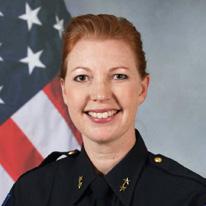
ALUMNUS.MSSTATE.EDU 81
Know a Bulldog who has news or a recent promotion? Send an email to alumnus@msstate.edu. HAVE A YOUNG BULLDOG IN YOUR LIFE? Wrap them in Maroon and White early with a Future Bulldog Certificate from the Alumni Association and enroll them into the Legacy Program. alumni.msstate.edu/ legacyprogram OR CALL US AT 662.325.7000
Not only will alumni and friends benefit from various insurance options offered by Farm Bureau, but this relationship will enhance the Association’s mission to strengthen the connection between the Bulldog Family and MSU through events, programming, and other services.



82 FALL 2022 • Serving communities for over 70 years • Located in all 82 counties of MS, across the southeastern US, and Colorado • Philanthropic supporter of MSU, Mississippi area high schools, and other institutions of higher learning
Albert Jack Garrett (B.S., M.S. chemical engineering, ’66, ’69) 79, Foley, Alabama
– He worked in the petroleum industry for many years traveling across the U.S. and to various countries, including stints living in Luxembourg and Japan. He later taught at New Caney High School in Texas. Garrett was an active member of the Shriners, Masons and 32 Degree Scottish Rite. —Jan. 15, 2022
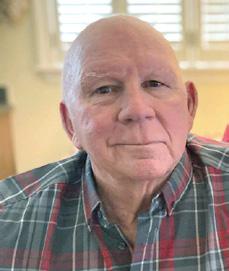
Warren Hatcher (B.S. electrical engineering, ’72) 72, Tucson, Arizona
– In addition to his MSU degree, he held a master’s from Southern Methodist University. During his 44-year engineering career at Texas Instruments and Raytheon, he worked as a design engineer, a reengineering Six Sigma practitioner and program manager for complex electronic designs. He was a member of Theta Tau Engineering Fraternity and the Institute for Electrical and Electronics Engineers. —Feb. 17, 2022
Sherry Pierce Henry (B.S. education, ’83) 71, Vicksburg – Henry taught mathematics in several Jackson County schools, as well as in community colleges on the Mississippi Gulf Coast for several years. She retired in 1999 and moved with her husband James to Vicksburg where they spent the last 23 years. —Jan. 20, 2022
Harry Thomas “Tom” McWilliams (B.S. marketing, ’78) 66, Madison – A Starkville High School graduate, he was active in Boy Scout Troop 45, earning the rank of Eagle Scout and membership in Order of the Arrow. At Mississippi State he was a member of Lambda Chi Alpha. McWilliams began his career with McRae’s Department Store before transitioning into banking in Macon and Meridian. During a 40-year career with the Mississippi Credit Union, he became a senior vice president and was selected as National Credit Union Hero of the Year in 2018.—March 11, 2022
Harry H. Puryear (B.S. chemistry, ’58) 85, Huntsville, Alabama – A member of the Sigma Phi Epsilon fraternity while at State, he earned a master’s from the Southern Baptist Theological Seminary in Kentucky and a second master’s from Florida State University. Puryear served in the U.S. Navy, advancing to the rank of commander and serving on ships in the Mediterranean,
Caribbean and Pacific Ocean. He was a member of the Alabama and Mississippi chapters of the Naval Reserve Association and served as the commanding officer of the Jackson Naval Reserve unit. He spent his career in health care administration across the Southeast. In his civic work, he was president of the Chamber of Commerce in Senatobia and worked with church-related ministries and other civic organizations like the Rotary Club.—Jan. 3, 2022
Eunice Louise Smith Speed (B.S. secretarial science, ’49) 93, Wildwood, Florida – A native of Courtland, she lived in Marianna, Florida, for most of her adult life. She received a master’s in foundations of education from Troy State University. Speed spent 35 years teaching business education at Marianna High School and was selected as the county’s Teacher of the Year for 1990. Feb. 9, 2022
James Paul “JP” Turner (B.S. education, ’61) 81, Peachtree City, Georgia – He was a class officer of both his junior and senior classes. He taught in Cobb County, Georgia, for several years following his graduation, later joining the Continental Insurance Company as a casualty insurance adjuster. His avocation was youth sports, which he coached and officiated for several decades.—Nov. 4, 2021
Sheldon Burton Webster (B.S. accounting, ’66) 77, Homewood, Alabama – A lifelong adventurer, Webster was known as “Willie Wild,” and in his life he climbed eight major mountains, traveled the seven continents, sailed the world’s oceans and visited 150 countries. He was commissioned into the U.S. Army rising to the rank of captain and stationed on the East German border during the Cold War. He served as treasurer of the National Whitetail Warrior Project Inc. whose clients are Purple Heart awardees who are taken afield. He served on the Alabama Writer’s Forum and assisted others in writing their memoirs, as he did in 2013. Author of seven books, mostly historical fiction, he anonymously donated his net royalties to the International Literacy Foundation. A CPA, he founded his own firm which later merged with Alabama’s oldest accounting firm. He also founded BKR International, an accounting and consulting affiliation in New York with offices in 80 countries and 320 cities.—April 5, 2022
Remembering Charles L. Brown
Charles L. “Charlie”
Brown (B.S. mechanical engineering, ’61) 83, Hattiesburg – A member of Kappa Alpha Order social fraternity and the Blue Key honor society while at State, he served two years as an artillery officer in the U.S. Army. He began his engineering career with Hercules and in 1972 became a sales engineer with Faulkner Concrete Pipe. He retired in 2003.
He was a registered professional engineer and a member of the Mississippi Engineering Society, which he served as state president in 1980. He was named Engineer of the Year in 1986. A passionate Bulldog, he served as MSU’s National Alumni Association president in 1979 and was an original director in the Bulldog Club when it was established in 1968. He later endowed the Charles and Katherine Brown Scholarship in Mechanical Engineering in the James Worth Bagley College of Engineering at Mississippi State. March 21, 2022
IN MEMORY OF WILLIAM BRYAN TUCKER SR.
William Bryan “Bill”
Tucker Sr. (B.S., M.S. animal and dairy sciences, ’82. ’84) 62, Holmesville
– In a shock to his community, Tucker was slain in his home during what Pike County officials call a home invasion. He was vice president of physical resources for Southwest Mississippi Community College. Tucker graduated from Parklane Academy before joining the Bulldog family. After completing two degrees at MSU, he earned a doctorate from the University of Kentucky.
Tucker began his professional career teaching dairy science at Oklahoma State University before returning to Mississippi to teach at his alma mater for eight years. He then moved back to McComb to manage the family dairy farm. For the past 12 years he had served SMCC.—Feb. 25, 2022
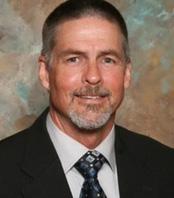
ALUMNUS.MSSTATE.EDU 83 Forever MAROON Know someone who should be remembered in Forever Maroon? Send an email to alumnus@msstate.edu.
Honoring Robert Bowen
Robert “Bob” Bowen, who posthumously received an honorary doctorate from Mississippi State in May, died April 5. He was 80.
A native of Cleveland, he earned bachelor’s degrees in political science and history from Mississippi State in 1963, when he was honored as an ROTC Distinguished Military Graduate. He served on active duty as an Army aviator, flying more than 700 combat missions in Vietnam.
Following his military service, Bowen earned an MBA from Emory and joined Arthur Anderson LLP in Atlanta, Georgia. He soon transferred to Memphis and, in 1977, was promoted to partner. For 18 years he served as partner incharge of Andersen’s midsouth audit and business advisory practice.

A devoted Bulldog, who was named the College of Arts and Sciences Alumnus of the Year in 2016, Bowen and Sheryl, his wife of 43 years, have bequeathed
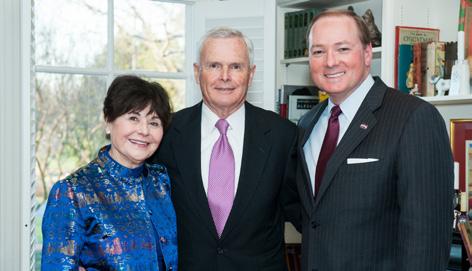

their 1,200-acre Mississippi Centennial Farm—known as Spirit Hill Farm—to Mississippi State University’s College of Forest Resources. The land will be used in undergraduate and graduate studies of quail management, wildlife research, conservation and other educational initiatives. Additionally, the couple established the Bowen Spirit Hill Farm Conservation Endowment to support and maintain the property.

In Memory of Harvey Hull
Harvey Hull, a former Mississippi State linebacker who was considered one of the best players in program history, died February 25. He was 66.
A native of Kosciusko, he earned secondteam All-America honors in 1976 and was named All-SEC in 1974, 1975 and 1976. He ended his MSU career with 454 career tackles, which still ranks second in school history, and was part of the Bulldog’s 1974 Sun Bowl victory as a freshman. He was inducted into the Mississippi State Sports Hall of Fame in 2010.
REMEMBERING ROBERT BELL
Robert Bell, a Bulldog pioneer who was one of two Mississippi State football players to break the color barrier in 1970, died March 29. He was 70.
A native of Meridian, Bell was a fan favorite at Mississippi State where his on-field appearances elicited chants of “Give ‘em hell, Robert Bell,” which he did as a defensive back for MSU. In 1970, he helped guide State to its first winning season in seven years. He earned three letters from the Bulldogs from 1970-72 and graduated in 1973 with a degree in business administration.

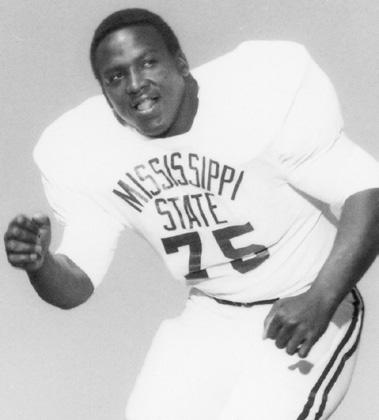
Bell was a member of the M-Club and Fellowship of Christian Athletes. In November 2017, he was honored with fellow trailblazer Frank Dowsing Jr. with the dedication of the Dowsing-Bell Plaza at the north end of Davis Wade Stadium. The space includes a plaque detailing the on- and off-field legacies of the teammates. The timing of the unveiling marked 47 years since Bell, Dowsing and the Bulldogs earned the Golden Egg in a 19-14 win over Ole Miss in one of the most memorable victories in Egg Bowl history.
In 2018, MSU’s M-Club Alumni Association created the Dowsing-Bell Award, which honors the most deserving male athlete whose determination and perseverance in overcoming obstacles academically, athletically or personally, is a testament to the tremendous character of the award’s namesakes.
Hull was selected by the Houston Oilers in the 10th round of the 1977 NFL Draft, but his professional career was cut short due to a knee injury.
Following the grueling injury and recovery, Hull returned to MSU to earn a degree in physical education in 1979 and work as an assistant coach for Mississippi State. He later served the Town of Shubuta as public works director.
Forever MAROON
84 FALL 2022



HWY. 182, OFF HICKORY GROVE ROAD, STARKVILLE Starkville: 662.765.3733 Tupelo: 662.842.3844 www.tmhomes.com Call today for details on this and other TM developments! Owner is a Miss. licensed real estate broker MAKE YOUR BEST MOVE! Lots are available now at this exciting new community, convenient to the entire Golden Triangle! New Homes Under Construction! www.tmhomes.com DEVELOPED BY
A native of North Carolina, I arrived in Starkville with my husband Guy A. Hargrove in 1970. This was the beginning of an MSU teaching career that lasted nearly four decades, even though our plan had been to stay only a few years before moving to another university. Guy died in 2016, but more than 50 years after arriving in Starkville, I am still here.

I began teaching a freshman Honors course my first semester at MSU and taught at least one Honors course every semester until my retirement in 2008, except for when I was teaching and living in Europe on four Fulbright grants.
I loved teaching those courses because I was able to introduce the students to the works of challenging writers and enrich their knowledge by taking them on field trips.
We would travel to Oxford after studying Faulkner’s “The Sound and the Fury” and to the Alabama State Theatre in Montgomery to see plays that we had studied in class. At that time, I was able to drive us to our destinations in minivans borrowed from various departments. Often my students kidded me that the most exciting part of the trip was seeing if I would hit any mailboxes on the narrow country roads. I’m pretty sure that they were only kidding, right?
For our trips to Oxford, I always enlisted Chooky Faulkner, William Faulkner’s nephew, as our tour guide. He loved telling students stories about Brother Will, as he called the author. He took us to Rowan Oak, Faulkner’s home, where the students saw Faulkner’s small shoes in his bedroom and the outline of “A Fable” on the walls of his study. He also took us to see Faulkner’s grave as well as the grave of Chooky’s father, John. My students loved seeing John’s plot: on one side of the standing gravestone, the family’s last name was displayed with the original spelling “Falkner,” on the other side it was spelled as William had, “Faulkner,” and, on the flat stone in front, it was spelled “Fa(u)lkner.” Chooky said his dad had a great sense of humor but also wanted it known that he was related to the famous novelist.
On the trips to the Alabama State Theatre, we would see one play in the afternoon, watch another that evening, spend the night in an inexpensive motel, and return to Starkville the next morning. We saw Shaw’s “St. Joan,” Ibsen’s “A Doll’s House,” Wilson’s “Fences,” Shakespeare’s “Hamlet,” and many others. Not only did they gain greater insights into the plays, but we got to know each other and established bonds that would not have happened in the classroom alone.
On their evaluations at the end of the semester, many students noted that those trips were among the most meaningful aspects of the course. They certainly were for me.
Nancy A. Hargrove, a William L. Giles Distinguished Professor of English Emerita, holds a bachelor’s from Agnes Scott College in Georgia. She earned a master’s from the University of Wisconsin and a doctoral degree from the University of South Carolina. A four-time Fulbright Fellow, she was named a Fulbright Distinguished Chair in 2005. In addition to numerous MSU teaching awards, including being named a Grisham Master Teacher, she was named Mississippi Professor of the Year in 2000. She published two books on T.S. Eliot and one on Sylvia Plath. Her husband, the late Guy Hargrove, was a professor of voice at Mississippi State.
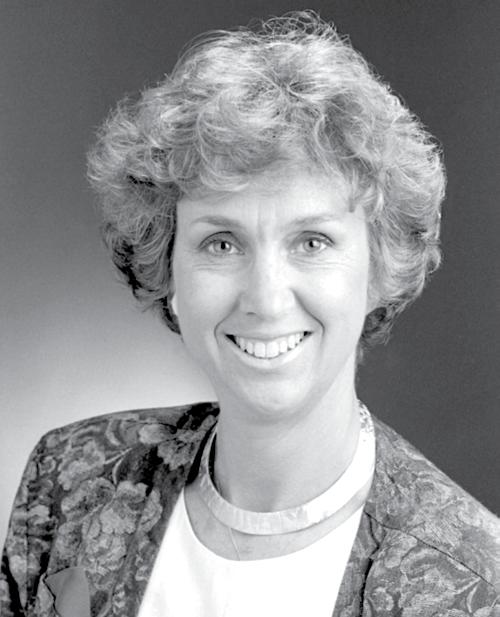
86 FALL 2022 Back STORY
WITH NANCY HARGROVE alumnus@msstate.edu Alumnus Magazine P.O. Box 5325 Mississippi State, MS 39762
This University Archives photo, believed to be from the 1980s, shows students walking outside Colvard Student Union. Equipped with inviting spaces—both indoors and out—the union has long been one of the most popular places on campus to eat, rest or hang out between classes. Share memories of your favorite campus haunts or help provide more information on the background of this photo by contacting Alumnus magazine. Please include your name, major(s) and graduation year(s) as some responses may be published in print or online.
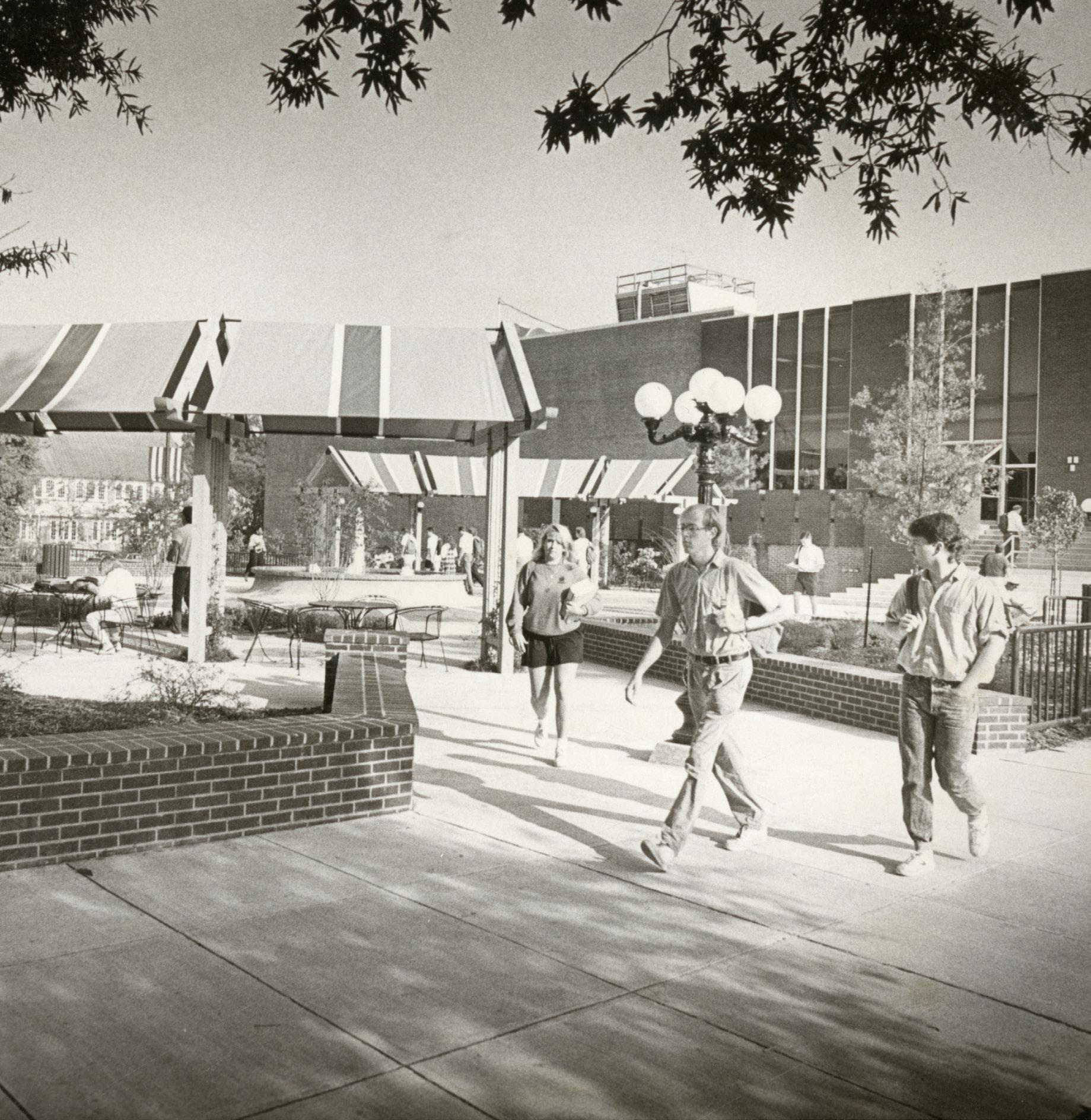
ALUMNUS.MSSTATE.EDU 87
February
Enjoy beautiful pictures of familiar campus scenes that bring back special memories of your time at Mississippi State. The official State calendar has become a Bulldog tradition. With pictures by MSU’s own award-winning photographers, it’s truly a one-of-a-kind treasure. Order online today at msufoundation.com or call 662-325-7000.
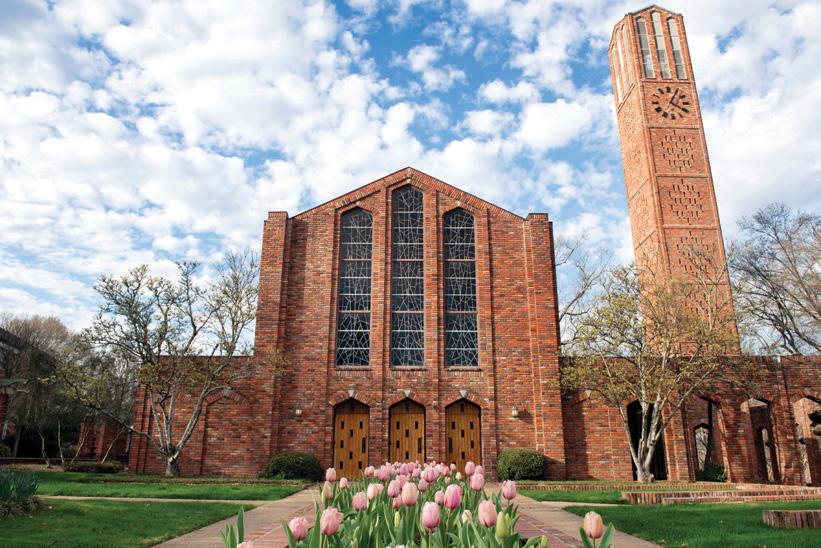
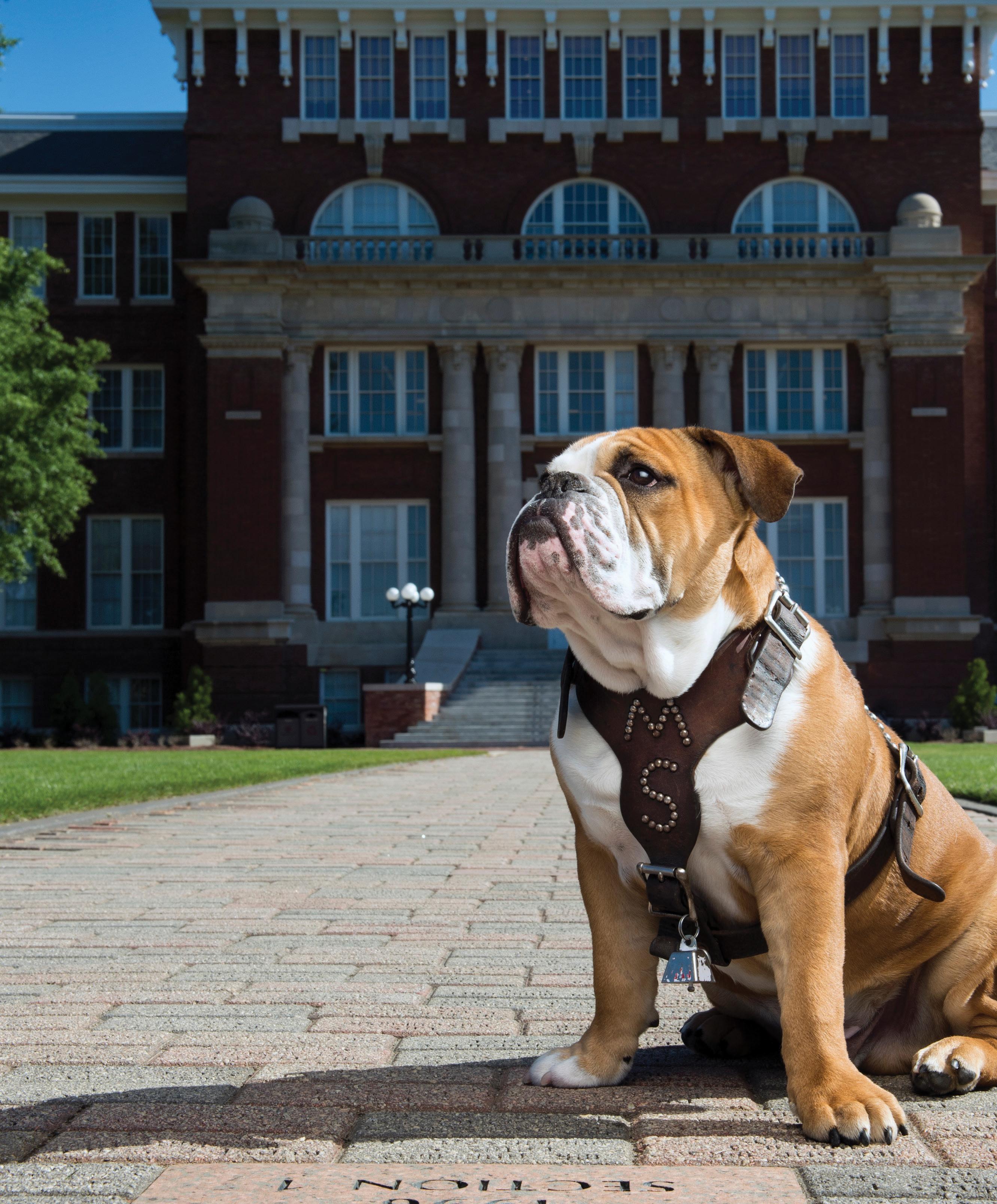
FRIDAY SATURDAY 15 29 M 23 31 18 T 12 26 20 14 28 NOTES: MARCH 2023 JANUARY 2023 3 4 26 11 18 25 10 17 24 19 M 20 14 28 W 22 2 16 30 10 24 S 11 25
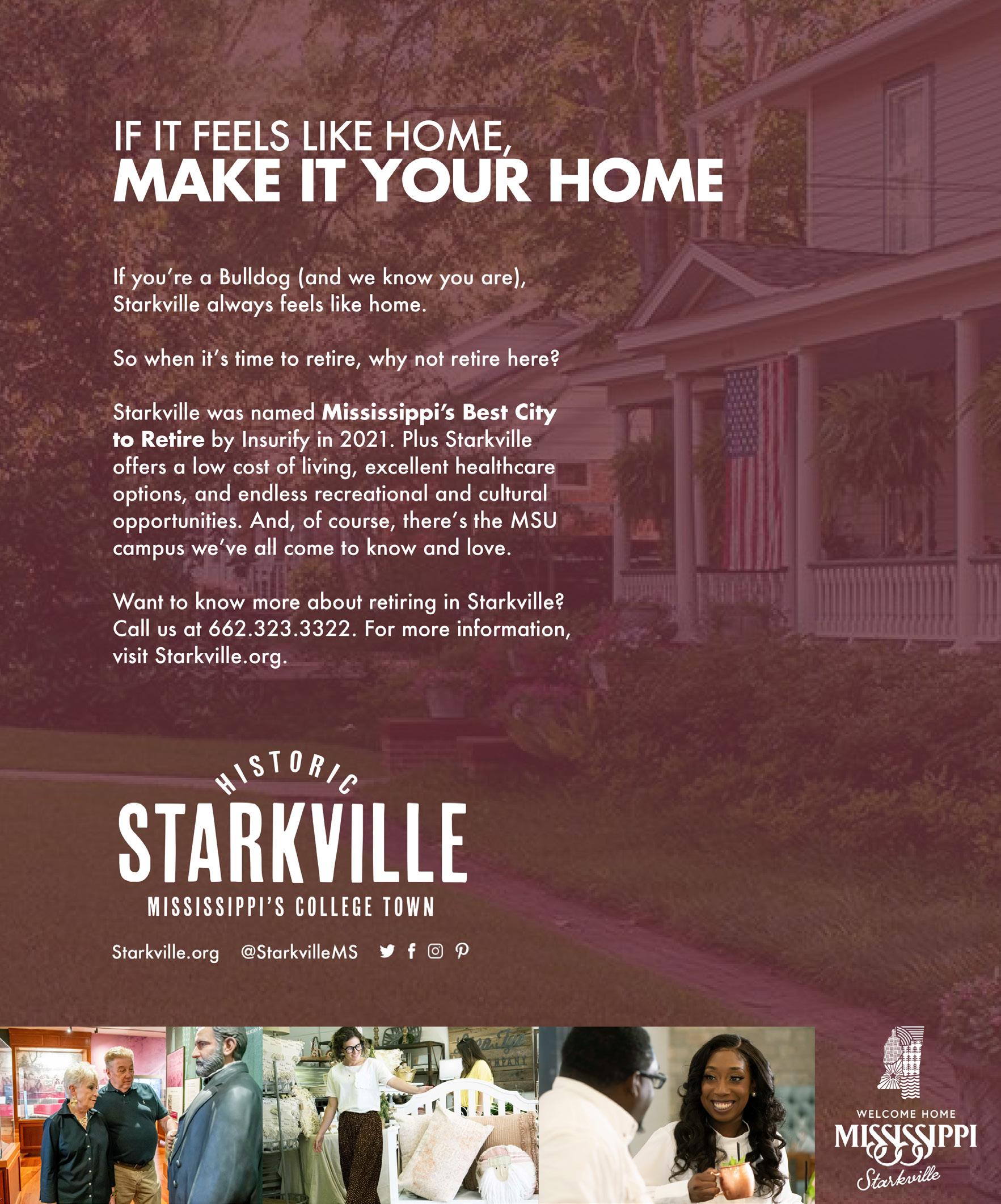

NON-PROFIT ORG US POSTAGE PAID MISSISSIPPI STATE 39762 PERMIT NO. 81 P.O. Box AA One Hunter Henry Boulevard Mississippi State, MS 39762-5526 www.alumni.msstate.edu ELECTRONIC SERVICE REQUESTED Bulldog meteorology grads serve communities, protect public safety p. 20 WEATHERING THE STORM

























 ~ Farshid Vahedifard
~ Farshid Vahedifard



































 By Carl Smith, Photos by Megan Bean
By Carl Smith, Photos by Megan Bean







 By Carl Smith, Photos by Megan Bean and Grace Cockrell
By Carl Smith, Photos by Megan Bean and Grace Cockrell








 By Grace Jones
By Grace Jones


 By Carl Smith, Photos by Grace Cockrell
By Carl Smith, Photos by Grace Cockrell




















































































































































 By Addie Mayfield, Photos by Logan Kirkland and Submitted
By Addie Mayfield, Photos by Logan Kirkland and Submitted




































